Recycling NEWS
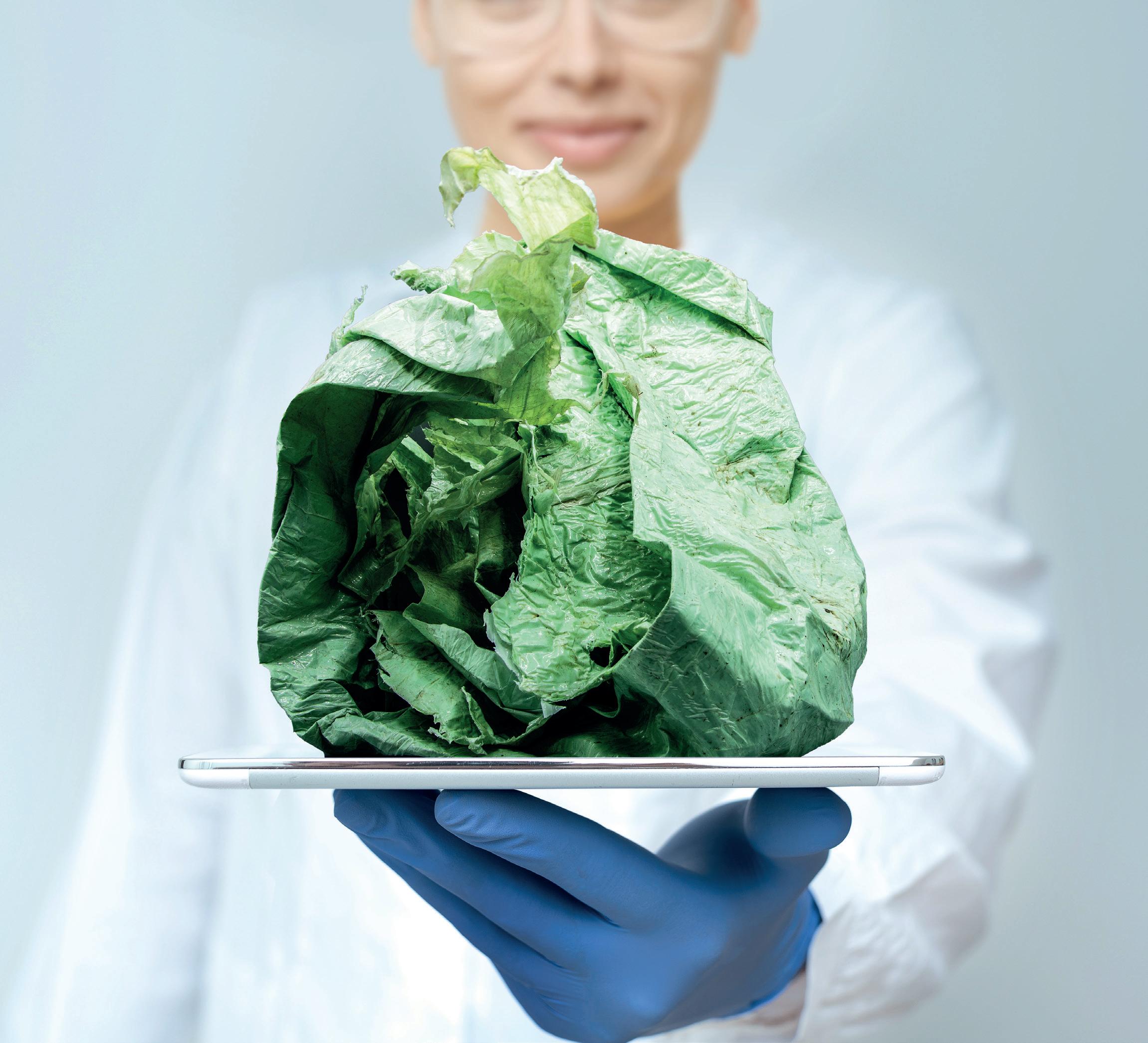
Editorial


Editorial
Dear Customers and Business Partners,
To make plastics more sustainable, it is essential that we substantially increase the proportion of recycled plastic in new products. Future focused legislation and advanced technology – thanks largely to EREMA's pioneering innovations in particular (see below) – are giving a boost to this positive evolution. In Europe, the mandatory ratio of recycled materials will increase to up to 35% over the next five years, depending on the application of the product, and up to 65% by 2040. In India, a growth market, legislation requires that beverage bottles contain 30 percent rPET starting in 2025, with that level gradually increasing to 60 percent by 2029.
Thanks to our extensive product portfolio and high leverage of innovation, EREMA has been a major driver in recent years, ensuring that recycling has grown breadthwise regarding the bandwidth of applications possible, and upwards in terms of the high levels of quality achievable. The latest EREMA technologies push the boundaries of what is doable to extend even higher and reach the highest levels of the quality pyramid for recycling and make them accessible to users cost effectively.
A real highlight in this respect is the new INTAREMA® TVEplus® DuaFil ® Compact – an innovative double filtration solution featuring new, patented process technology that significantly reduces melt temperature and energy consumption while offering significantly better degassing performance. What's more, the second filter gains access to a particularly favourable, wide process window by producing extraordinarily fine filtration results. In a nutshell, this is a true milestone in post consumer recycling. VACUNITE® for the rPET sector and the combination of INTAREMA® and ReFresher anti-odour technology for
Manfred Hackl Managing Director CEO EREMA Group
IMPRINT
polyolefins are well-established top quality solutions that are also evolving on an ongoing basis. They produce the highest quality recycled pellets and will ensure that recycling plays an increasingly central role in future, including for sensitive applications such as packaging for cosmetics and food.
In a market segment where the circular economy is still being established, our new INTAREMA® FibrePro:IV PET fibre-to-fibre recycling system enables up to 100% rPET to be reused for the production of fibres that are thinner than human hair (as fine as 2 dtex). This represents a major step towards sustainable textile production. In terms of digital innovations, we offer PredictOn, a predictive maintenance tool that helps machine operators avoid downtimes and step up availability.
Our large-scale machines in the polyolefin and PET industries open up whole new dimensions in recycling. Particularly the new INTAREMA® 2325 T-VEplus®, which sets new records in terms of both size and throughput – more than 4,000 kg/h with PO regrind material – signalling a new era in post consumer recycling. The successful cooperation between EREMA and LINDNER Washtec is beginning to bear fruit. Thanks to intelligent energy management and data exchange between the extruder and washing system, we achieve consistent levels of recycled pellet quality and, at the same time, reduce operating costs for users. These and other innovations and cooperations equip our company to focus on our work with you to ensure that there is a secure future for high-quality recycled pellets in tomorrow's plastic products.
Yours sincerely,
Markus Huber-Lindinger Managing Director EREMA
EREMA Recycling News | Issue 2025 | Published by: EREMA Engineering Recycling Maschinen und Anlagen Ges.m.b.H. | Pictures credits: iStock 1335131692 Niall, Brzan Plast, EREMA, EREMA Group, Extrupet, Faerch, Healix, LINDNER Washtech, Mura Technology, Polykar, PRSE 2024, PURE LOOP | Concept und design: NEUDESIGN GmbH | NB: All data provided in this magazine is consistent with the information available at the time of printing. Subject to technical modifications. The publisher accepts no liability for errors of content. English by wordworks.at
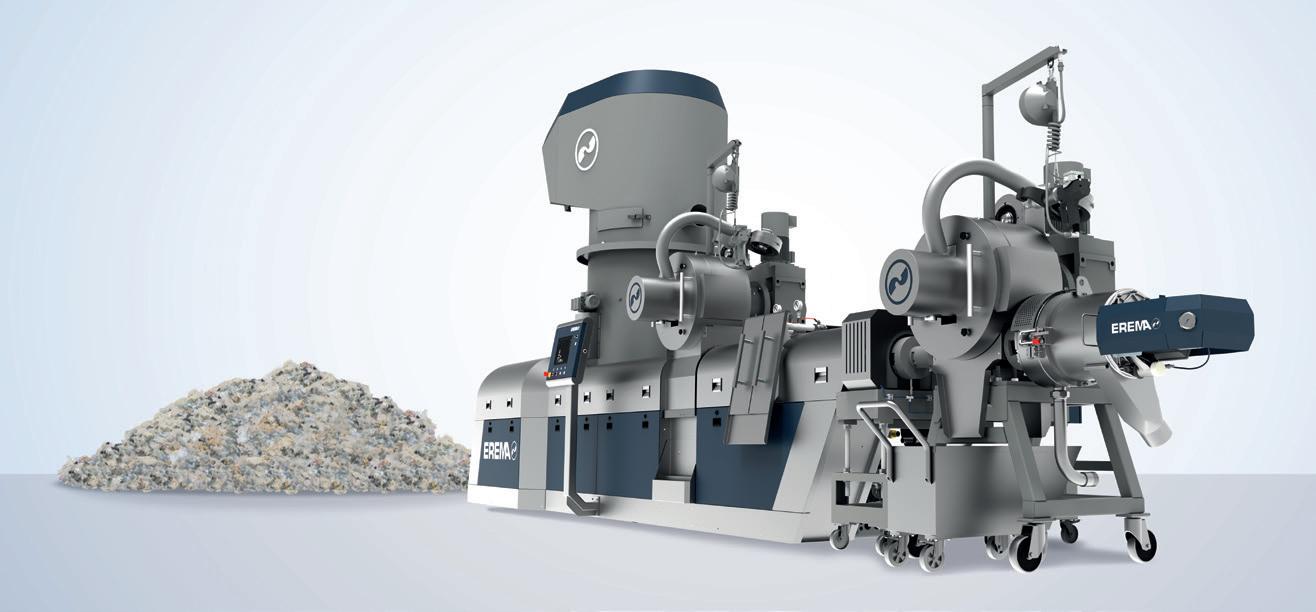
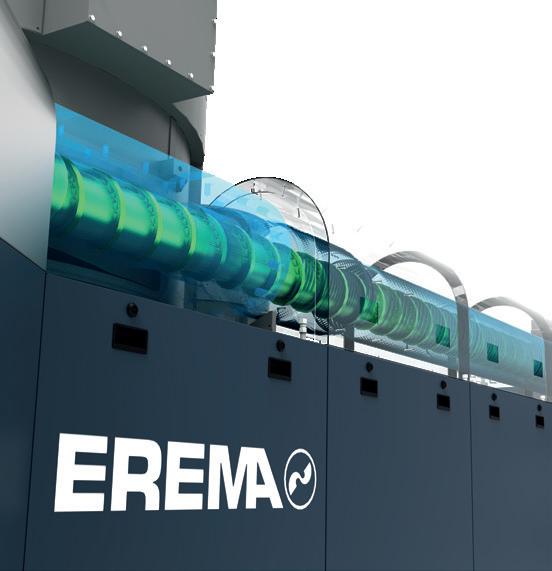
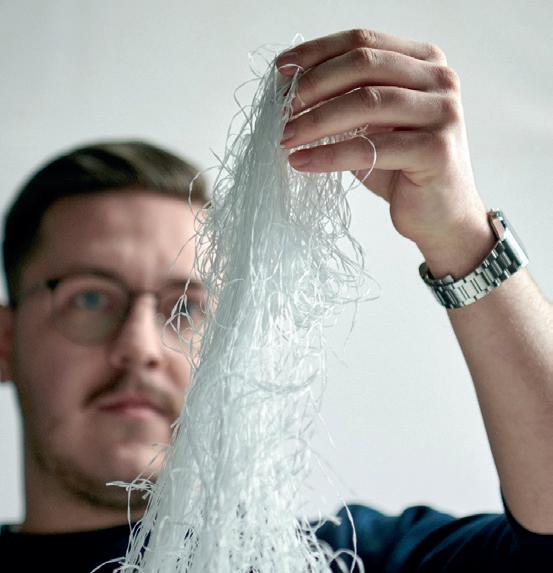
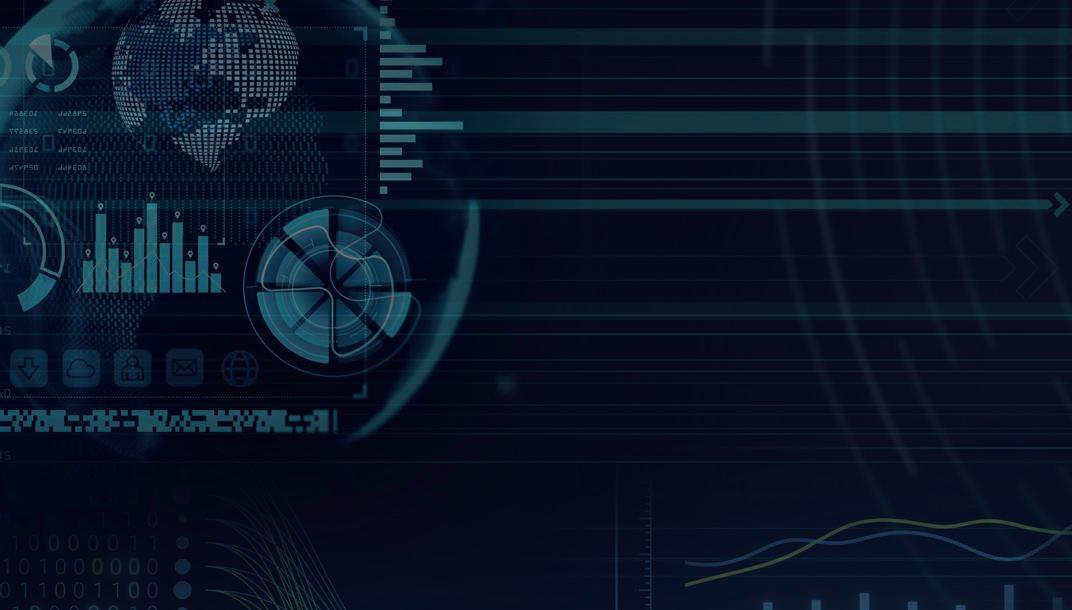
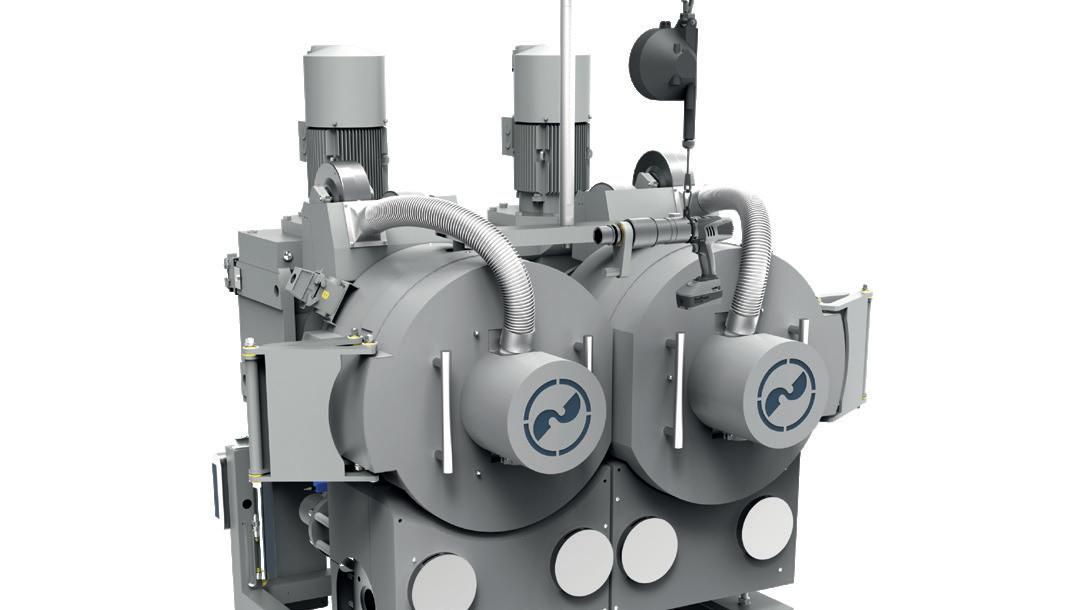
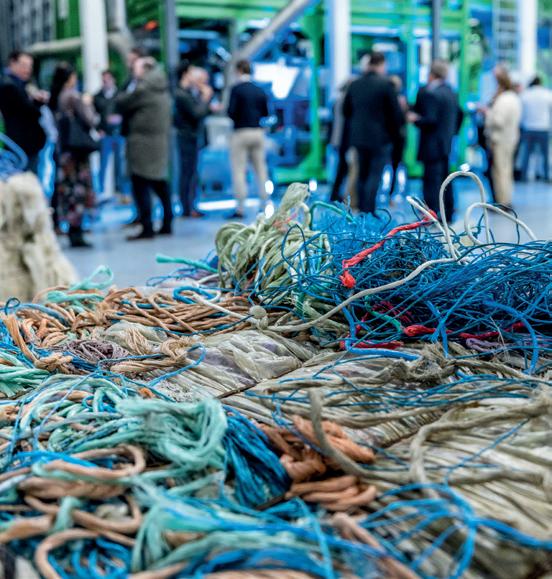
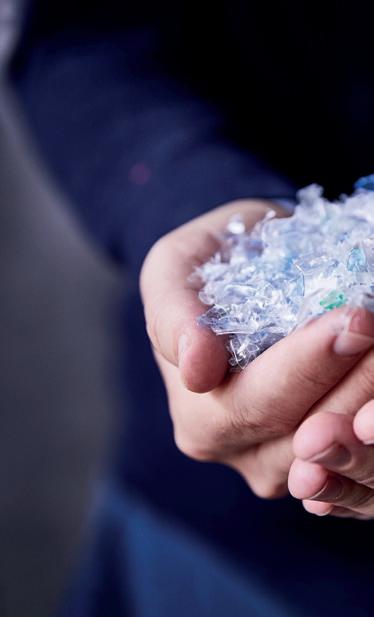
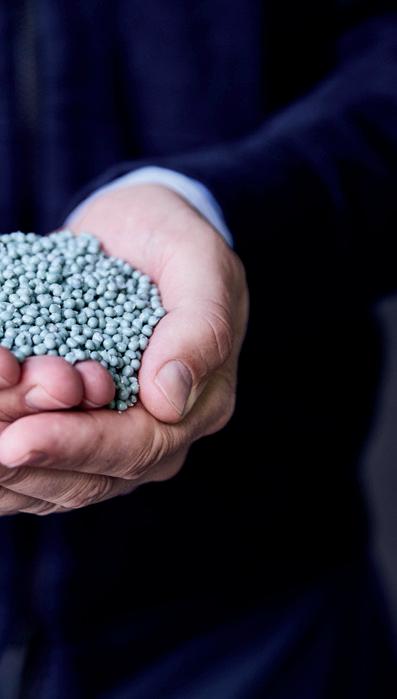
> IMPROVED RECYCLING PROCESS: INTELLIGENT ENERGY RECOVERY, EFFICIENT DATA COMMUNICATION <
Reducing costs through intelligent energy management and achieving consistent recycled pellet qualities by exchanging data between the extruder and washing system – these are the forward-looking projects of the new joint venture between the Austrian recycling specialists EREMA Group und Lindner. The first positive results are already available – and these will result in significant economic benefits for plant operators in the future.
Breaking new ground in plastics recycling means assessing the value chain from end to end. The big opportunities for the future are in fine-tuning the individual process steps; from the collection of recyclable materials to the recycling process and the end product. This is exactly where the cooperation of Lindner and the EREMA Group comes in, officially launched following the 50/50 founding of the holding BLUEONE Solutions in August 2023 to which shares of Lindner Washtech were contributed.
The expertise and experience of EREMA, a manufacturer of extruders and filtration solutions for plastics recycling and the largest company within the EREMA Group, has now been combined with the expert know-how from Lindner Washtech, a leading provider of all-in-one solutions for shredding, sorting and washing plastic feed materials.
Process control is an especially important aspect of plastics recycling, which is why standardising the process control system was what the two companies focused on first. "Together, we have developed a platform that allows data to be exchanged between the extruder and the washing system," says Manfred Hackl, CEO of the EREMA Group. "This enables us to analyse the data more precisely so that effective
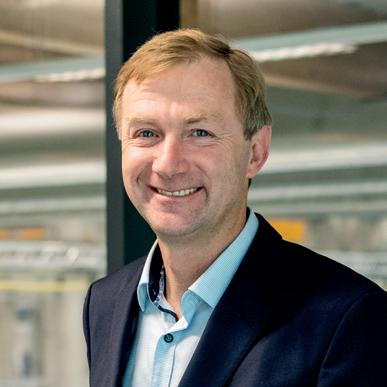
improvement measures can be deduced." All key parameters are taken into account and monitored via a digital interface. For example, it is possible to use information relating to the current throughput of the EREMA Pre Conditioning Unit to optimise the washing process as soon as possible so that it can compensate for fluctuations in capacity and achieve a significant increase in output. This data transfer represents a new step on the roadmap to digitalisation.
"To ensure sustainable recycling, it is necessary to find the right process for each application and to make sure that the individual process steps are perfectly coordinated," emphasizes Michael Lackner, Managing Director of Lindner. Coordinating the process steps has already achieved initial success in energy management, and a clear example of this is heat recovery. "We use the latent heat generated during the extrusion process as an energy source for the washing and drying process," explains Lackner. "This enables our customers to sustainably reduce their energy costs and carbon emissions".
Synergies need to be used to establish the quality standards specified for each end application. "The key question is how we can improve the end product and increase the overall efficiency of the recycling process at the same time," agree Manfred Hackl and Michael Lackner.
» We use the latent heat generated during the extrusion process as an energy source for the washing and drying process. This enables our customers to sustainably reduce their energy costs and carbon emissions.
Michael Lackner Managing Director of Lindner
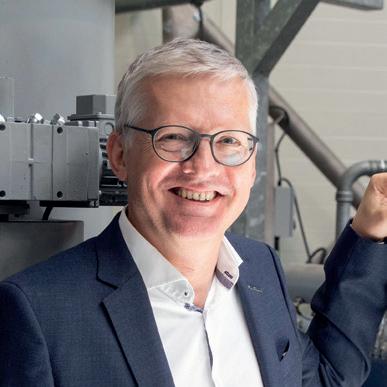
» Together, we have developed a platform that allows data to be exchanged between the extruder and the washing system. This enables us to analyse the data more precisely so that effective improvement measures can be deduced.
Manfred Hackl Managing Director EREMA , CEO EREMA Group
This will only work if companies work together along the value chain. The industry leaders can already point to several examples where together they have improved recycling processes and made it possible to move away from downcycling. "An example of this is the recycling loop of HDPE starting material, which is processed into high-quality, food-safe rHDPE pellets using our two technologies," says Lackner. Lindner Washtech and EREMA continue to work intensively together to develop strategies for upcycling plastics and increase recycling rates.
Everything considered, the joint venture offers companies from the waste and recycling industry an additional special service and improves the end-to-end process. "We want to encourage our customers to come to us with their feed material so that we can discuss the options that are open to them. With the combined expertise of Lindner Washtech and EREMA, we can find the optimum solution for every scenario," says Hackl.
The Lindner family business has been offering innovative and successdriven recycling solutions for 75 years. At their production sites in Spittal/Drau and Feistritz/Drau, Lindner uses state-of-the-art production facilities to manufacture shredders, system components and spare parts that are exported to almost one hundred countries. In addition to stationary and mobile shredding machines for waste recycling, their product range includes complete systems for plastics recycling and processing substitute fuels and waste wood. Applications include household waste, commercial and industrial waste, waste wood, plastics, packaging material, paper and light-gauge scrap. In addition to the headquarters in Spittal/Drau and the second production site in Feistritz/Drau, Lindner also has offices in Germany, the USA, France and Asia with a total of eight sales locations and service hubs.
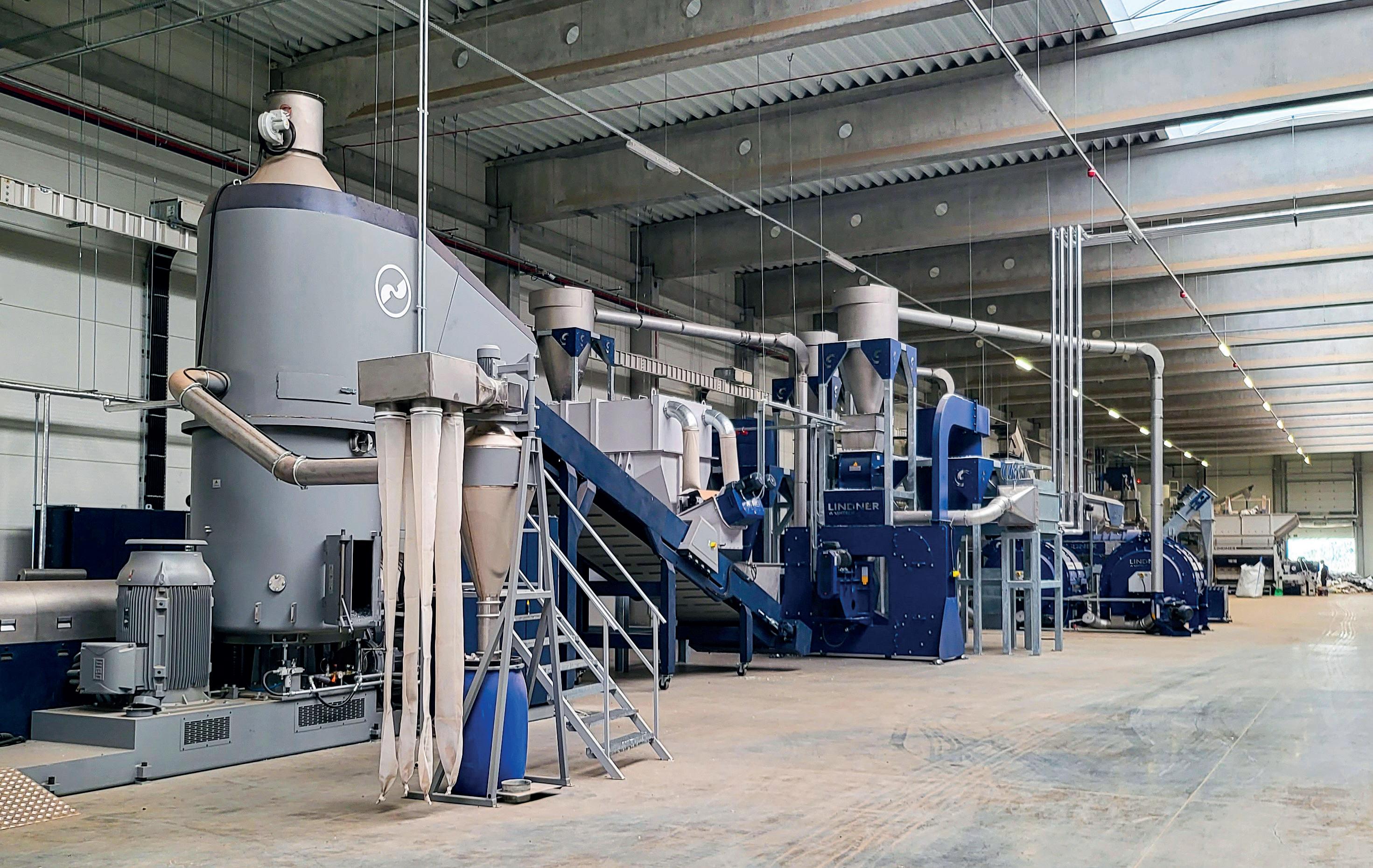
This is how powerful ‘short’ can be: The innovative INTAREMA® TVEplus® DuaFil® Compact significantly reduces the length of the extruder and thereby gets more out of it for quality-orientated recycling companies: Finest, double-filtered and optimally degassed regranulate quality – produced with high throughput and extremely low energy consumption. This sets the benchmark for production efficiency in post-consumer recycling.
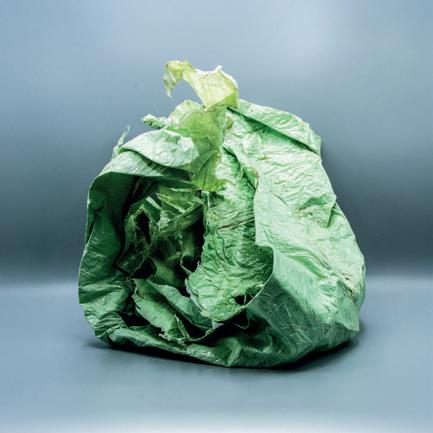
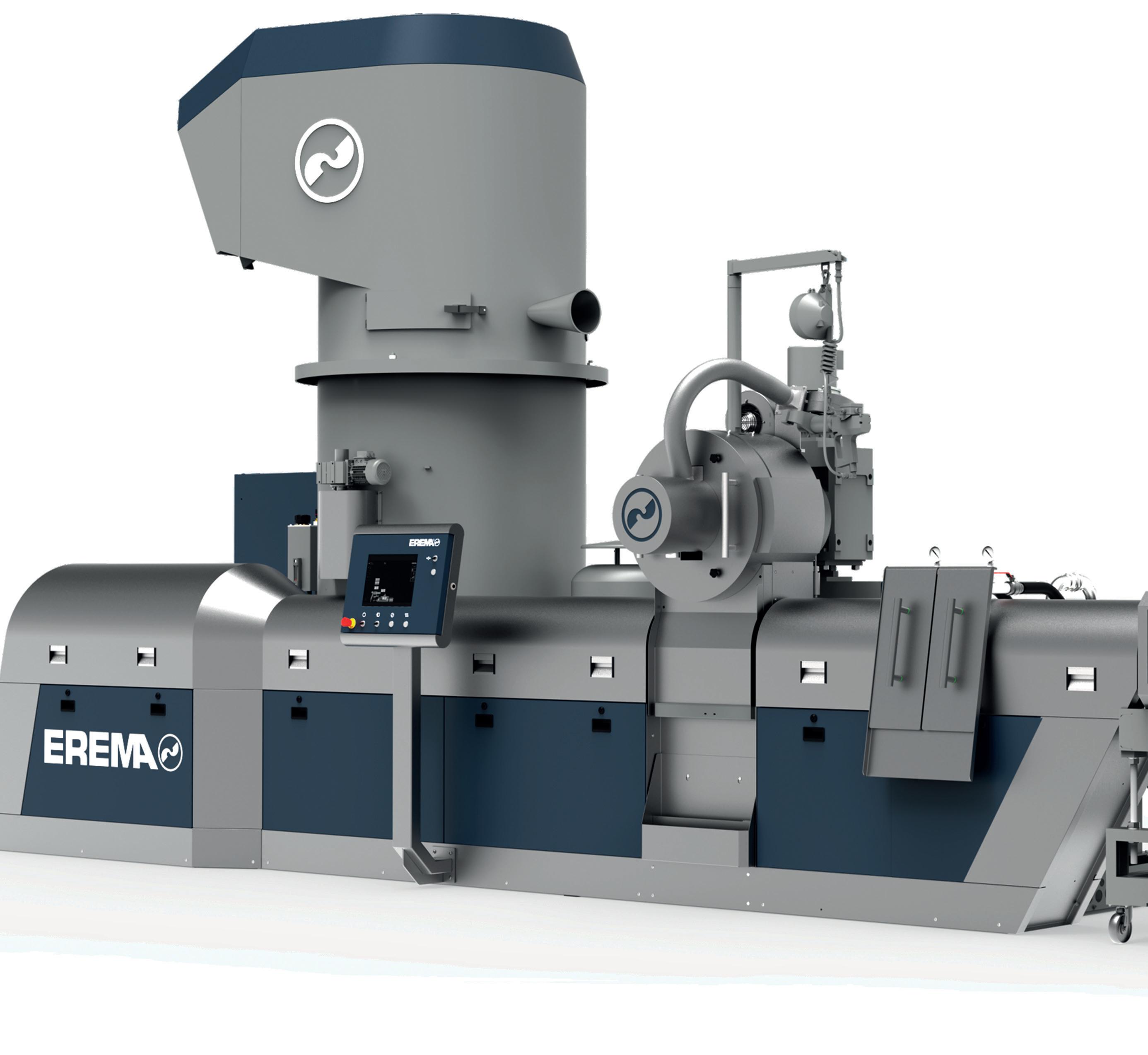
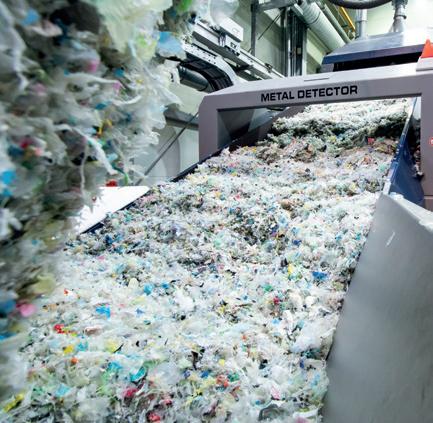
Predestined for high-quality film recycling: the INTAREMA® TVEplus ® DuaFil® Compact scores with particularly high filtration and degassing performance (in the picture: agricultural film (left, before the washing process) and washed film flakes from the household collection)
Due to their properties, household waste, supermarket film, agricultural film and input materials from similar sources place high demands on the recycling process. The quality of the recycled pellets depends largely on the gentle treatment of the melt and the effective removal of impurities. To meet these kinds of challenges, EREMA has developed the new INTAREMA® TVEplus® DuaFil ® Compact. The machine is the industry benchmark for recycling challenging materials with high levels of contamination and moisture, such as film waste with paper labels from commercial waste, agricultural film and washed film from household waste.
A key feature of the machine is the consistently
Compact technology. Thanks to the compact configuration of the machine, the extruder screw is 10 L/D (length-to-diameter ratio) shorter compared to the previous EREMA double filtration solution, and there is no longer a need for the discharge metering zone. The melt is processed more gently overall, also because a dedicated melt pump is used to increase the pressure upstream of the second filtration unit.
"Our DuaFil ® Compact technology decouples pressure and temperature build-up, which reduces the overall melt temperature so that it reaches its highest temperature in
Consumer Applications at the EREMA Group. This increases the degassing volume by up to 33 percent, while at the same time reducing retention time and energy consumption.
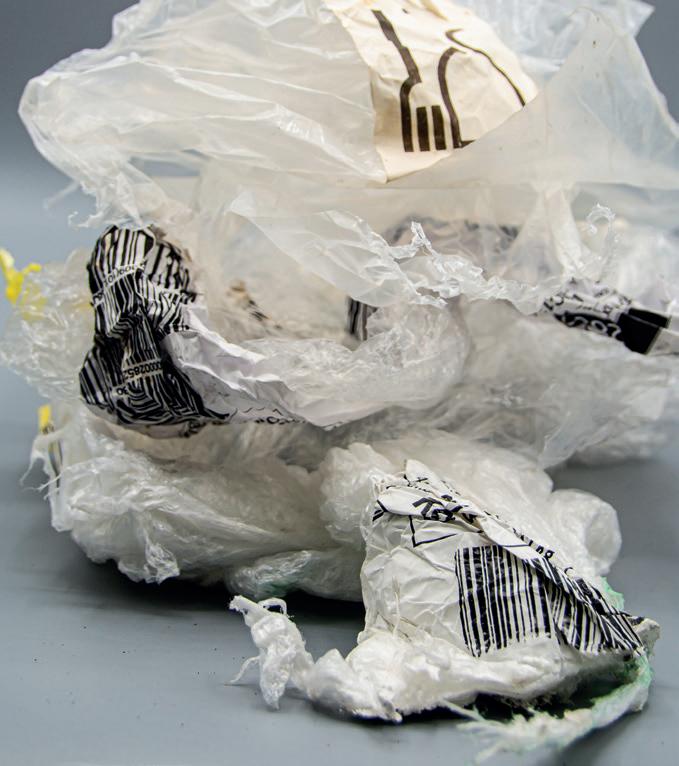
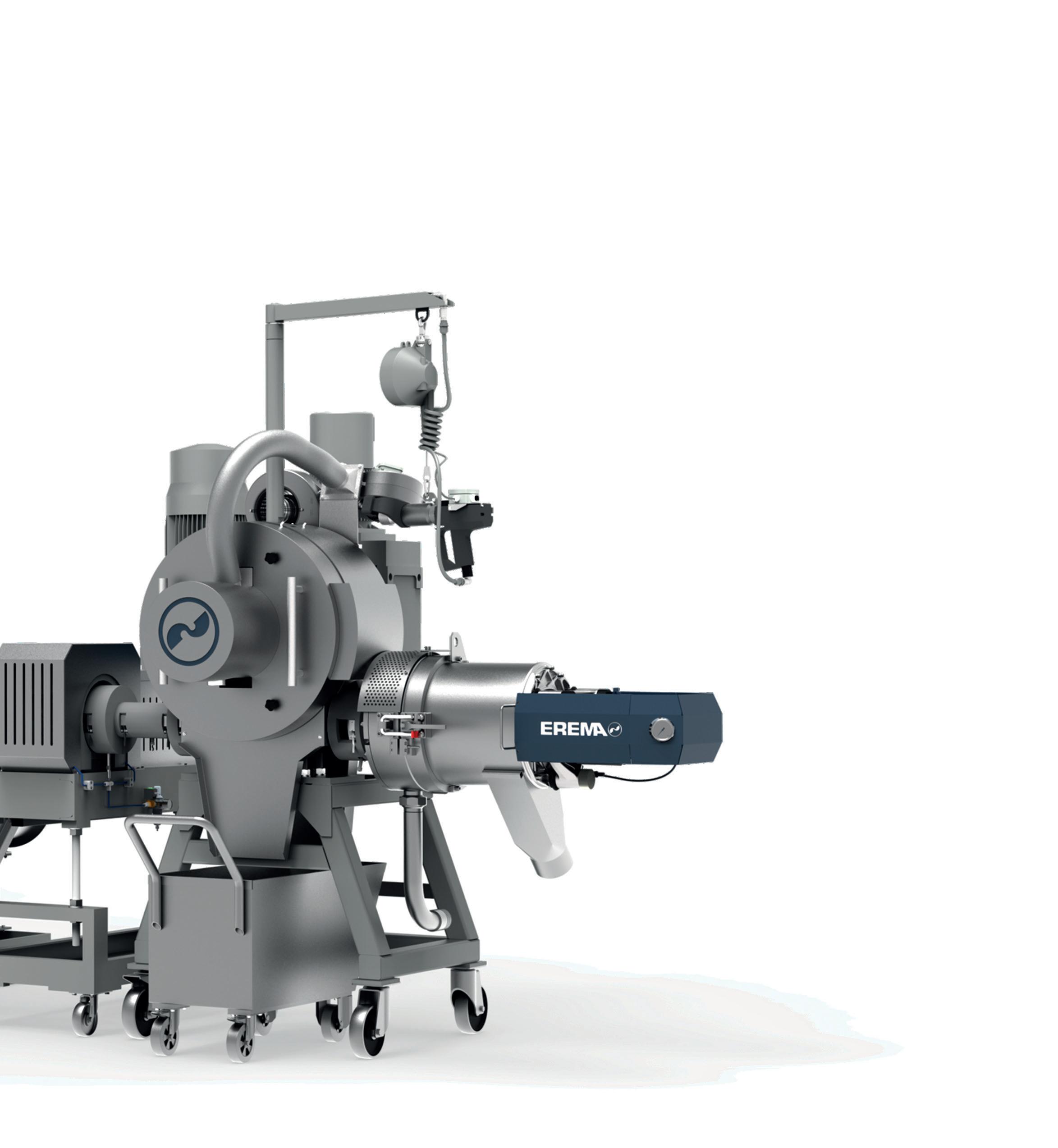
The particularly gentle handling of the plastic melt by the INTAREMA® TVEplus ® DuaFil® Compact is a real quality advantage in processing the demanding application of supermarket film contaminated with labels.
Compact can be designed with either an EREMA laser filter or a mesh filter – such as
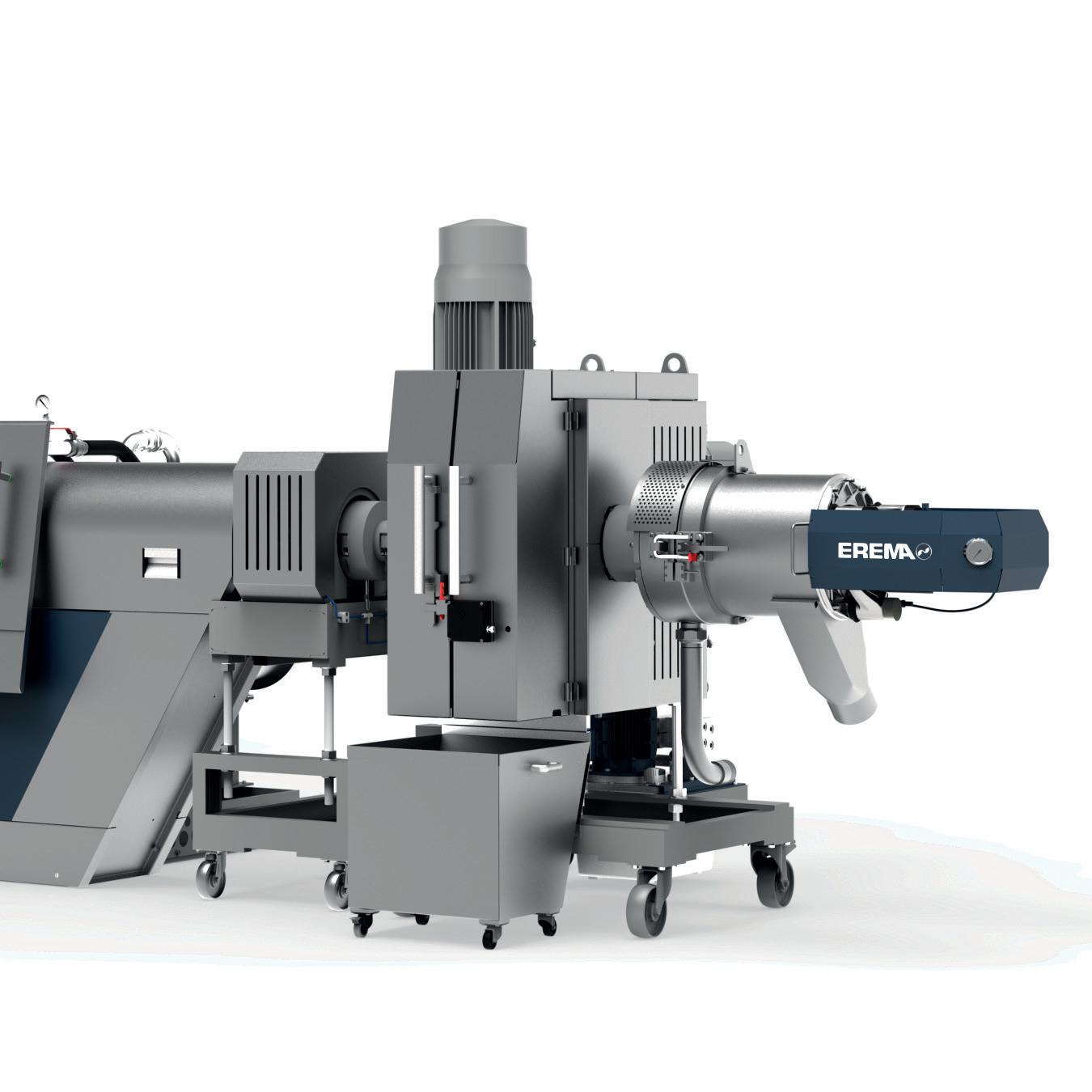
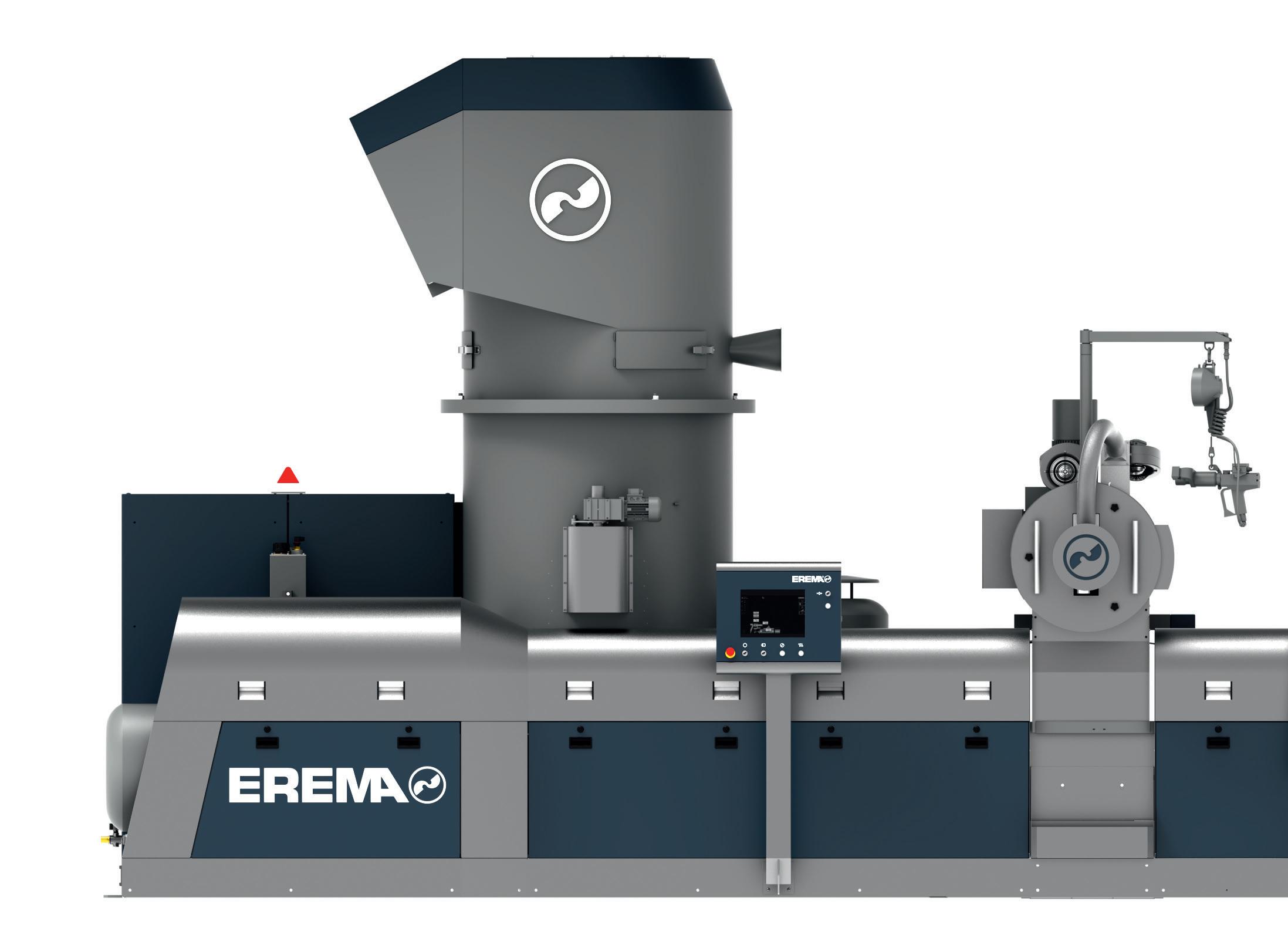
"This new development is based on feedback from the market," emphasizes Kitzberger. When recycling DSD 323-2 (flexible PE and PP household waste), for example, the new INTAREMA® 1108 TVEplus® DuaFil® Compact reaches a melt temperature upstream of the second filter unit that is around 22 degrees Celsius lower, with around 11 percent lower specific energy consumption (kWh/kg) and around 14 percent higher throughput compared to the previous EREMA solution.
Recycling film, especially supermarket film (98/2), is well established in North America and is also gaining importance in South America. Thanks to the gentle polymer processing and high filtration performance of INTAREMA® TVEplus® DuaFil ® Compact technology, the recyclates produced are perfect for reusing in films. EREMA achieves a recycled content of 30 percent for stretch
film with a thickness of 8 micrometres (µm) and 50 percent for shrink film.
An application that is currently growing in the USA is the recycling of agricultural film. The producers receive film after it has been used, recycle it, and return it to production. The demand for technologies for processing heavily printed films is also increasing. Both applications are challenging: agricultural film is typically heavily contaminated with sand, stones and organic matter, and printing inks often enter the material being recycled during the melting process. The INTAREMA® TVEplus ® DuaFil ® Compact provides the high degassing performance required to achieve excellent results using a very efficient process. When recycling agricultural film, for example, EREMA has been able to save 20 degrees Celsius in the melt temperature and 9 percent in energy consumption. At the same time, throughput increased by 11 percent.
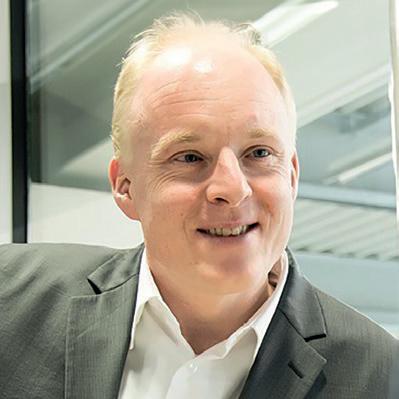
» The degassing volume increases by up to 33 percent, while at the same time reducing retention time and energy consumption.
Clemens Kitzberger Business Development Manager Applikation Post-Consumer, EREMA Group
Decoupling of pressure and temperature build-up, which reduces the overall melt temperature and the highest temperature already occurs before degassing.
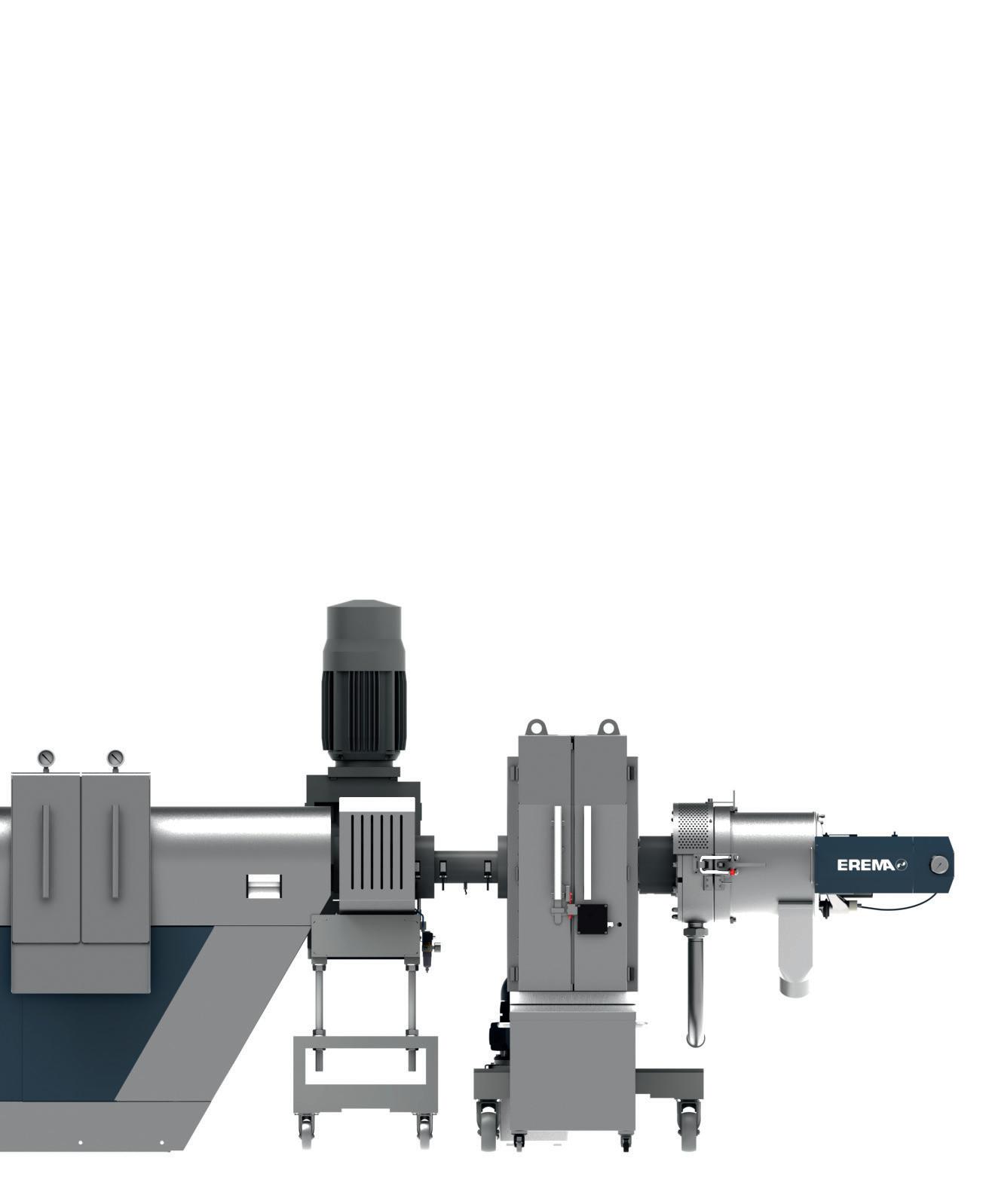
Since K 2022, EREMA has sold more than 20 INTAREMA® TVEplus® DuaFil ® Compact systems. The first machines have been delivered and have now entered operation. At RECUPAC S.A., for example, a recycling and waste disposal company based in Chile.
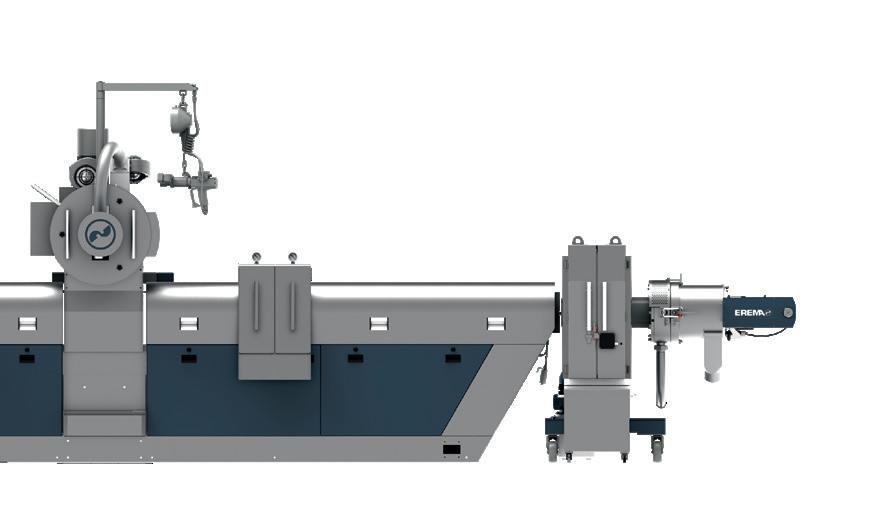

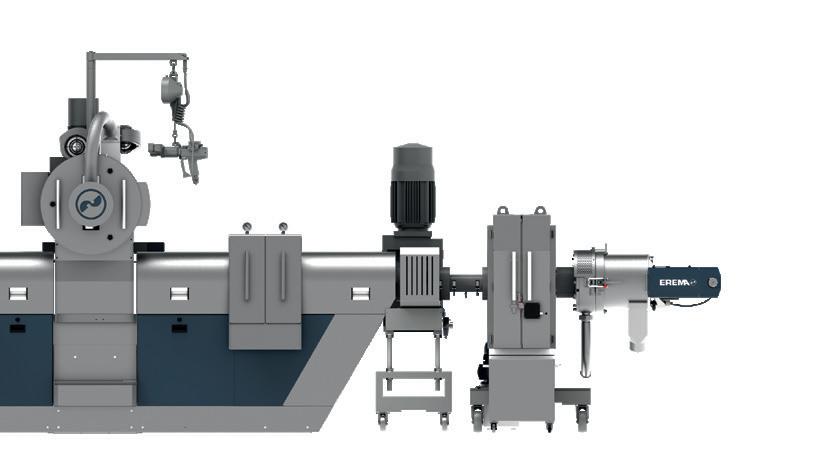

"As the business unit for waste management at Coipsa, a group of packaging companies in Chile that are fully integrated in all phases of the circular economy, we process more than 150,000 tons of different materials every year," says Philippe Morizon, General Manager at RECUPAC. Plastics recycling is a relatively new field for the company. For their first machine, they decided on an INTAREMA® 1512 TVEplus ® DuaFil ® Compact. The objective is to produce high-quality recycled pellets suitable for making film. "Our customers have very high quality specifications, which is why we chose an EREMA machine," emphasizes Morizon. "With this compact recycling machine, we can produce high-quality pellets that are used to make film and can be used for other applications in the packaging sector. There were many arguments in favour of this machine, including its high overall efficiency. Particularly important factors were its low energy consumption and high degree of automation, which saves on operating personnel. I am confident we will meet our customers' expectations, and the initial results are very promising."
RECUPAC also operates a Lindner washing system. In August 2023, EREMA Group joined forces with the waste management specialist and founded a new holding company. The two companies want to work together to increase the energy efficiency of the overall process and further improve recyclate quality through technical cooperation.
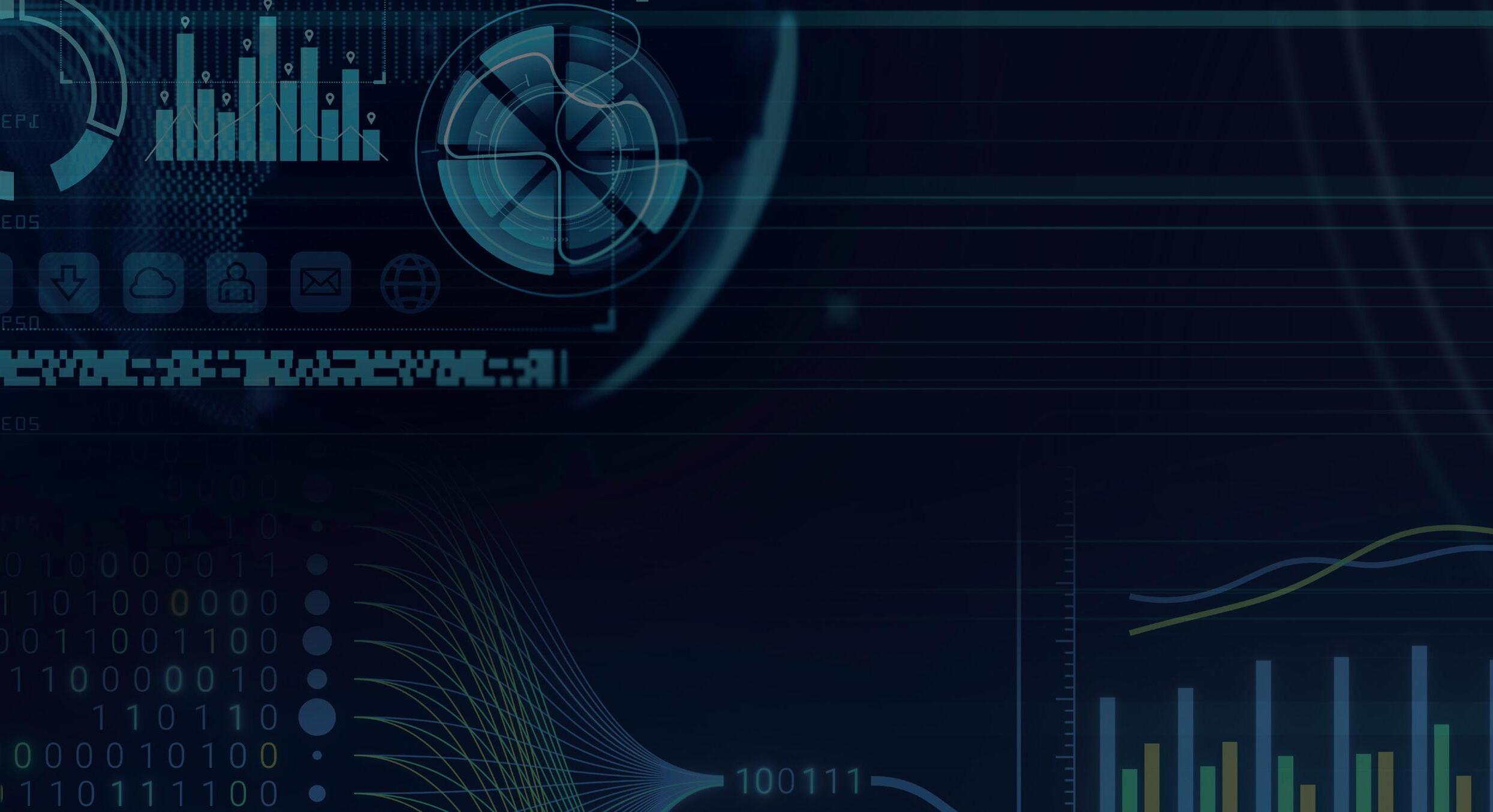
The new 2/406 size of the EREMA Laserfilter, with its significantly larger screen surface, is
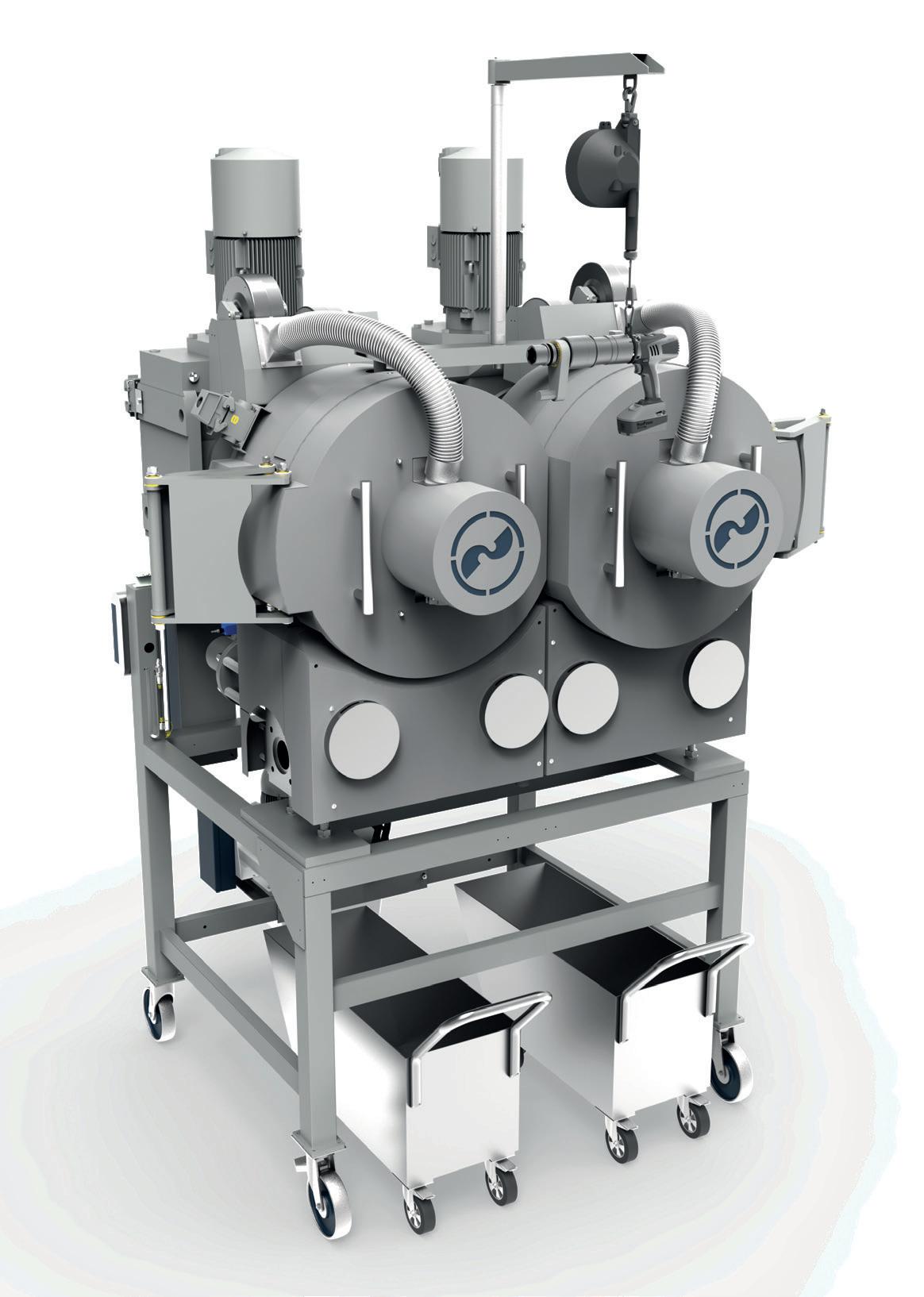
> NEW CONTROL SYSTEM PROVIDES AN INNOVATIVE BOOST FOR EREMA LASER FILTERS <
Greater efficiency, more stable processes and increased ease of use with reduced time and labour costs – these are the powerful attributes of the new EREMA laser filter control system DischargePro. The smart discharge control reduces melt loss by up to 50 per cent. Another of EREMA's innovations in filtration technology is the new 2/406 size of laser filter. Compared to the 2/356 laser filter, it has a 50 percent larger screen area.
Recycling post consumer input material is characterised by a large number of fluctuations. This is a major challenge for recycling machines, and especially for melt filters. With the EREMA SW RTF ® (backflush filter) and the EREMA laser filter, the recycling machine manufacturer offers two models of filter in different sizes, designs and performance levels.
The new laser filter control system DischargePro significantly increases the level of automation by automatically compensating for fluctuations in the input material. By adjusting the speed of the scraper disc and the discharge screw according to demand, DischargePro ensures the melt thickens uniformly during filtration. This is a crucial parameter for a consistent and cost effective
process. "The new DischargePro control system automatically determines the optimum process setpoints and ensures that these are maintained during the whole operating period of the laser filter," explains Robert Obermayr, Head of the POWERFIL business unit at EREMA. "This is made possible using fully automatic reinitialisation, which is time and/or event driven."
• EASIER OPERATION, MORE AUTOMATION: significantly less adjustment and testing work for operators
• COST SAVING: less time and labour required, longer screen life
• HIGHER PROCESS CONSISTENCY AND FILTRATION QUALITY: control system recognises contamination fluctuations in the input material and compensates for these by adjusting the rotation speed as required – for constant thickening during melt filtration
• OPTIMUM THICKENING RATIO for a high proportion of filtered contaminants (paper, wood, aluminium, etc.) and low proportion of melt in the filter discharge
• UP TO 50 % LOWER MELT LOSS*) during filtration means more recycled pellets at the end of the process and therefore an additional economic advantage
• MORE COST EFFECTIVENESS, MORE PRODUCTIVITY
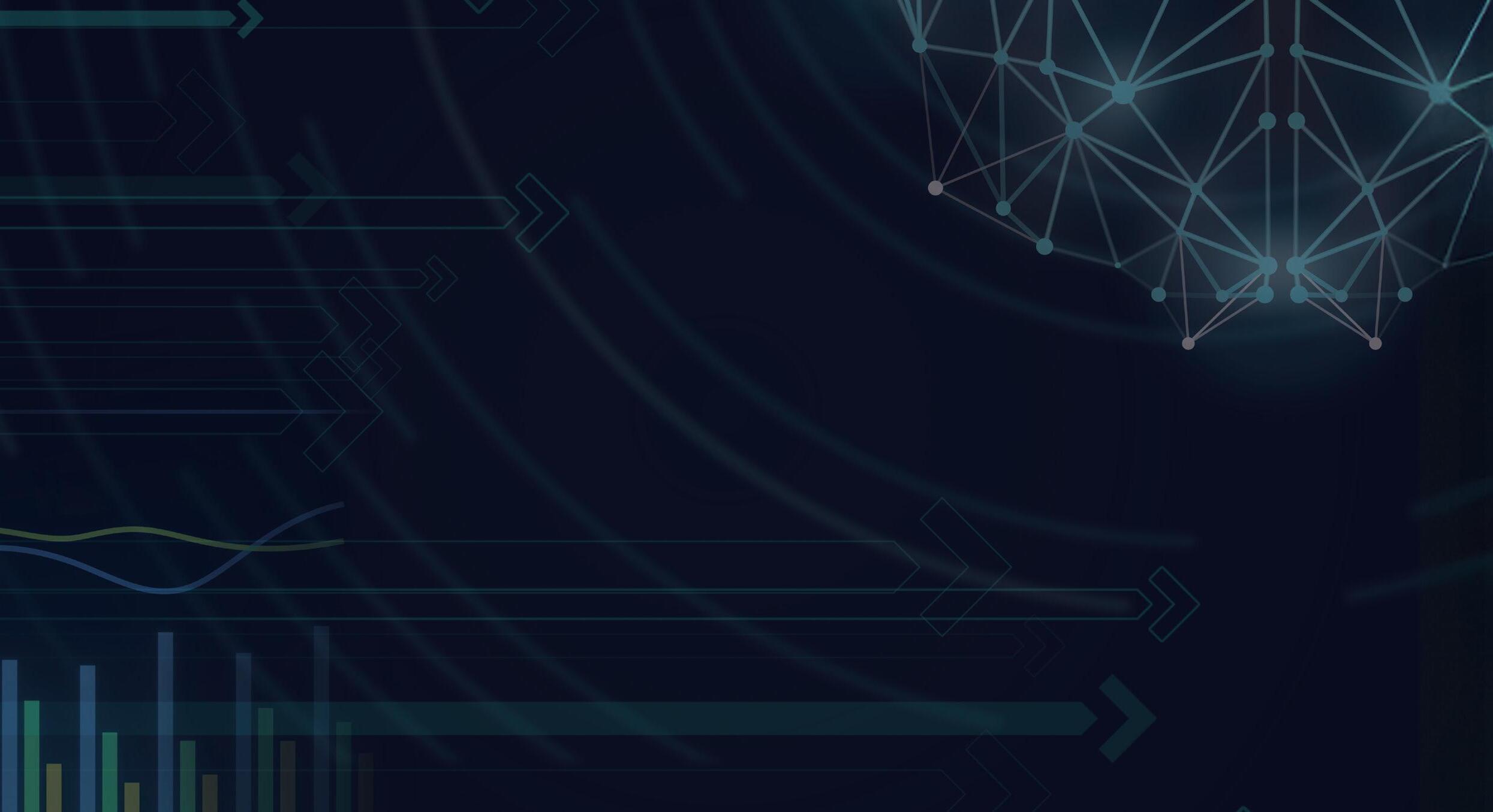
EREMA Laserfilter discharge [%] example on washed stretch/shrink film flakes
The innovative discharge control system reacts to specific disruptive factors, such as:
Contamination peaks:
DischargePro automatically adjusts the speed of the scraper star, returning it to the setpoint speed as soon as the contamination peak has been discharged. Reduced throughput :
The new laser filter control system detects significant changes in throughput and automatically adjusts the discharge rate so that thickening remains consistent during filtration.
Increased viscosity :
As soon as the melt has a higher viscosity and, as a result, creates a higher pressure drop across the filter screen, DischargePro automatically adjusts the setpoint value to ensure a consistent discharge rate.
Longer-term changes are also taken into consideration because DischargePro takes the ongoing condition of the filter screen into account. Over the course of the screen's utilization period, its effective surface area decreases, causing the pressure drop to increase even though the input material is still the same. The intelligent control system reacts to this by automatically adjusting the setpoint to continuously ensure the optimum thickening ratio is achieved.
"Our new laser filter control system delivers greater efficiency and more stable processes for our customers and is particularly userfriendly," emphasises Robert Obermayr. The machine operator no longer needs to readjust the filter, which reduces the personnel
time required. Depending on the application and degree of contamination, DischargePro reduces melt loss noticeably. "We have been able to achieve up to 50 percent lower melt losses for our customers compared to the previous EREMA laser filter control system," says Obermayr.
Another of EREMA's innovations in filtration technology is the new 2/406 size of laser filter. Compared to the 2/356 laser filter, it has a 50 percent larger screen area. With a larger surface area, EREMA enables the filtration of plastic melt at a much higher rate, which is a clear advantage for applications where throughput has priority.
ANTI-ODOUR TECHNOLOGY
R EFRESHER
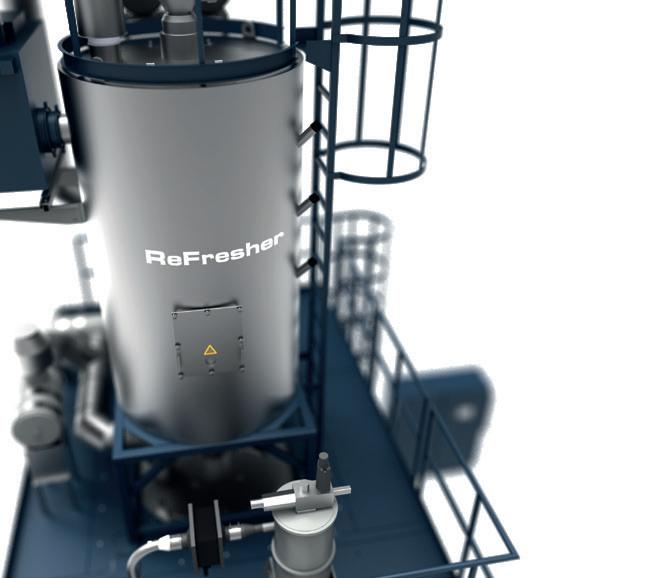
EREMA launched the ReFresher for producing odouroptimized recycled pellets at K 2016. There are now ReFreshers in operation worldwide for film and
regrind applications with a total capacity of 1,000,000 tonnes per year. Combined with the INTAREMA® TVEplus®, the antiodour system opens up completely new application possibilities for recyclates, such as high-quality end products for the home, automotive and lifestyle sectors, and for processing food-safe polyolefin recycled pellets (HDPE, LDPE and PP). The process has been classified by an American food safety authority as suitable for feeding the recyclate back into the production of food packaging.
BOTTLE-TO-BOTTLE RECYCLING
"Think big and safe – that's the message to our bottle-to-bottle recycling customers," says Christoph Wöss, Business Development Manager for bottle applications at the EREMA Group. In this connection, he points out that customers can now obtain complete systems including SSP post-treatment directly from EREMA, that can process up to 12,100 pounds (5,500 kilograms) of food-safe rPET pellets per hour.
ECOGENTLE ® : UP TO 6 TONNES/H WITH LOWER TEMPERATURE AND ENERGY CONSUMPTION
Whether VACUREMA® Basic, Advanced or Prime, or VACUNITE® – EcoGentle ® is the ultimate plasticising technology from EREMA for PET recycling. It combines gentle melt treatment with significantly reduced energy consumption – for high cost effectiveness, productivity and top-quality rPET end products. The newly developed plasticising technology, in combination with EREMA's proven Counter Current ® technology, ensures perfect interaction between the feed section and the extruder screw. Temperature and energy requirements are greatly reduced,
while at the same time improving melting and mixing performance in the plasticising unit. Measurements on a VACUREMA® Basic 2628 T system resulted in up to 12 percent total energy saving (specific total energy consumption, kWh/kg) and 30 to 47 percent energy saving for the extruder drive on VACUREMA® Basic plants from size 2021 upwards. Additionaly EcoGentle ® handles the melt in an impressively gentle way. At the same time as achieving unprecedented high throughputs of up to 6 tonnes per hour.
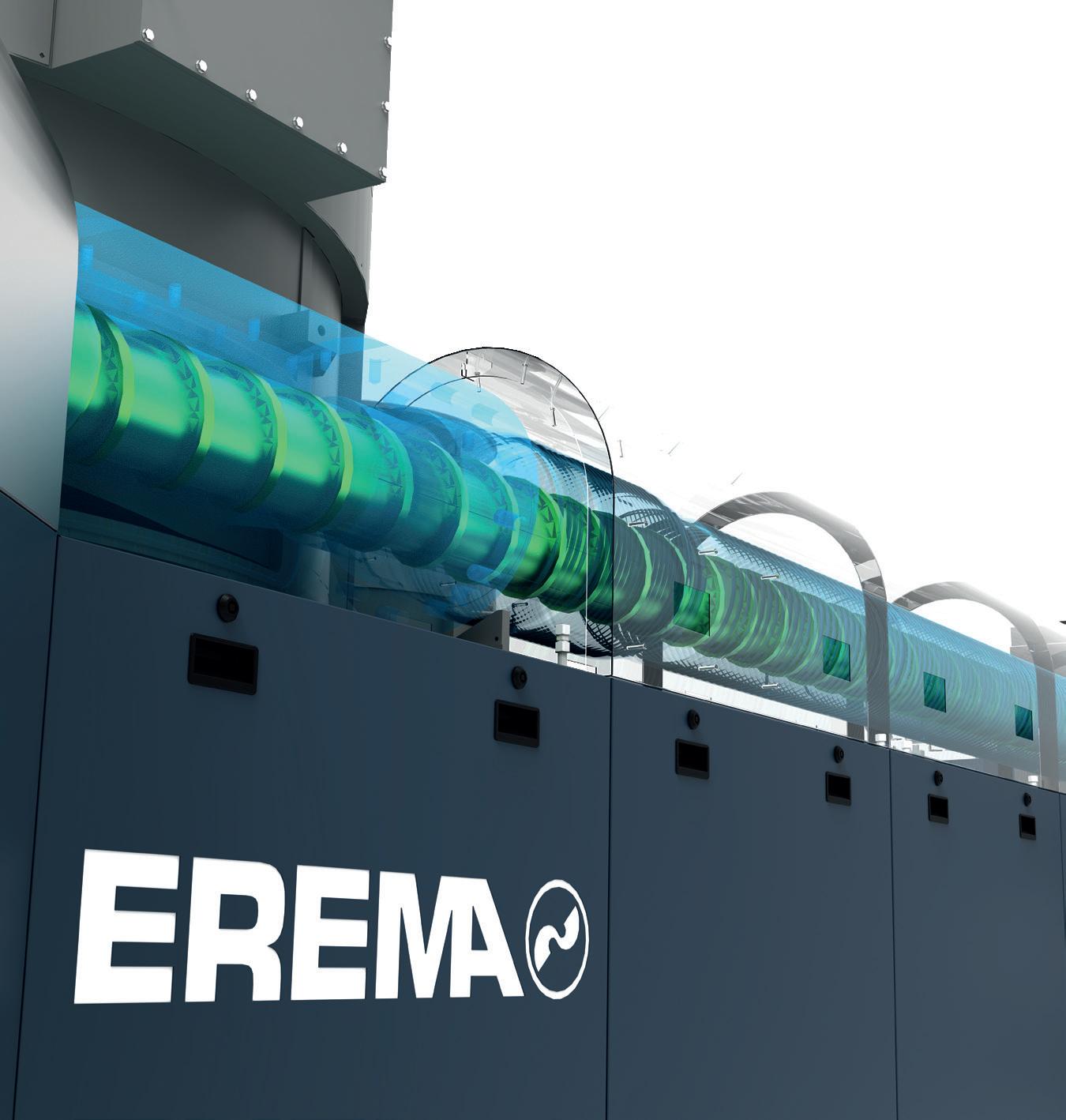
Taking action today to prevent downtime tomorrow – for more machine availability and higher productivity: The new Predictive Maintenance Tool PredictOn provides effective support for machine operators. That is because the new tool from EREMA provides machine data relating to the condition of the plant that enable predictions regarding the maintenance work that is needed. Behind this is an ingenious modular measurement and sensor system for real-time data acqui sition and storage that is used for evaluating the condition of the machine as well as for advanced analysis of damage location and damage spread while proposing pos sible countermeasures. Deploying service
personnel and obtaining spare parts can be better planned using predictive maintenance and leads to higher plant availability
and lower costs compared to routine or scheduled preventive maintenance. That is because intervention is only needed when a problem has been detected.
PredictOn:Drive is a tool in EREMA's new PredictOn family. Whether it's the motor temperature, gear teeth, or pump bearings, PredictOn:Drive provides a comprehensive solution for the monitoring and predictive maintenance of all main drive trains of the preconditioning unit and extruder.

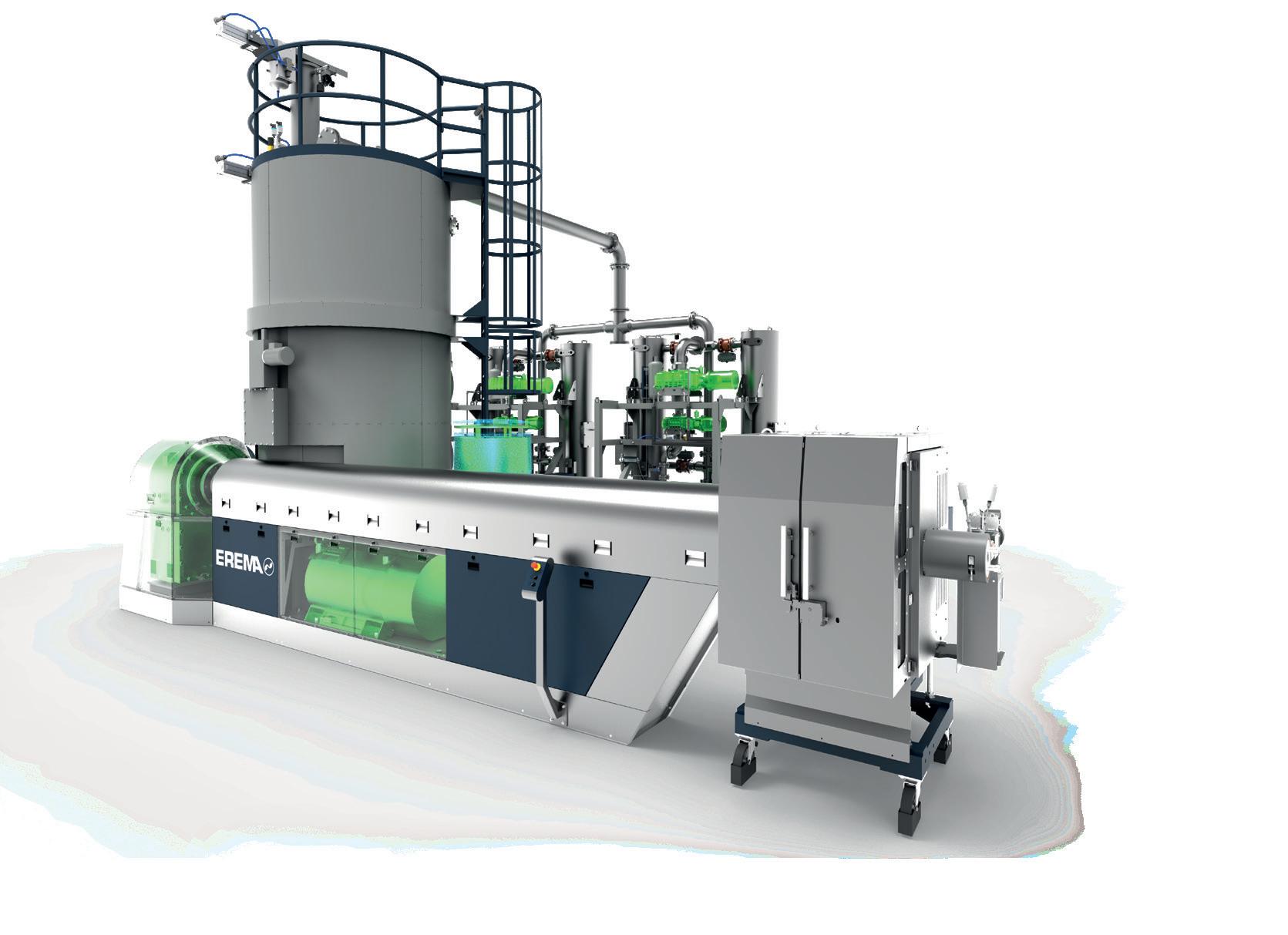
control system from EREMA's POWERFIL business unit was presented with the Plastics Recycling Award Europe in the "Recycling Machinery Innovation of the Year" category. The smart technology for the EREMA laser filter improves process stability over the entire operating period and reacts automatically to fluctuations during the recycling process. Depending on the application and contamination, POWERFIL was able to reduce melt loss by up to 50 percent with the DischargePro compared to the previous EREMA laser filter control system. These facts convinced the jury, who described the technology as an intelligent technological advance in the extrusion process (more information about the DischargePro control see pages 10 and 11).
> POLYOLEFIN PLANT WITH A THROUGHPUT OF MORE THAN 4 TONNES <
With the new INTAREMA® 2325 EREMA is expanding its post-consumer series upwards to enter a new dimension in recycling. The INTAREMA® 2325 T-VEplus® with laser filter is the largest system ever built to recycle polyolefin regrind and marks a milestone in the very latest recycling technology.
As the demand for recycled plastics increases, so does the need for larger recycling machines. This is an industry where EREMA can draw on a wealth of proven experience. In the PET sector, the machine manufacturer has already implemented several projects with large-scale systems of this magnitude featuring their VACUREMA® technology. Now the company is following that up in polyolefin recycling. The new size of INTAREMA® is EREMA’s response to market demand. "New legislation and the voluntary commitment of major product brands mean that in the future, our customers will need to process an increasing volume of plastic waste to make high quality recycled pellets without any compromises," says Markus Huber-Lindinger, Managing
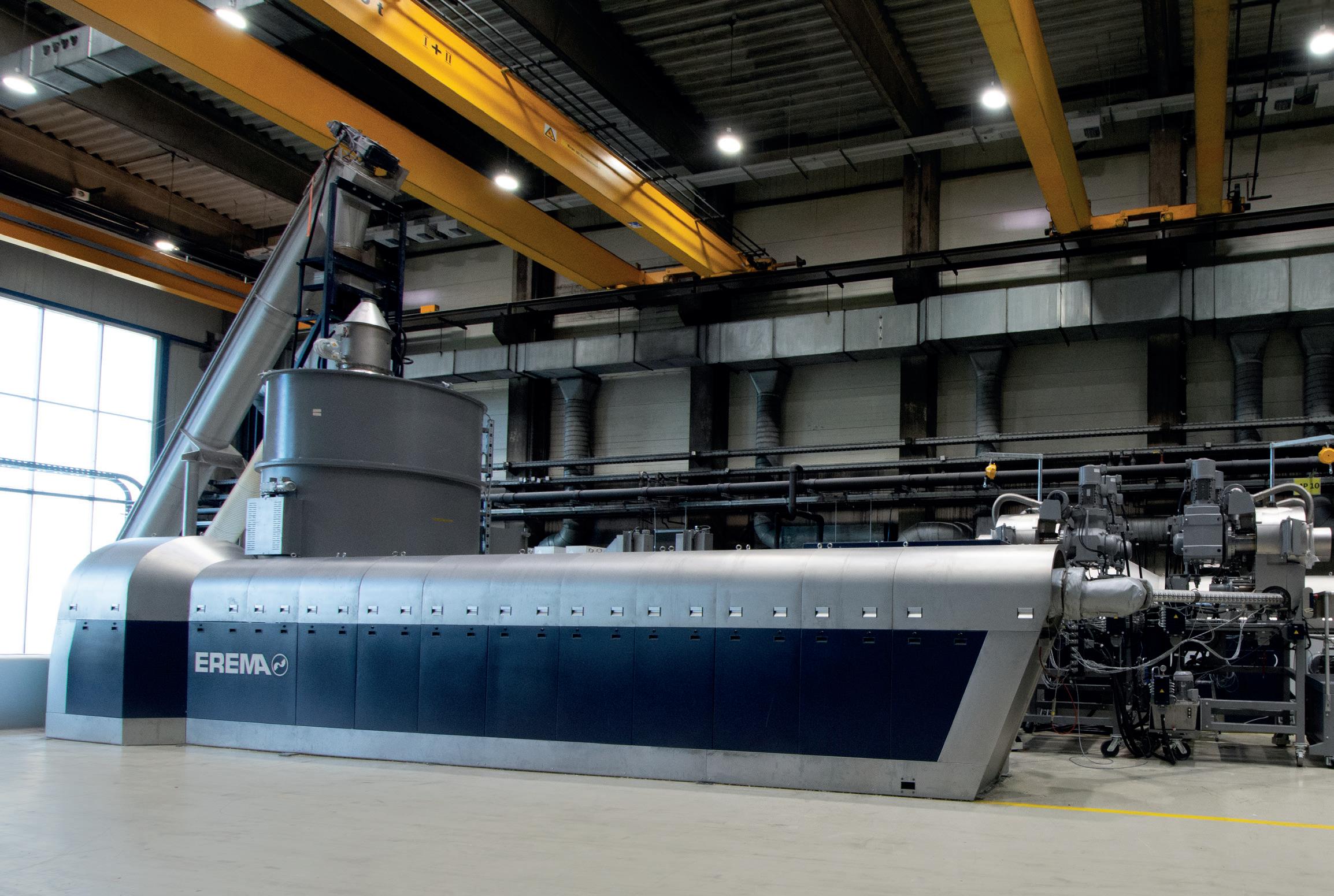
Director at EREMA. "The INTAREMA® 2325 is our answer to this need."
The INTAREMA® generation of machines is EREMA's flexible series for handling a wide variety of feed materials. Available in 13 sizes for film and 9 sizes for regrind applications, the INTAREMA® range covers a broad spectrum. The new 2325 model with a preconditioning unit (PCU) diameter of 2.30 metres and an extruder screw with a diameter of 250 millimetres enables the production of high volumes of high-quality recycled pellets using a single machine. "With a throughput of over 4,000 kilograms per hour for PO regrind, the INTAREMA® 2325 sets new standards in terms of performance and efficiency," emphasises Huber-Lindinger. The system also impresses with its compact footprint in contrast to its high throughput capacity.
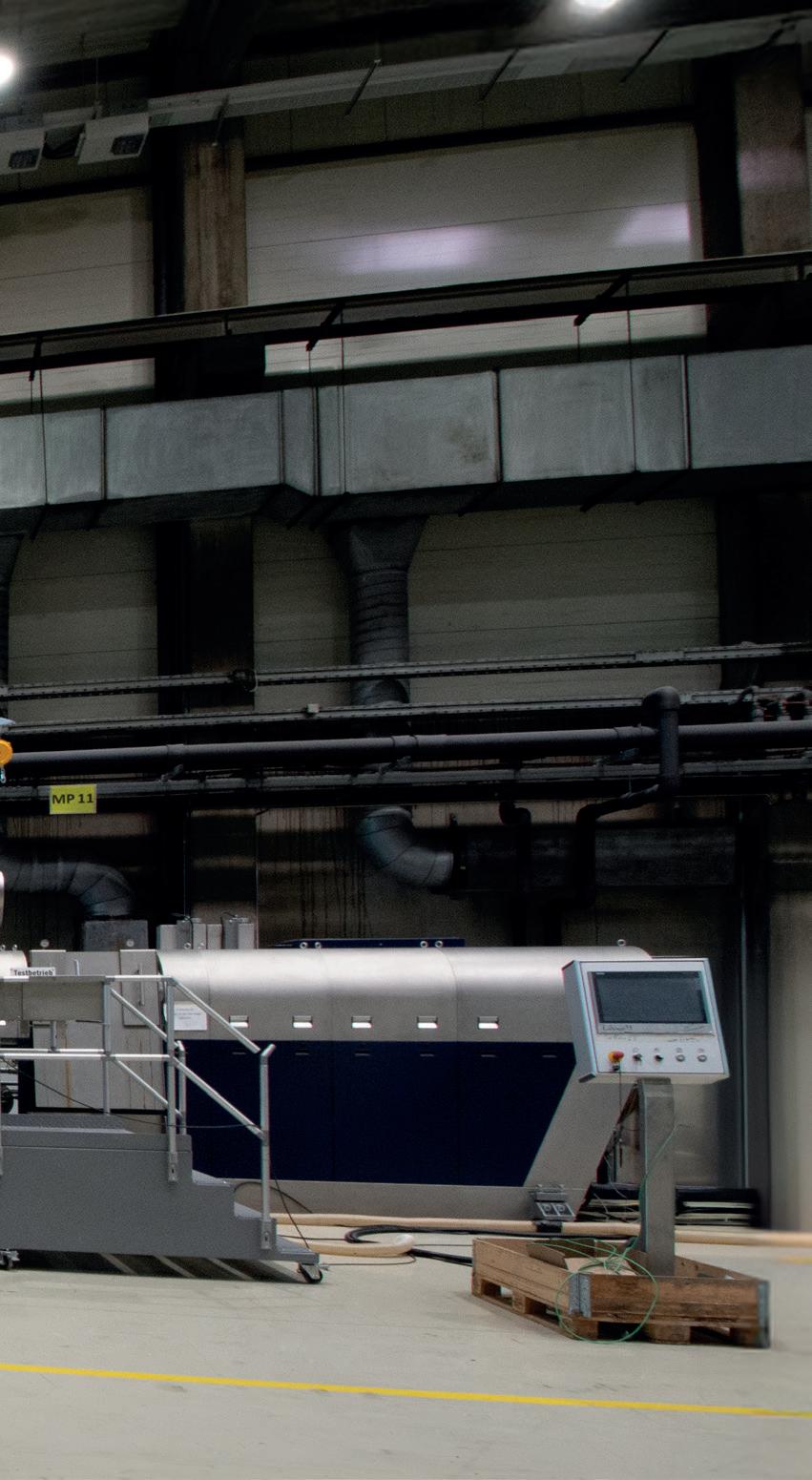
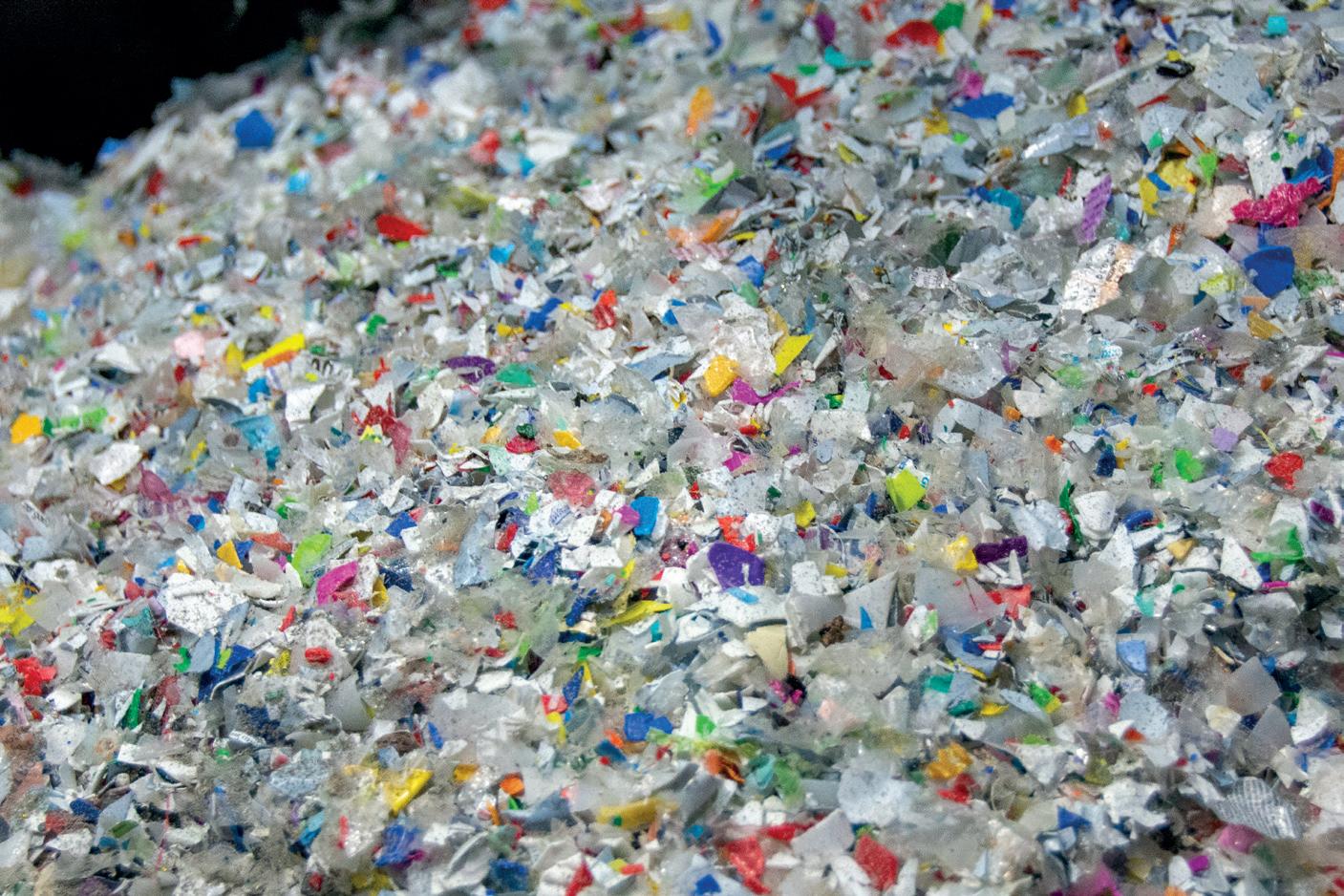
technology, makes the INTAREMA® series particularly user-friendly and efficient.
» The INTAREMA® 2325 impresses with high-quality recycled pellets at high throughput rates, all within a very stable process.
Sophie Pachner
R&D Manager for Process Engineering at EREMA
The plant is packed with innovative technology. The proven key principle of the TVEplus® Counter Current ® system lies in melt filtration upstream of extruder degassing. This makes it possible to produce recycled pellets of impressively high quality, meaning that the proportion of recycled plastics used in the final product can be significantly higher than with lower-quality recycled pellets. "Our extensive trials with around 500 tonnes of material have shown that the INTAREMA® 2325 impresses with high-quality recycled pellets at high throughput rates, all within a very stable process," says Sophie Pachner, R&D Manager for Process Engineering at EREMA.
Like all INTAREMA® systems, this one is also equipped with patented Counter Current ® technology. The plastic material moves through the preconditioning unit in the opposite direction to the extruder screw, ensuring a consistently high output over a wide temperature range. This system, combined with a high degree of automation thanks to the intelligent Smart Start ® user interface and energy-saving ecoSAVE®
"We are convinced that the INTAREMA® 2325 is capable of achieving very high throughputs even with challenging process parameters," says Huber-Lindinger. "This machine is further proof of our company's outstanding engineering capabilities and our willingness and expertise to solve major challenges in plastics recycling."
Many of the specially built, large-scale components were installed and matched together for the first time during this project, such as 690-volt motors and the largest laser filter system ever built by EREMA. The 2/406 Quattro Laser Filter has a total filter area of 7,800 square centimetres and contributes to the high stability of the plant thanks to its robust design and precision filtration. The control panel array is also something new. At 12 metres long, the electrical container is imposing, but it is compact relative to the size of the machine. The well-thoughtout configuration makes prior installation, transport and maintenance work particularly straightforward.
> PIONEERING TECHNOLOGIES FROM EREMA <
While growth rates in the production of fibres and textiles are high, the circular economy has hardly become established in this segment. With the innovative PET fibre-to-fibre recycling plant INTAREMA® FibrePro:IV and its new fibres and textiles business unit EREMA is intensifying development of recycling solutions for this application. Thanks to its especially gentle material preparation and efficient removal of spinning oils, the rPET produced with the new plant can be reused in proportions of up to 100 percent for the production of very fine fibres.
PET is regarded as a key material for the production of synthetic fibres. Around two thirds of the total volume of PET goes into the production of PET fibres for the textile industry. This highlights the importance of highquality recycling solutions for the circular economy.
"The fibres and textiles application is not completely new to us, because our PET recycling machines have already been used in fibre recycling. However, in order to reuse these recycled fibres in higher-quality applications, a new technological solution was needed," explains Wolfgang Hermann, who is responsible for the development work for this application as Business Development Manager at EREMA Group GmbH.
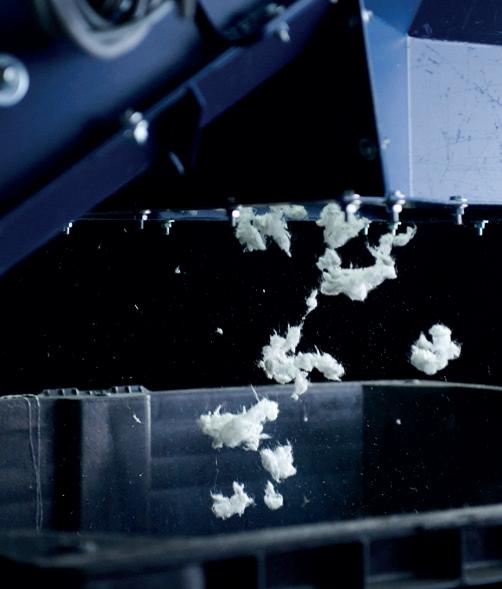
By combining proven INTAREMA® technology with a new IV Uptimiser, EREMA succeeds in processing shredded PET fibre materials heavily contaminated by spinning oils in such a way that the finest fibres can be produced again from the recycled pellets. The system, which now joins EREMA's machine portfolio as the INTAREMA® FibrePro:IV, is characterised by a longer residence time of the PET melt. This is an essential factor for achieving high quality recycled pellets, as it allows the spinning oils and other additives used to improve the handling of the fibres during manufacturing to be removed more efficiently than in conventional PET recycling processes. Following extrusion, by polycondensation the intrinsic viscosity (IV) of the PET melt is increased in
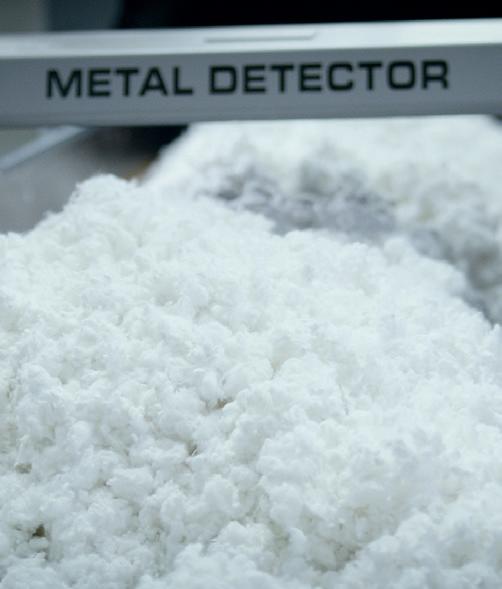
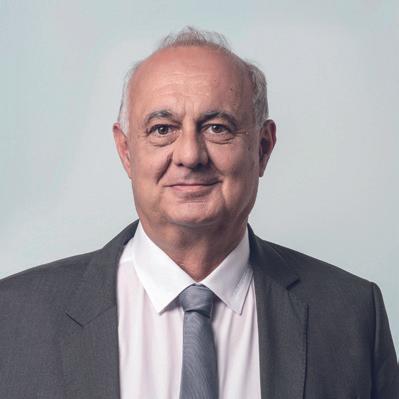
» EREMA drives the topic PET fiber-to-fiber recycling with strong solutions. This is important for the circular economy of today. And: an important milestone for the textile recycling of tomorrow.
Wolfgang Hermann
Business Development Manager
Application Fibres & Textiles EREMA Group
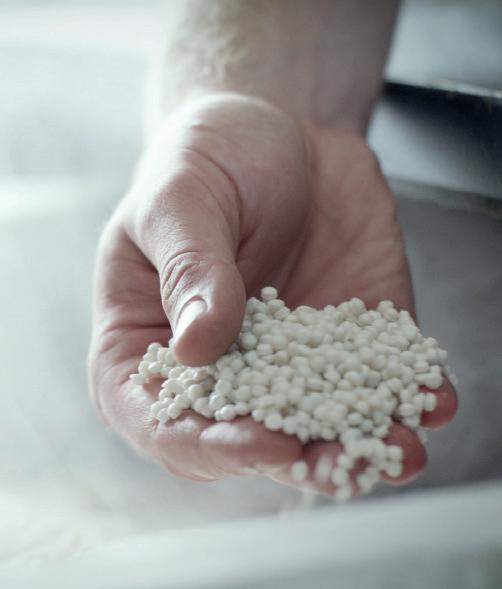
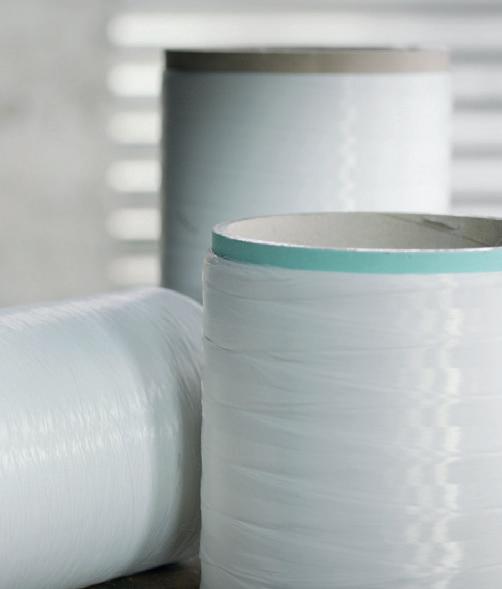
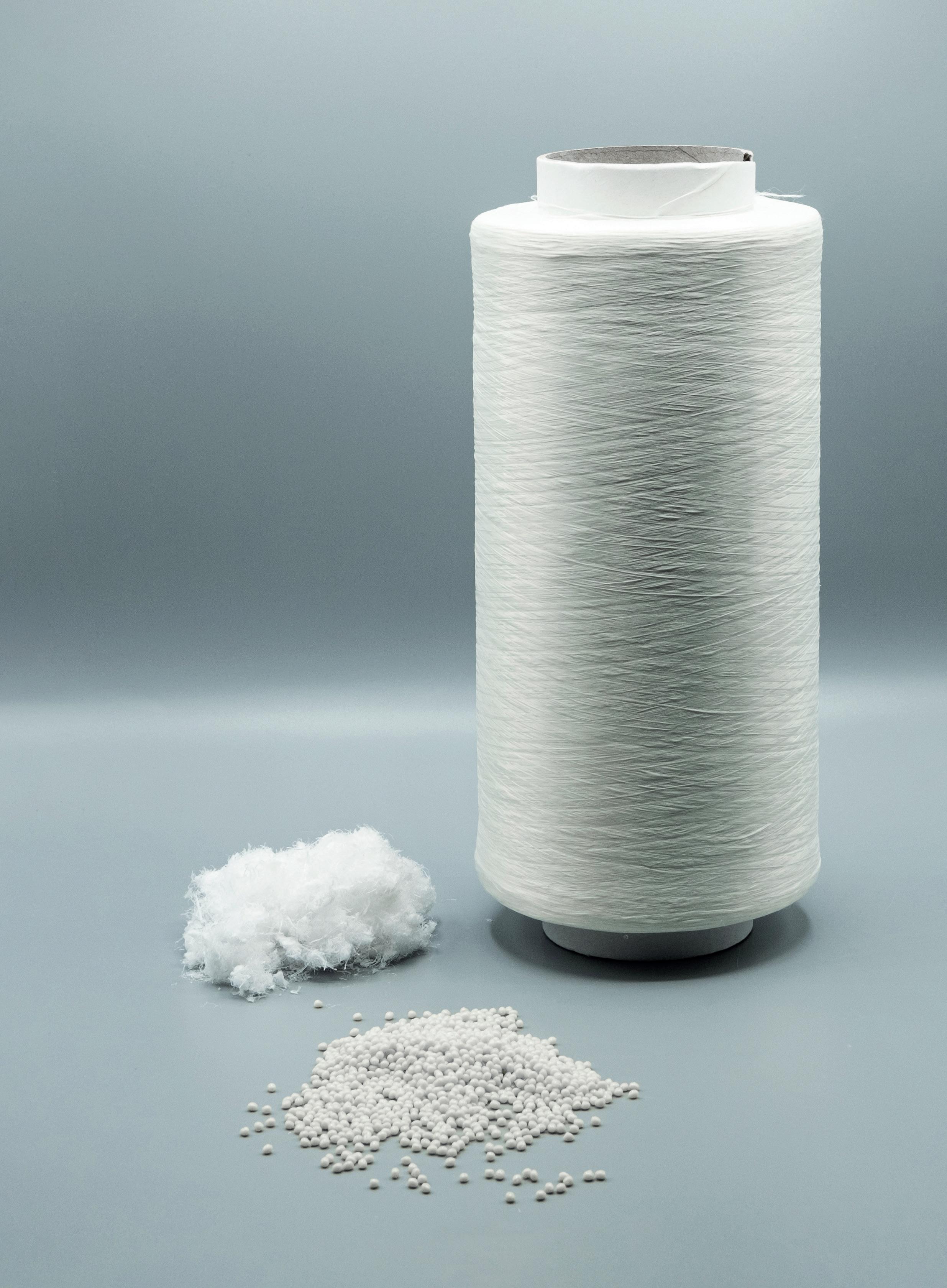
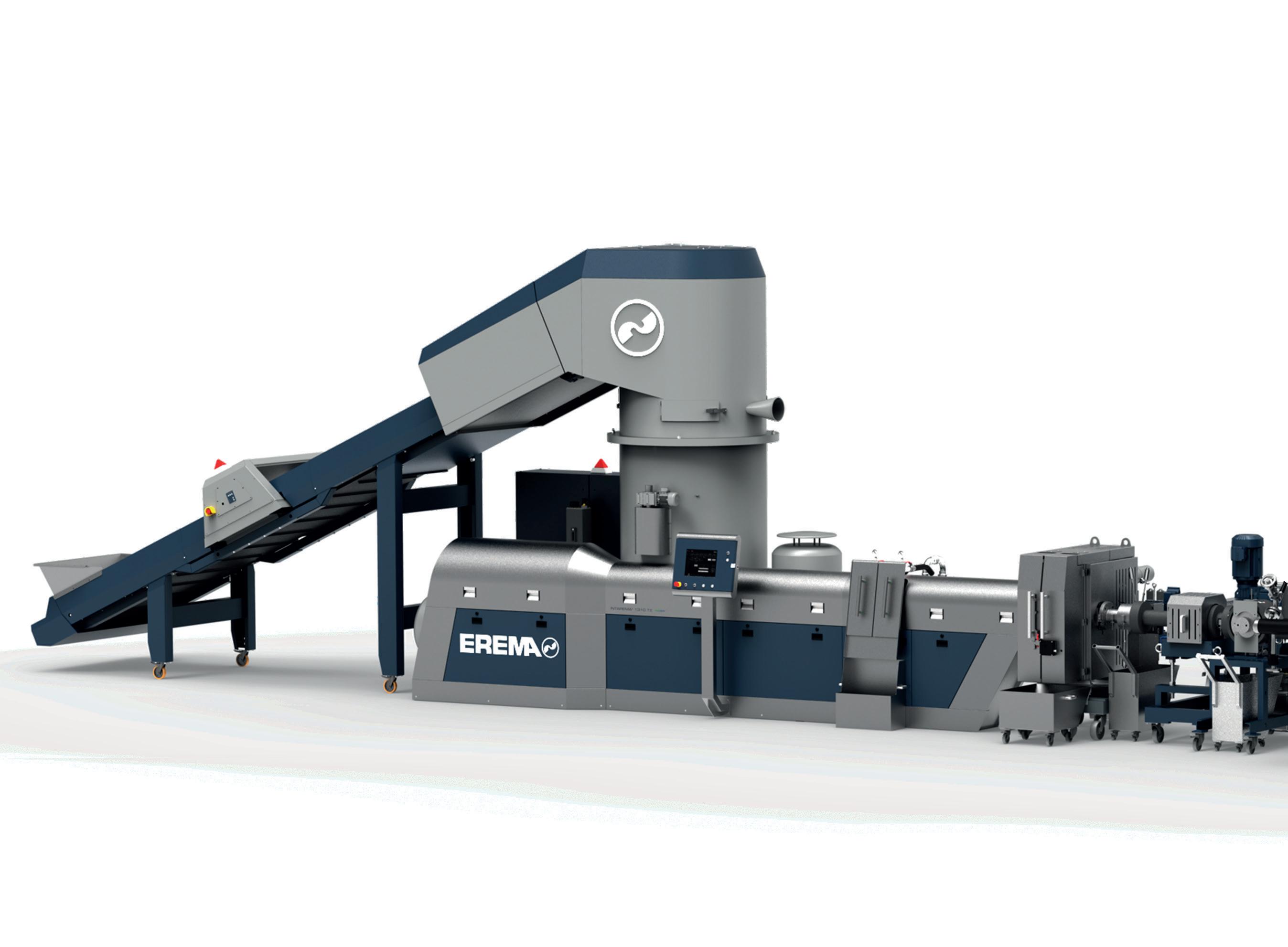
the new IV Uptimiser and under high vacuum to the precise level that is needed for fibre production. "Including filtration the output quality that we achieve with this recycling process is so high that ultra-fine fibres of up to 2 dtex can be produced using these rPET pellets, with an rPET content of 100 percent," says Markus Huber-Lindinger, Managing Director at EREMA. Waste PET fibre from production processes can therefore be
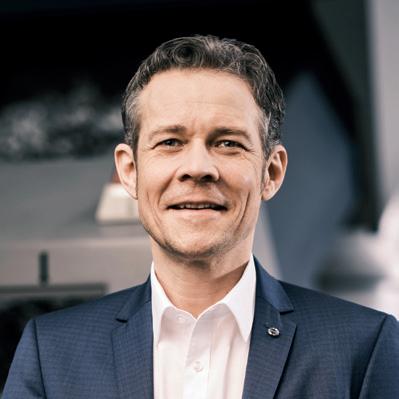
further processed into rPET filament fibre, carpet yarn and staple fibre.
While the focus of the fibre and textiles application is currently still on PET fibre recycling, EREMA is committed to driving forward the recycling of mixed fibre materials from classic textile recycling collection in a next project phase. In order to accelerate development
work, the EREMA Group opened its own fibre test centre, where a cross-company team is working on recycling solutions for fibre-to-fibre applications. The so-called Fibre Recycling Centre also operates a fully equipped and variable industrial-scale recycling plant. It includes the peripheral technology required and is available to customers for trials.
» Including filtration the output quality that we achieve with this recycling process is so high that ultra-fine fibres of up to 2 dtex can be produced using these rPET pellets, with an rPET content of 100 percent.
Markus Huber-Lindinger Managing Director at EREMA
tailored to the requirements of the fibre industry efficient removal of spin finish and additives (spinning oils, texturiser oils, etc.) optimises and increases intrinsic viscosity (IV value) to the required level during the melt phase repolymerisation
INLINE VISCOMETER control / setting the target viscosity
Granulation and filling into big bags
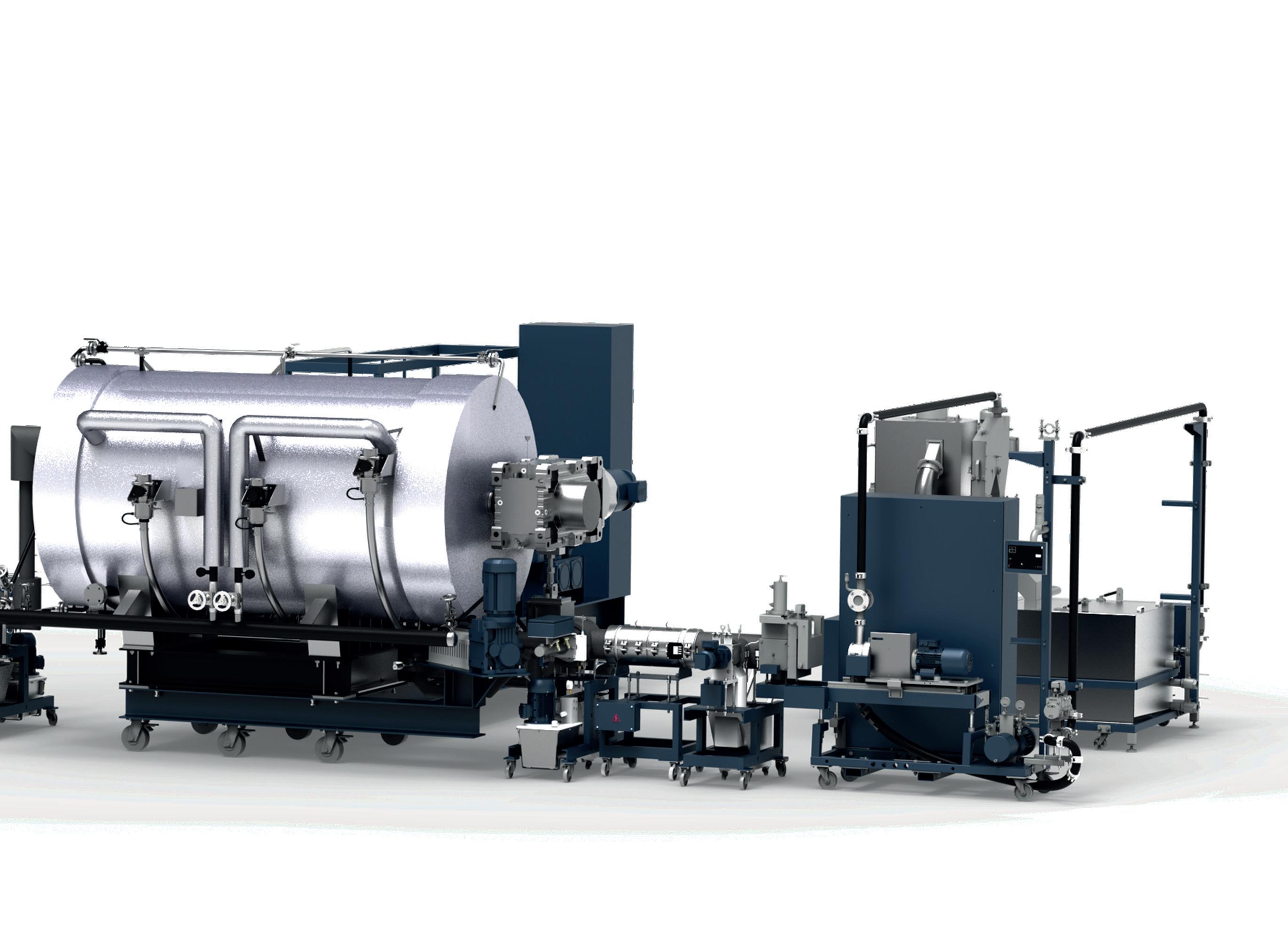
Ultra-fine filtration (20 µm): Depth filter necessary for subsequent spinning process
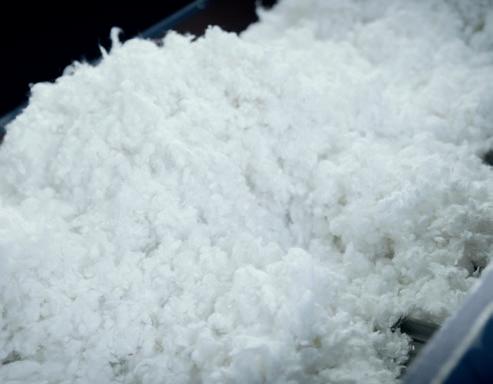
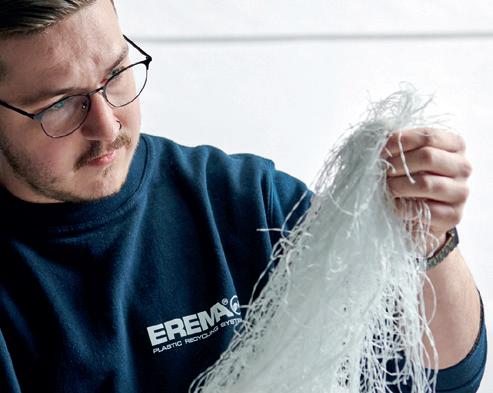
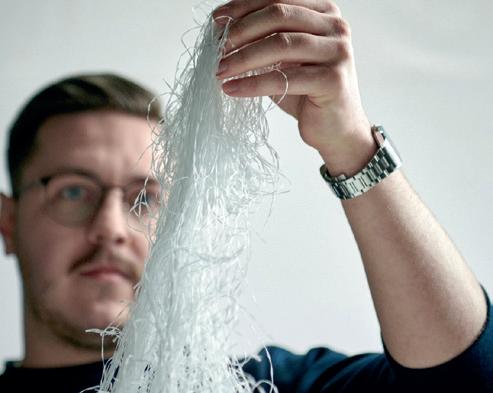
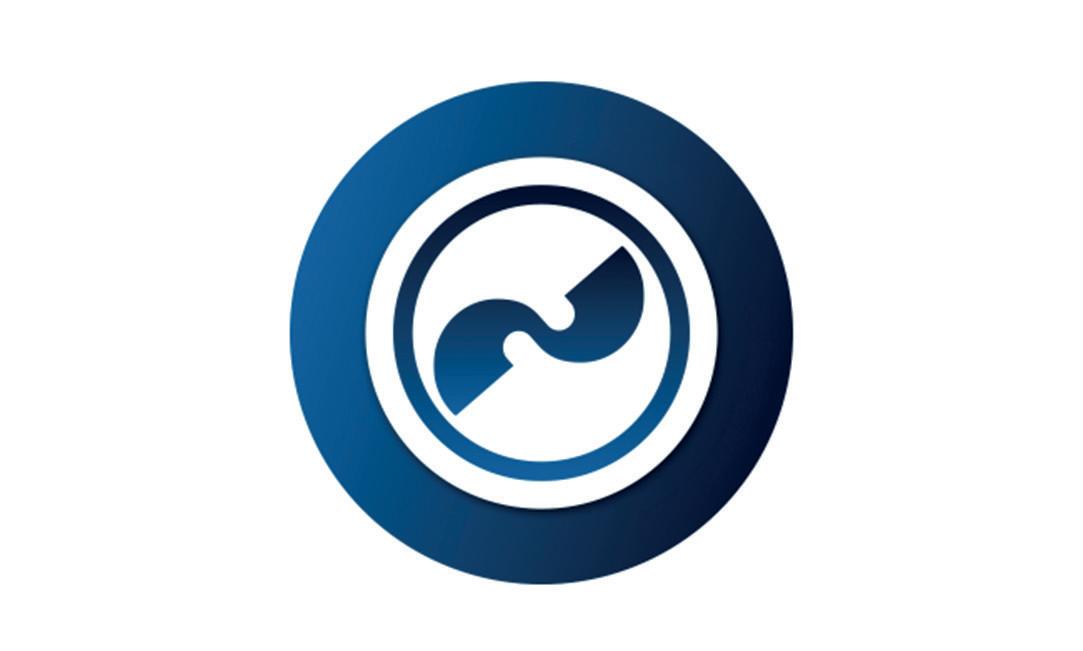
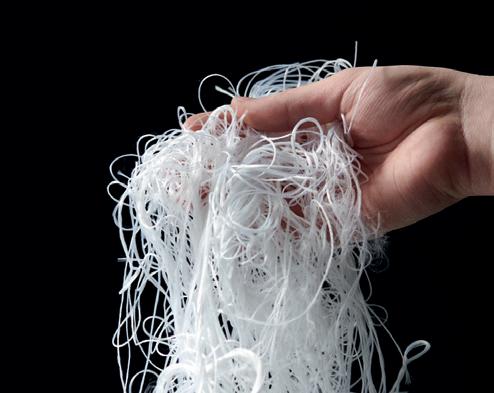
At the state-of-the-art EREMA Fibre Recycling Centre in Austria, customers can use a selection of PET fibre recycling machines and technologies for trial runs with own test materials. The tests are carried out in realistic production conditions and therefore provide the results needed to optimise the specific machine configuration – tuned precisely to the customer application.
BASIC TEST RUNS: 1 tonne of PET fibre material
FULL-LOOP TEST RUNS: from 3 tonnes of PET fibre material
OUTPUT RATE: 350 kg/h

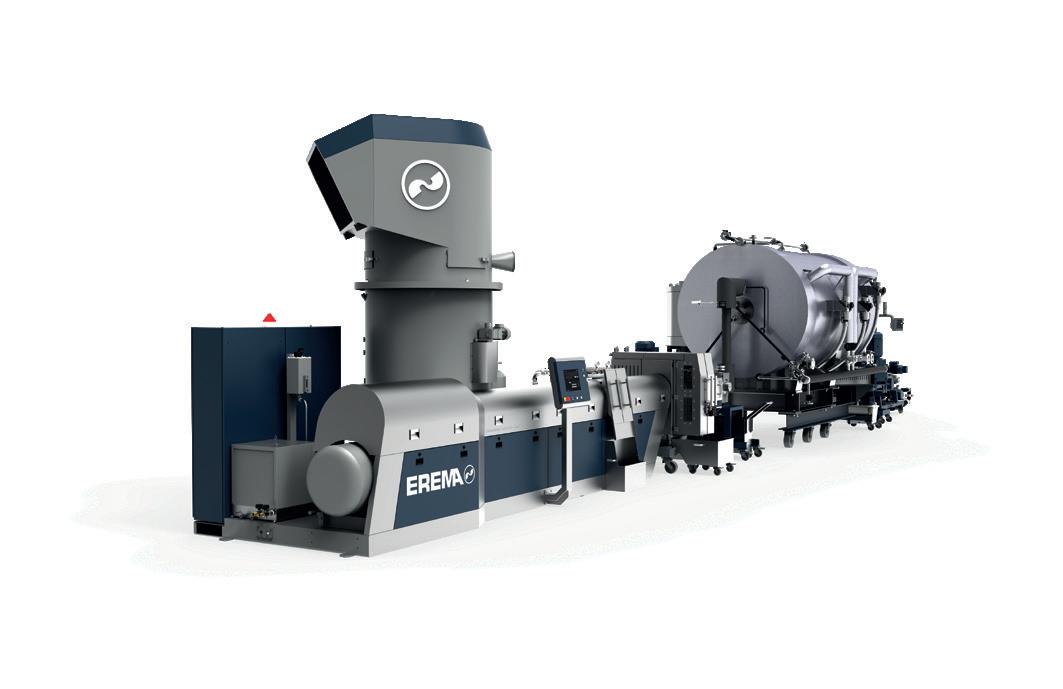
That is the total surface area of the largest EREMA laser filter system. The LF 2/406 Quattro four-fold filter, for example, reliably removes impurities from the melt in the XXL-INTAREMA® 2325 (see report on page 14/15).
7,800 cm2
-22 MELT TEMPERATURE °C
When recycling DSD 323-2 (flexible PE and PP household waste), the new INTAREMA® 1108 TVEplus® DuaFil® Compact reaches a melt temperature upstream of the second filter unit that is around 22 degrees Celsius lower, with around 11 percent lower specific energy consumption (kWh/kg) and around 14 percent higher throughput compared to the previous EREMA solution.
One of EREMA's innovations in filtration technology is the 2/406 size of laser filter. Compared to the 2/356 laser filter, it has a 50 percent larger screen area.
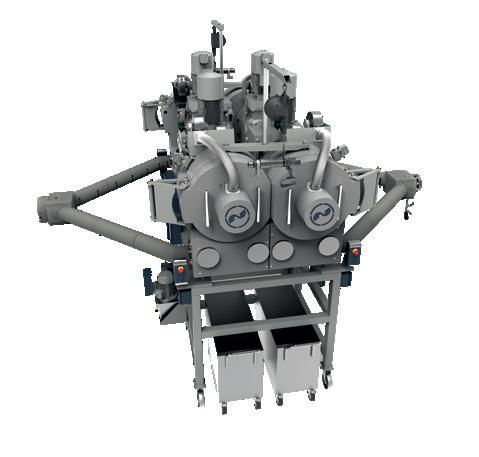
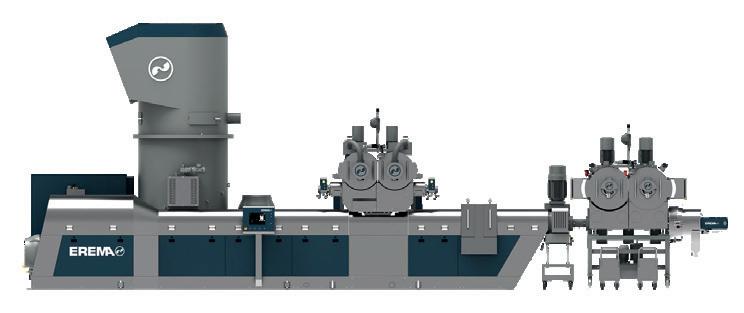
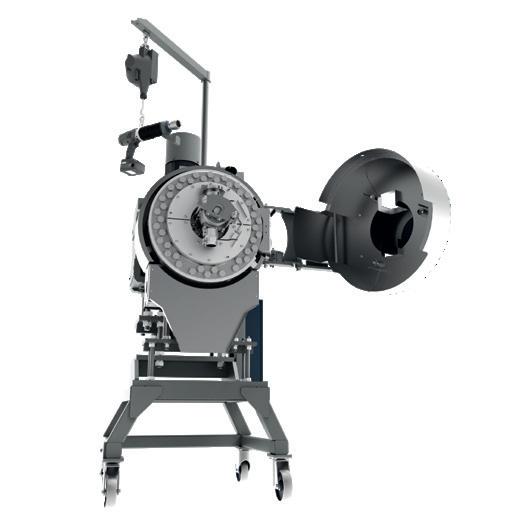
50 %
In total, the INTAREMA® TVEplus® DuaFil® Compact has a 12 to 33 % (depending on the speed) higher degassing volume available compared to the previous EREMA double filtration solution.
33 %
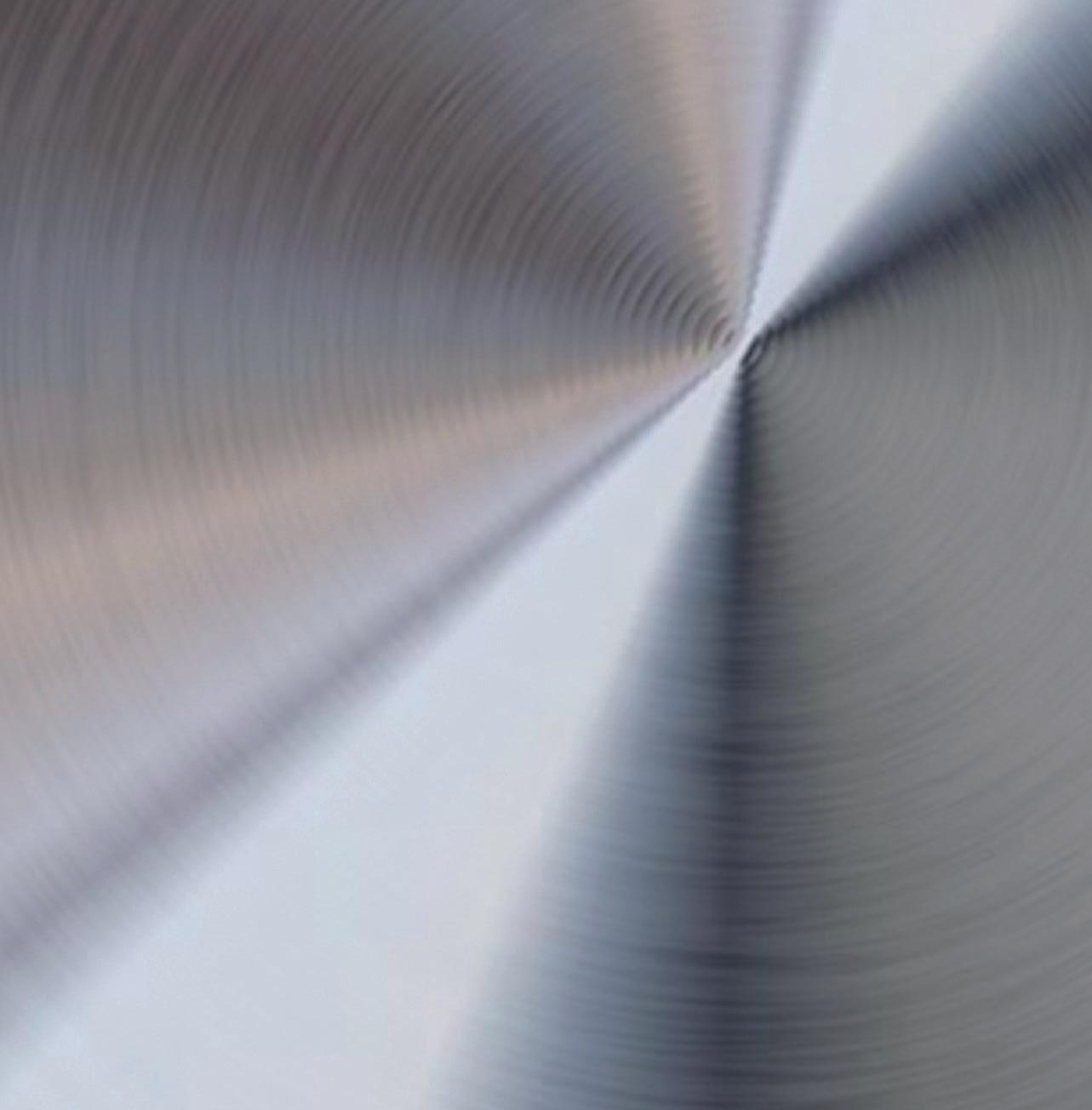
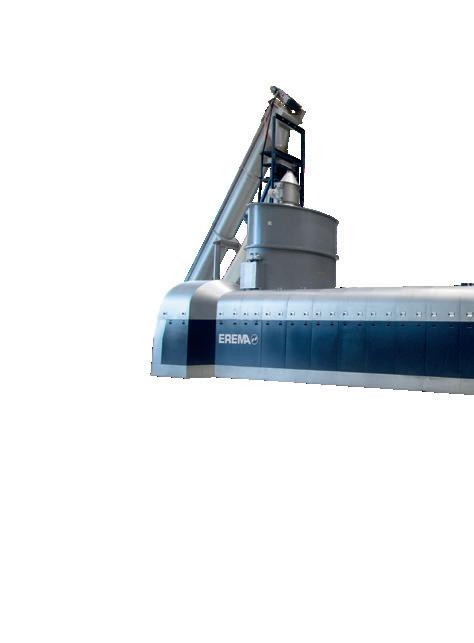
F I G U R ES
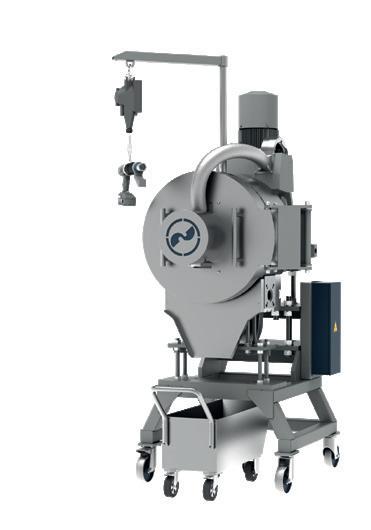
%
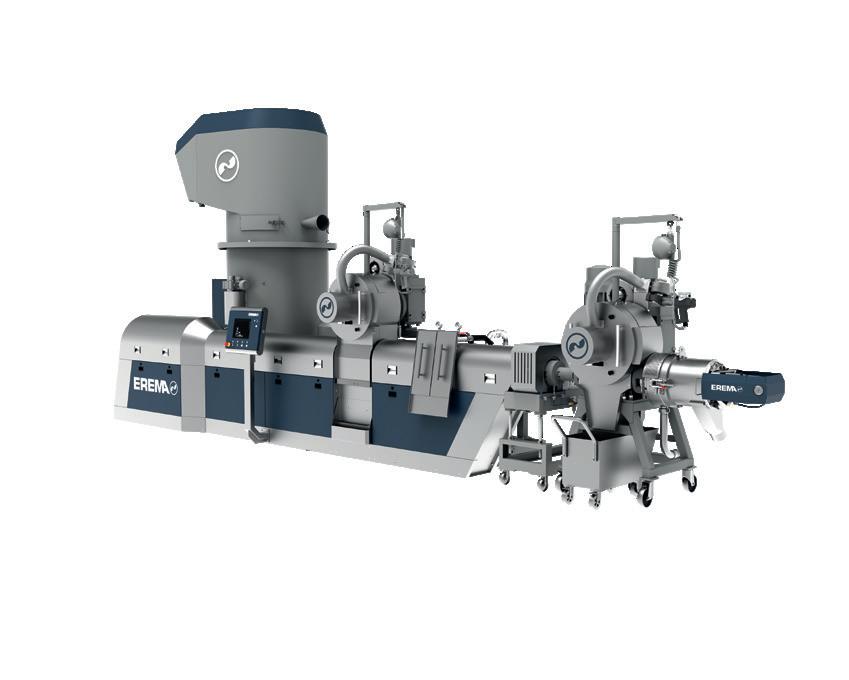
Even performancemorewith our digital assis- tance systems!
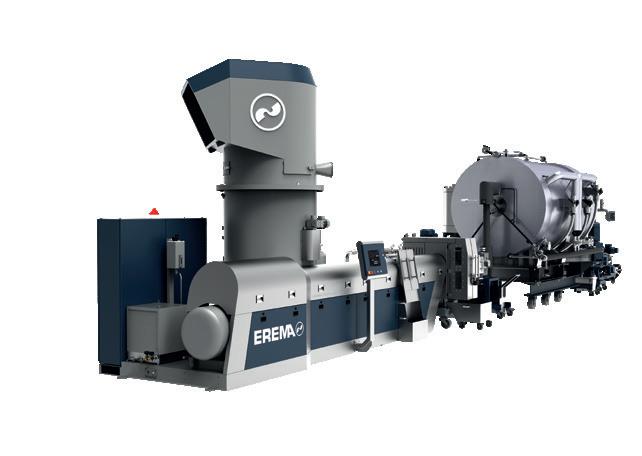
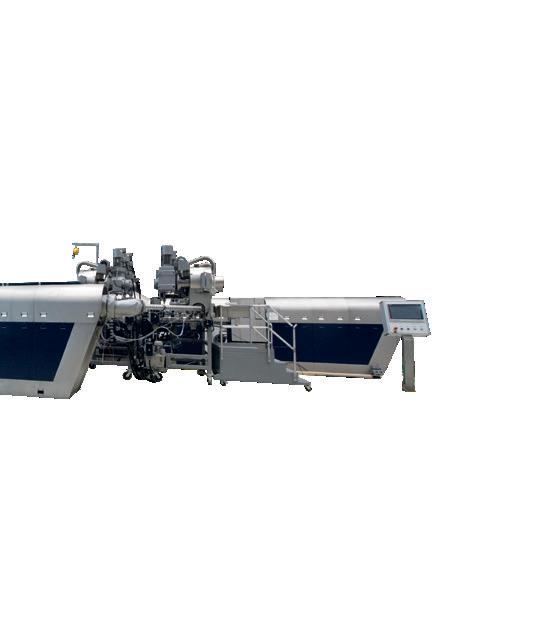
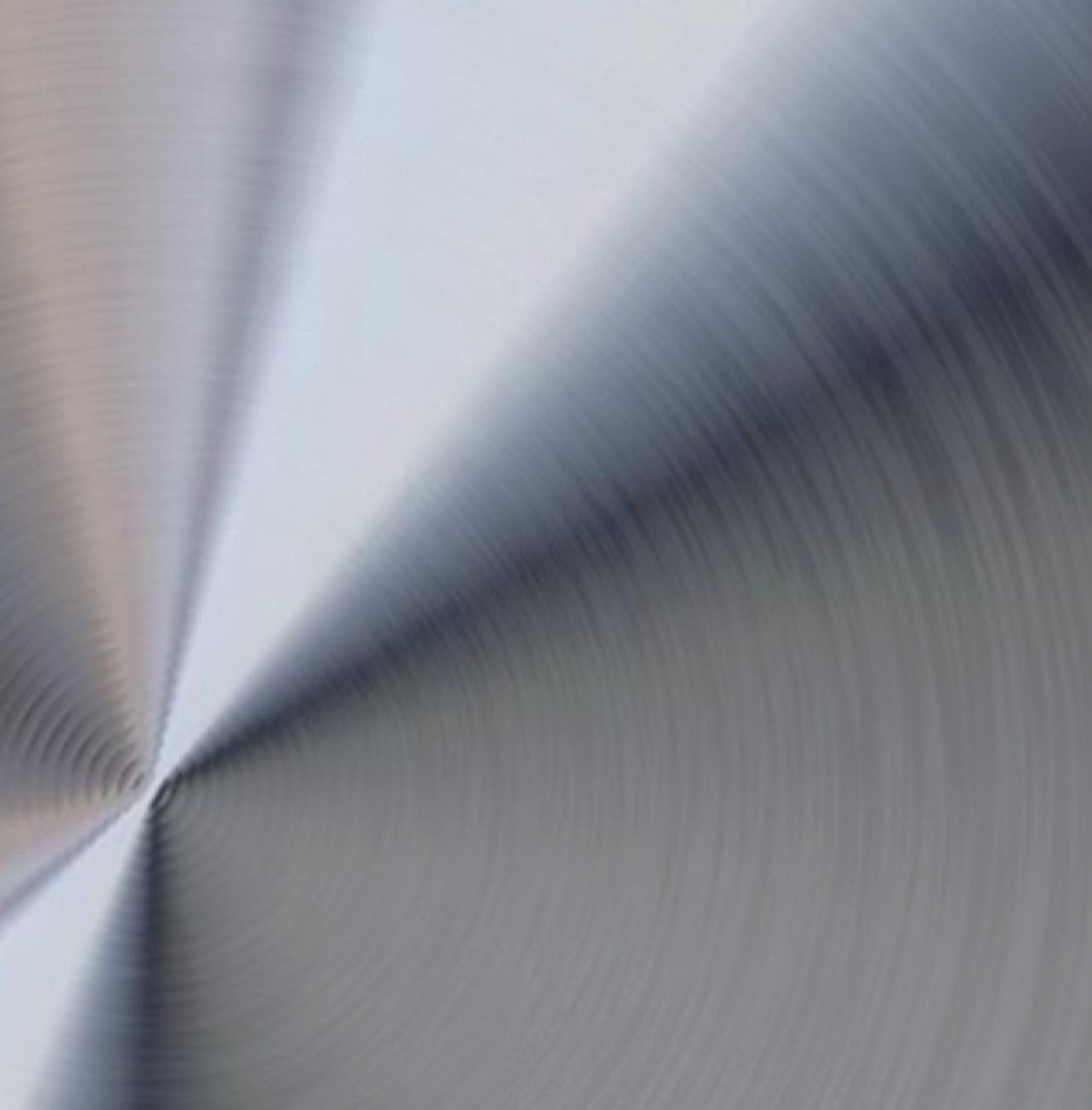
Easier operation, more automation – the new EREMA DischargePro laser filter control achieves up to 50 % lower melt loss during filtration compared to the previous laser filter control, depending on the application, material, as well as the type and level of impurities.
10
Thanks to the compact configuration of the machine, the extruder screw is 10 L/D (length-to-diameter ratio) shorter compared to the previous EREMA double filtration solution, and there is no longer a need for the discharge metering zone.
100% rPET
Thanks to its especially gentle material processing and the efficient removal of spinning oils, the rPET produced by the innovative INTAREMA® FibrePro:IV PET fibre-to-fibre recycling system can be used in proportions of up to 100 percent for the production of very fine fibres.
That is the height of the top edge of the extruder cover on the largest polyolefin recycling machine ever built by EREMA, an INTAREMA® 2325 T-VEplus.
> POLYKAR EXPANDS RECYCLING CAPACITIES IN NORTH AMERICA WITH EREMA TECHNOLOGY <
Recycling plastics in a way that is both economically successful and makes ecological sense is something that was hardly imaginable for many just a few years ago. EREMA in Austria – like the sustainable packaging manufacturer Polykar in Canada – became a pioneer in its field through its early entry into plastics recycling.
The two companies crossed paths in 2007 at the customer centre of EREMA North America (ENA) in Ipswich, MA, when Polykar founders Elyse Damdjee and Aziz Karim expressed the desire to see an EREMA plant in operation and check out the recycled pellets it produced during a trial run. "During this visit we were able to demonstrate the performance of our recycling machines and the excellent level of service we provide. That was the start of a partnership that is still going strong today," says former ENA CEO Mike Horrocks.
Amir Karim, President and CEO of Polykar, took over the company, founded in 1987, and spent the last two decades turning his once garbage-bag family business into a sustainable-packaging powerhouse. The product range focus areas are: polyethylene film for converters, garbage bags, certified compostable bags and food and industrial flexible packaging. A circular approach to packaging has always been key for Polykar who continues to engage in partnerships with global polyethylene suppliers and end users to recycle and reuse recycled packaging, giving the material a second life.
Polykar began recycling post-industrial and post-commercial PE film following the purchase of their first EREMA T recycling system, which was commissioned one year after their visit to ENA. That was followed by an EREMA TVE system in 2011, and in 2014 the company was one of the world's first to use the new INTAREMA® TVEplus® recycling
system with SW RTF melt filter, which had only recently been brought on to the market, making Polykar one of the most modern and efficient flexible film recycling plant operating in the province. That was the first generation of equipment that featured the newly developed and worldwide patented Counter Current technology. This innovative concept saw EREMA set a milestone in mechanical plastics recycling, because the optimised
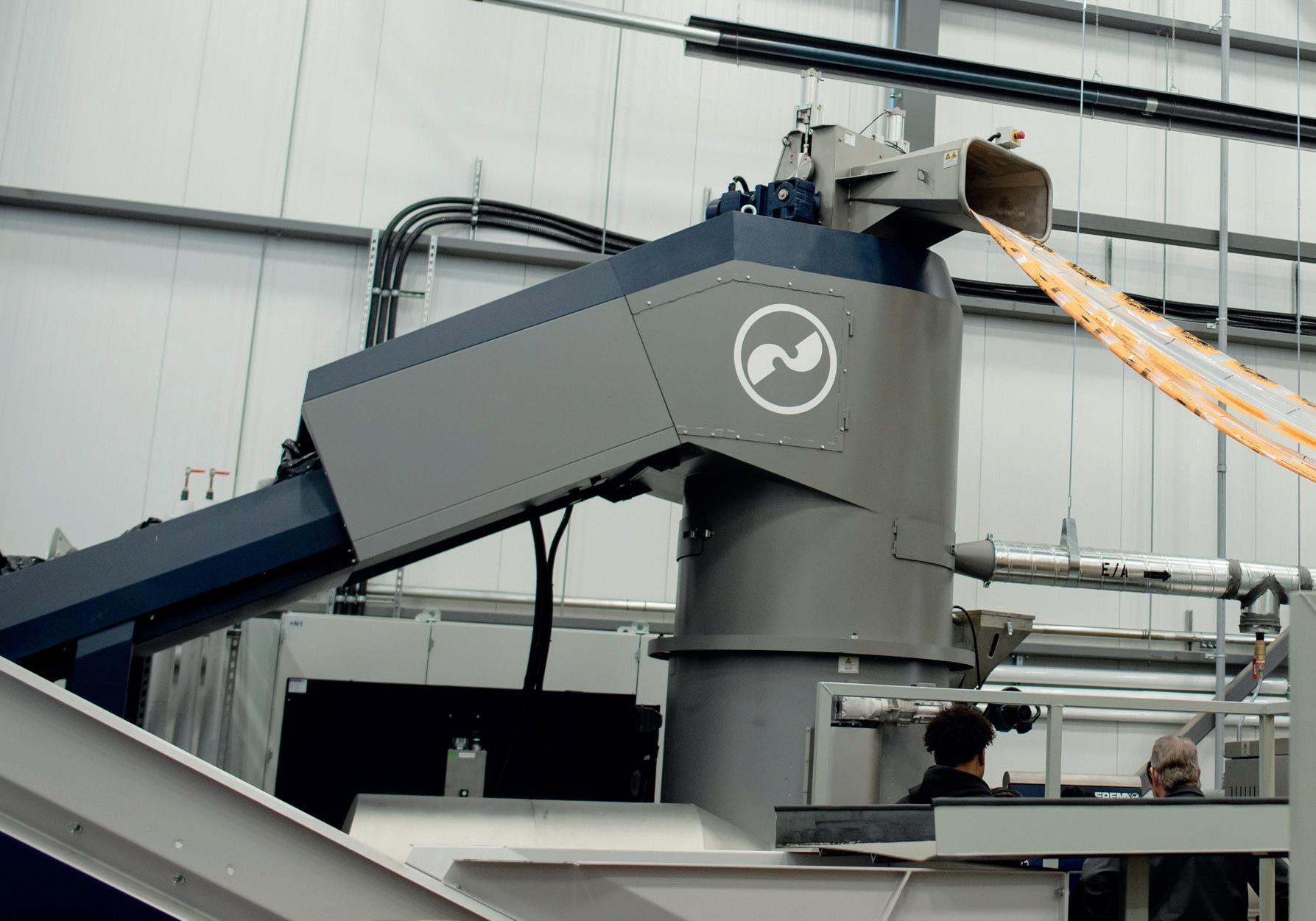
material feed from the Preconditioning Unit into the tangentially aligned extruder enables it to take up more material in less time. Inside the Preconditioning Unit, the material rotates in the opposite direction to the extruder, which means that the optimum temperature range of the material entering the extruder is much wider and the output rate is much higher. As a result, it provided the perfect technological support for the expansion of recycling capacity that Polykar was planning at the time, which moved to the next level in 2017. That is when the fourth recycling line went into operation in Montréal: A new INTAREMA® TVEplus ® machine with Laser Filter. Together, these four machines, paired with the fact that Polykar also purchases post-industrial and post-commercial film scrap, currently produce more than 10,000 tons of recycled pellets per year.
Polykar took its most recent step in growth in December 2022 with the opening of a new 50,000 square-foot state-of-the-art plant in Edmonton, Alberta. The new plant houses one of North America's most innovative centres of excellence for the development and marketing of flexible and compostable packaging.
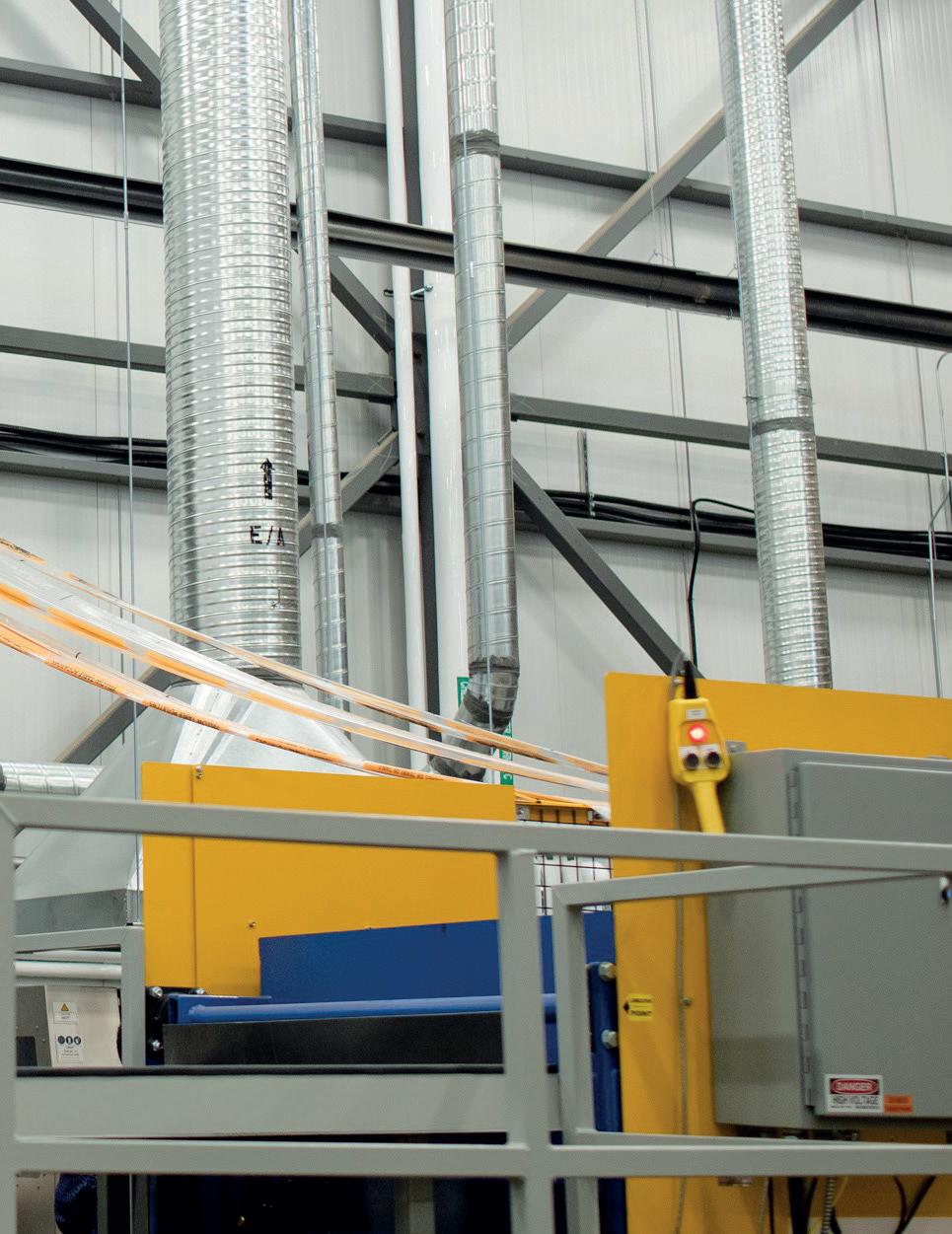
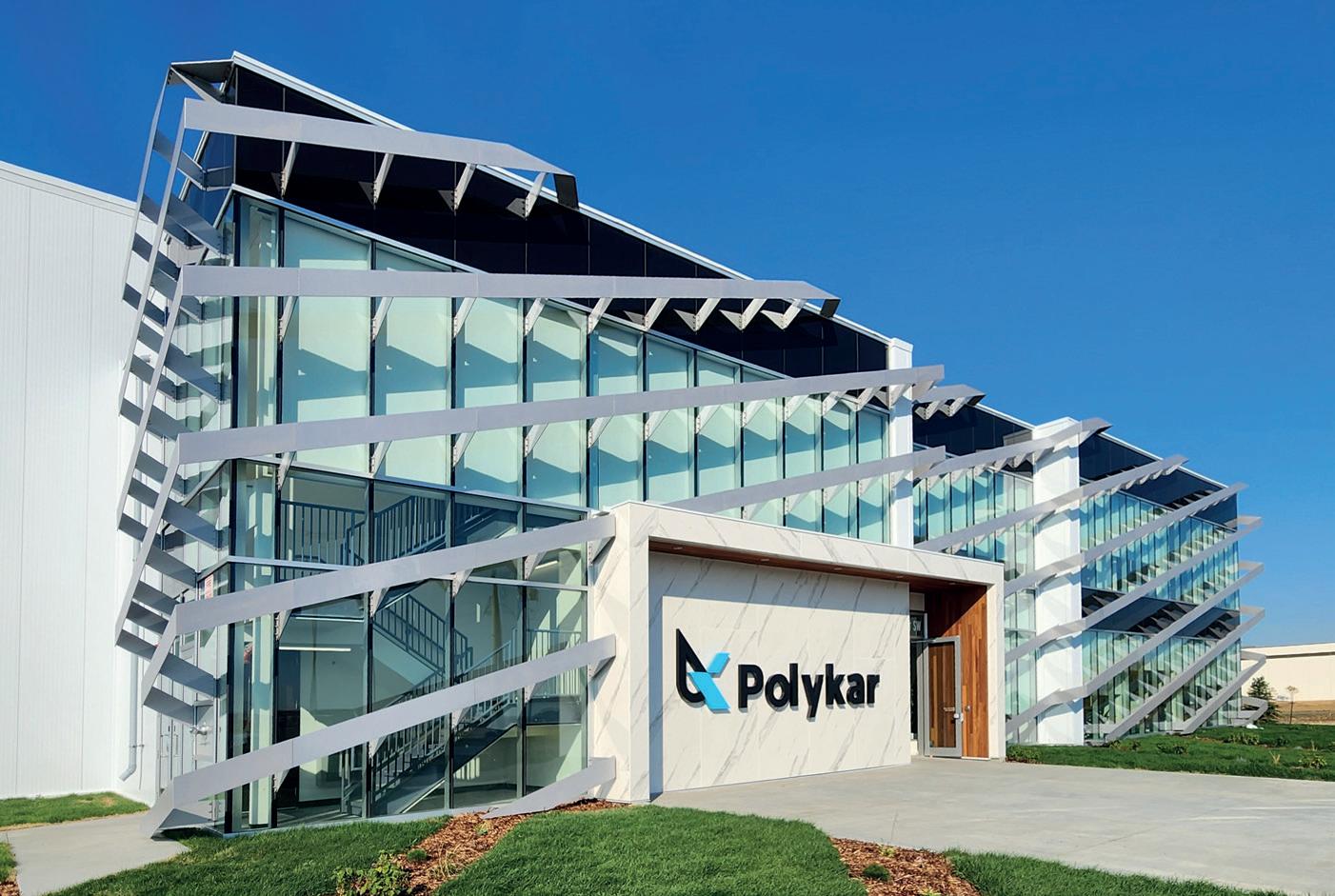
Part of the modern line-up of machinery is an INTAREMA® 1310 TVEplus® machine with backflush filter. This recycles heavily printed LDPE production and industrial waste from blown film production. Annual capacity is 4,000 tons of recycled pellets. The company is therefore making a significant contribution to the Province of Alberta's efforts to keep plastic waste out of landfills by incorporating a cutting-edge recycling facility. It has also created 50 new jobs, with the number expected to grow to 70 within the next two years.
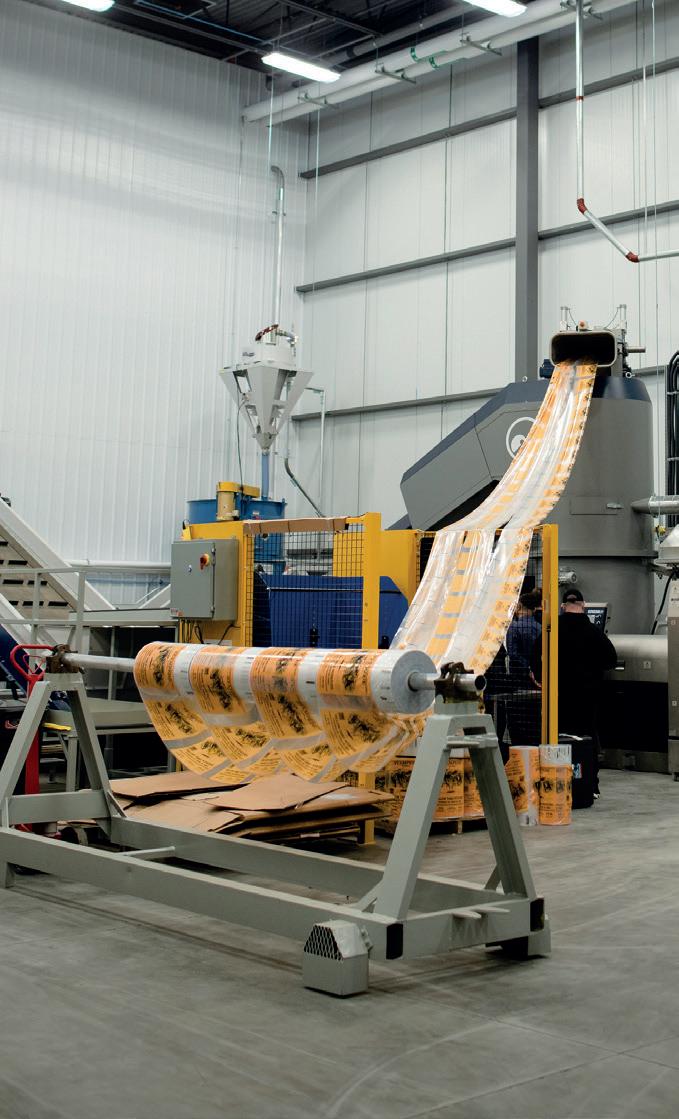
"Ever since we have focused specifically on plastics recycling, EREMA has been our innovative and reliable partner, offering top solutions for our requirements," explained Karim on why his company has kept on choosing recycling machines from the Austrian manufacturer every time it makes a new purchase. "The systems equipped with degassing and filters cope well with contamination from labels and adhesive tapes and produce highquality recycled pellets. Recycling processes that work well are the basis for reusing more
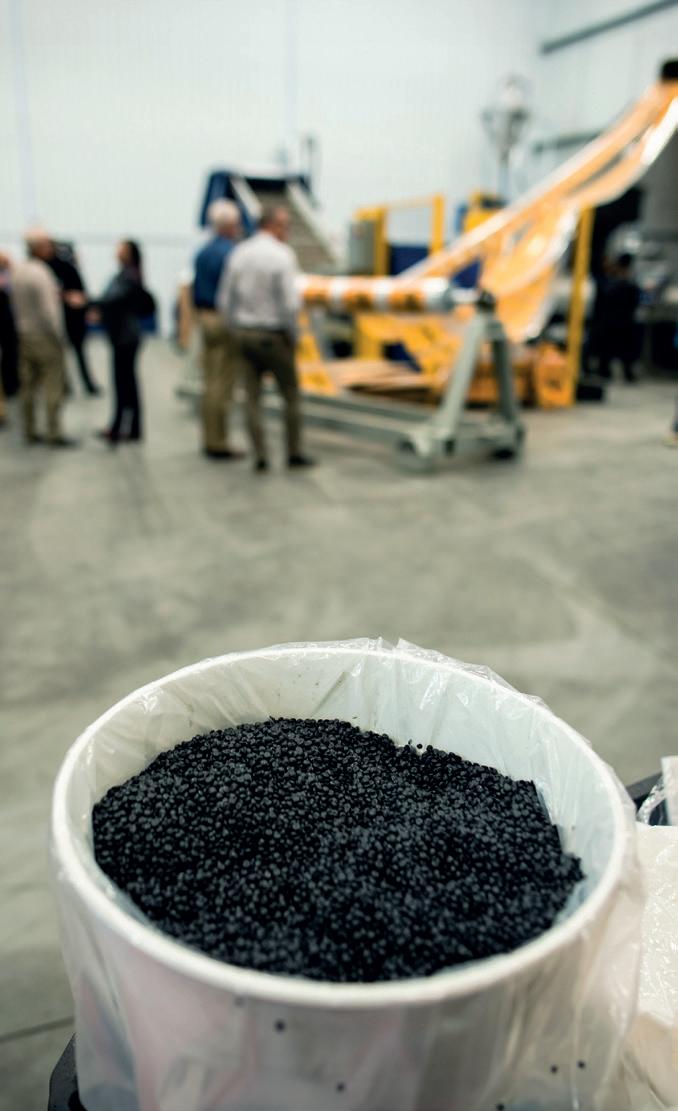
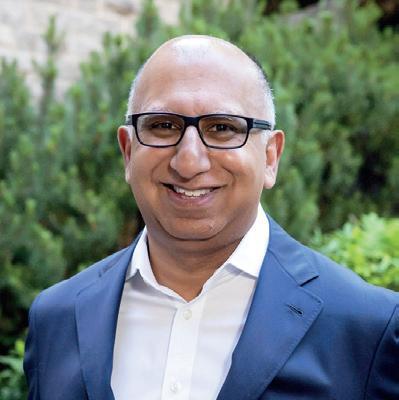
» Ever since we have focused specifically on plastics recycling, EREMA has been our innovative and reliable partner, offering top solutions for our requirements.
Amir Karim President and CEO Polykar
plastic waste and therefore less being sent to landfills. That is our goal!"
The packaging manufacturer, which was
Managed Companies designation for its overall business performance and sustained growth since 2021 has a very positive outlook. "I see it as a huge opportunity to develop a whole slew of products that can be reused in the circular economy. Our team members can
home to be recycled in-house. Introducing recycled content into some of our products is one of many examples of how we actively help advance the circular economy. It feels good to be involved in a business that is both economically successful and makes
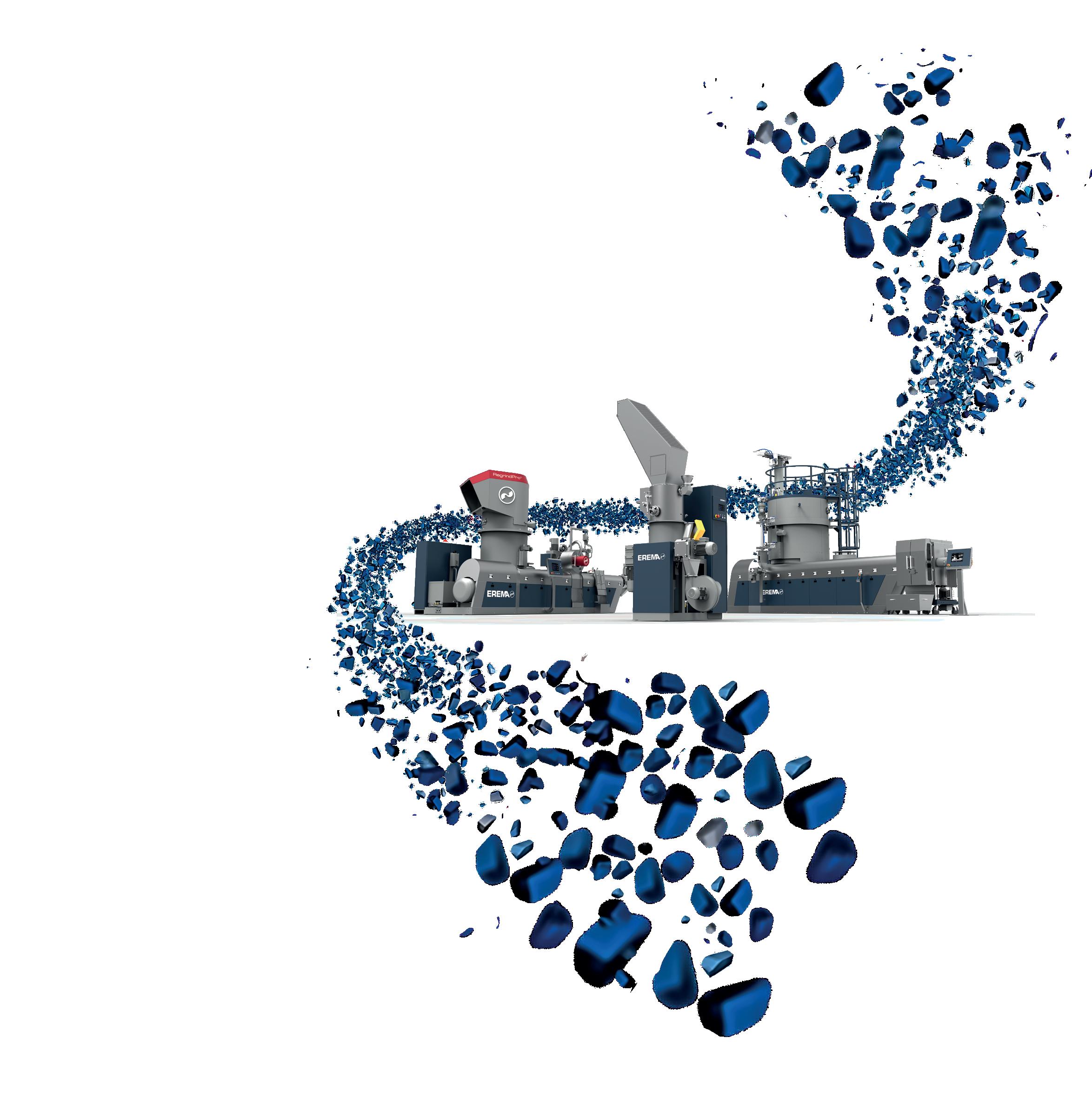
Five EREMA extruders and two Lindner Washtech lines – since 2013, the Bulgarian plastics recycling company Vadias has relied on the quality of these recycling technologies, thus making an important contribution to the circular economy.
Vadias Recycling processes LLDPE and LDPE post-consumer packaging films from household collection (yellow bag) and from the agricultural sector. These plastics are often heavily contaminated with organic material and residues from labels and aluminum foil. In 2013, Vadias started with an EREMA extruder and the first Lindner washing line with an output of 1000 kg/h. Today, the company processes 4,000 tons of raw material and produces around 2,850 tons of pellets per month.
"Our EREMA extruders have been part of the recycling process from day one. Since 2019, they are also being used at the Vadias production site in Serbia, which, since 2022, is operated together with a Lindner shredder and Lindner wash components. We are always happy to see just how successful our customers are with our processes and products", says Clemens Kitzberger, Business Development Manager Post Consumer Recycling at EREMA Group, who is proud of this long-standing partnership.
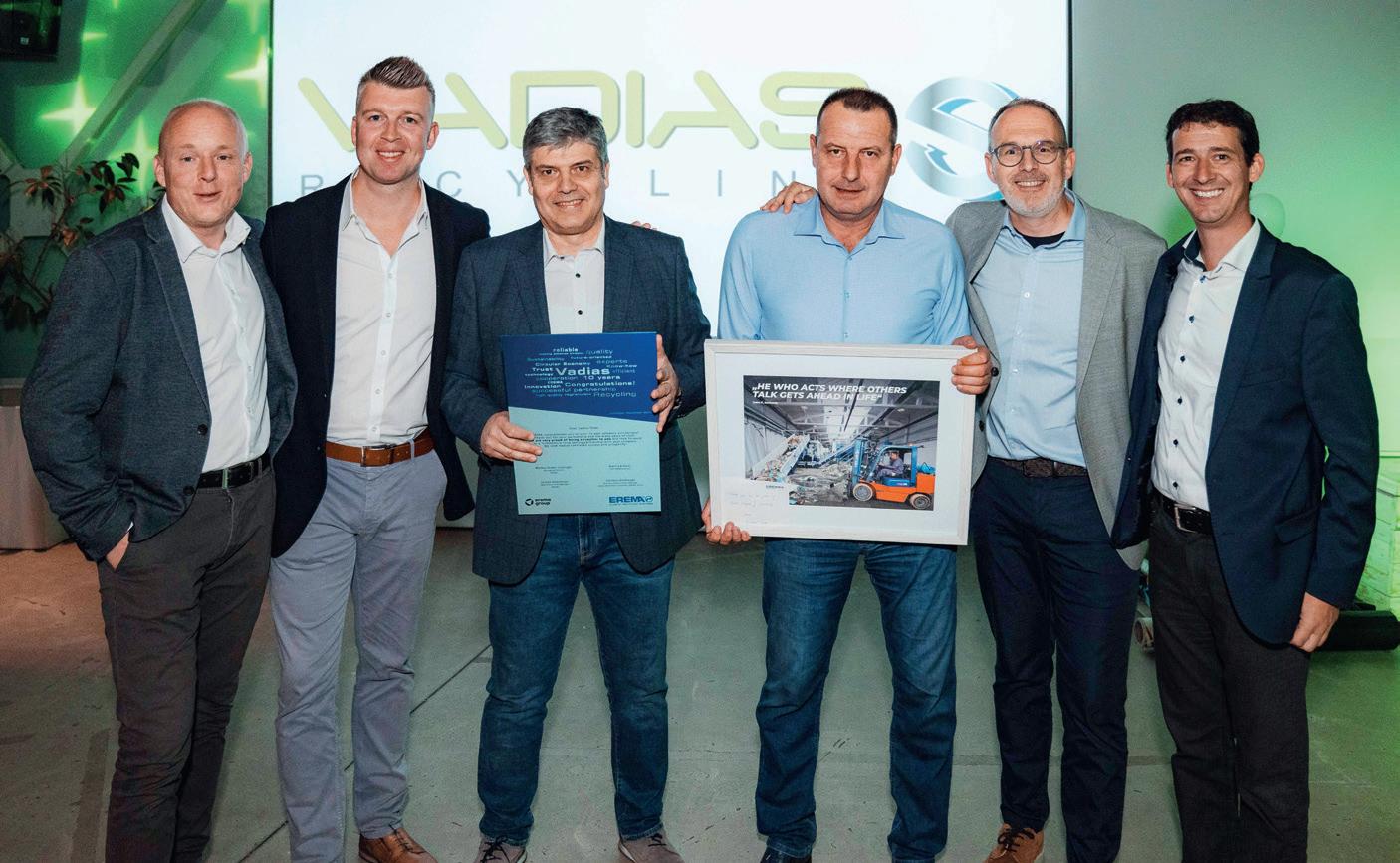
In August 2023, the EREMA Group and Lindner Holding founded BLUEONE Solutions with the common goal of aligning plastics recycling processes with their shared requirements. This combines the know-how of EREMA, the market leader in extrusion, with
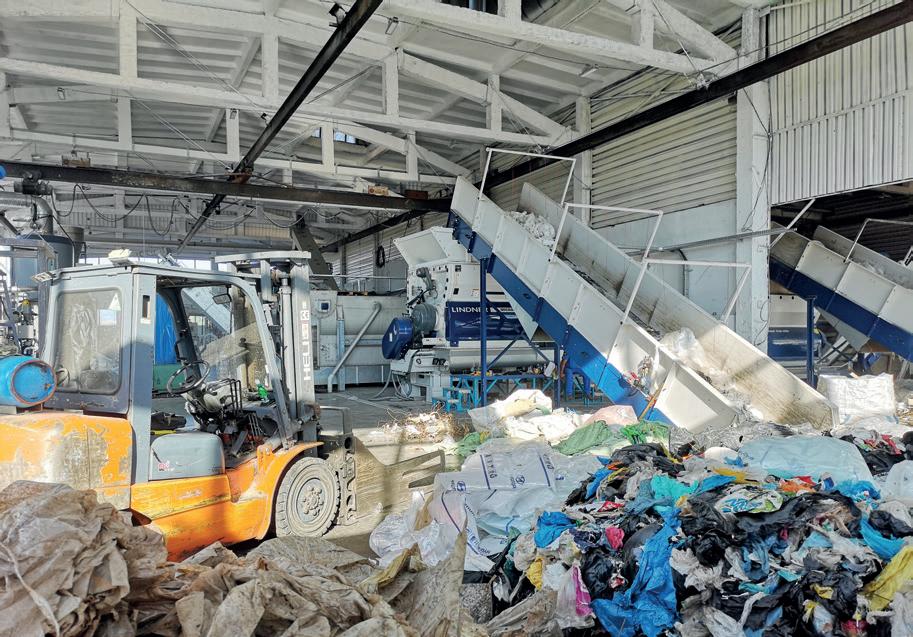
the experience of Lindner, the quality manufacturer of recycling technology – a partnership that Vasil Asparouhov, former Managing Director of Vadias, appreciates: "With Lindner Washtech and EREMA, we put our trust in two brand manufacturers from the word go, and we would certainly do so again from today’s point of view."
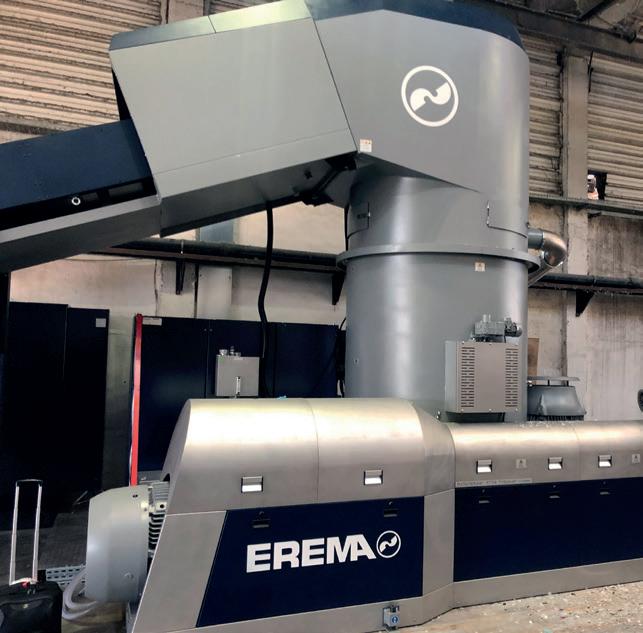
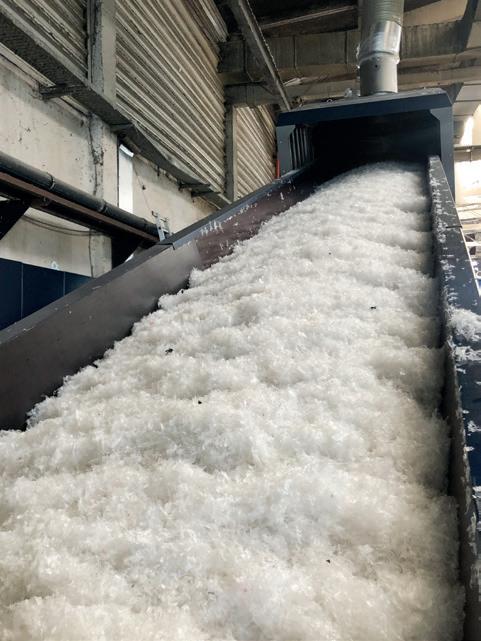
>
A closed-loop solution for plastic fibre waste from fishing, shipping and agriculture – this is the challenge accepted by Healix, a cleantech startup founded in Maastricht (NL) in 2021. Marcel Alberts knows what he is talking about when he describes this challenge. That is because the company's founder and CEO has a great deal of experience in manufacturing and distributing high-performance fibres, most recently as founder and managing director of a well-known producer and supplier of high-strength industrial yarns for ropes, cords, conveyor belts, geotextiles and of high-performance fibres for many other special applications.
The founding of Healix was a matter close to Marcel Alberts' heart.
"I want to contribute to a circular solution for this type of plastic waste that otherwise pollutes the sea or ends up in landfills. It's fair to say that the Corona crisis helped me turn this project into reality," says Marcel Alberts, explaining how he came to sell a majority share of his company and invest in a new project focused on recycling.
"I had more time to think and was keen to build something up again. Following intensive discussions with former customers, suppliers and partner companies, I realised that recycling plastic fibres is still a missing link in the value chain in many areas." This is also the view of the companies Healix already has on-board as customers, including the Tama Group, manufacturer of ropes and
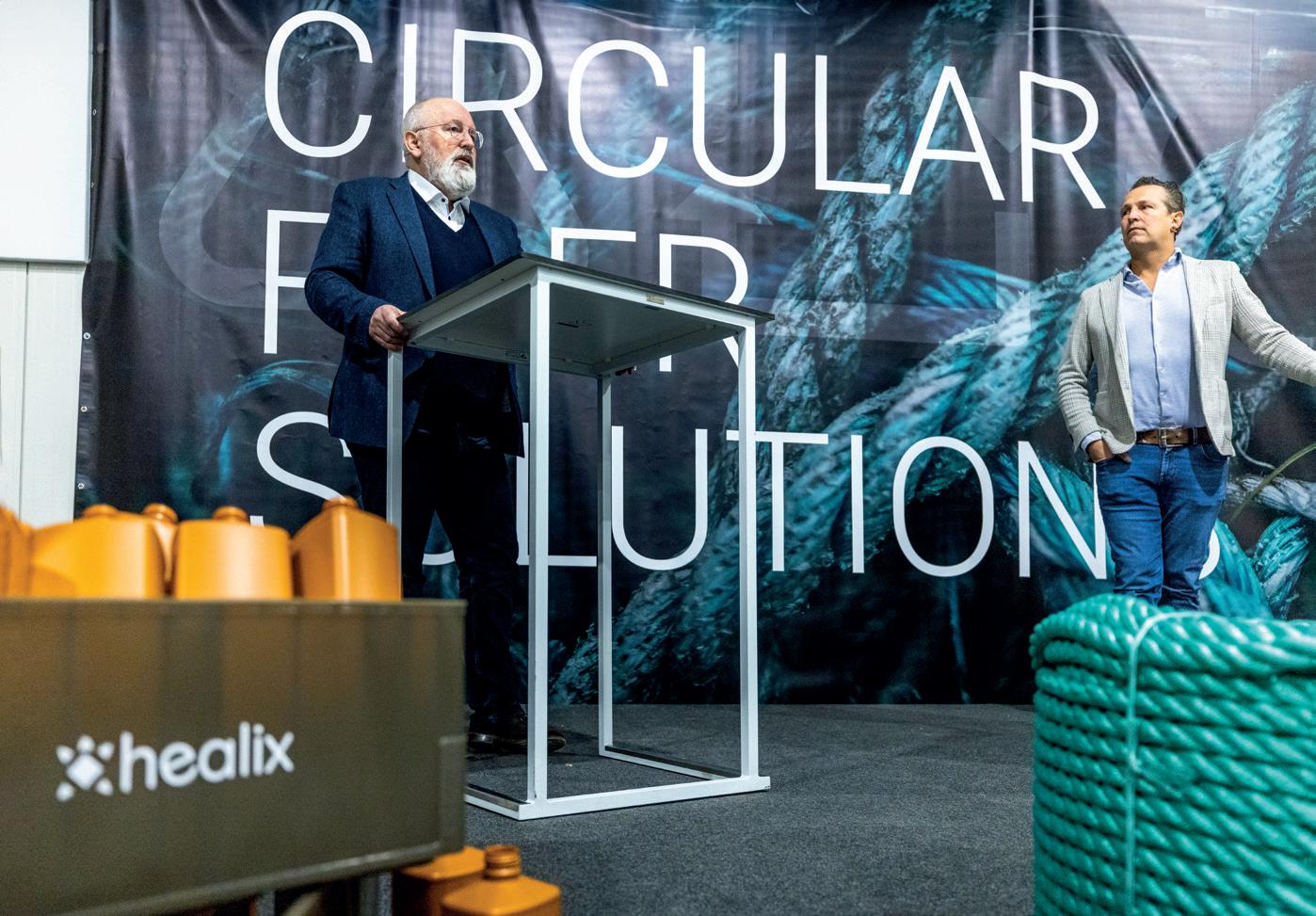
cords for farming, LC Packaging, producer of flexible transport packaging, the Hendrik Veder Group, a supplier of maritime fibre rope solutions and The Ocean Cleanup, a Dutch initiative to rid the oceans of plastic waste. Ohad Peled, Raw Materials Technical Manager in the Tama Group, confirms their perspective: "We are always looking for innovative solutions to reduce the proportion of virgin materials in our products and to further increase the use of recyclate in our production processes. That's why we're working with Healix."
At its site in Maastricht, the company now collects, sorts, shreds, washes and processes used PP and HDPE ropes from fishing and farming, with the aim of turning them back into a raw material for useful new products. An EREMA INTAREMA® 1714 TVEplus® recycling machine with double filtration proved to be the technological enabler following trials with systems from several plant manufacturers. "This machine proves itself in all applications where the best filtration and degassing performance are required due to the input material," explains Robert
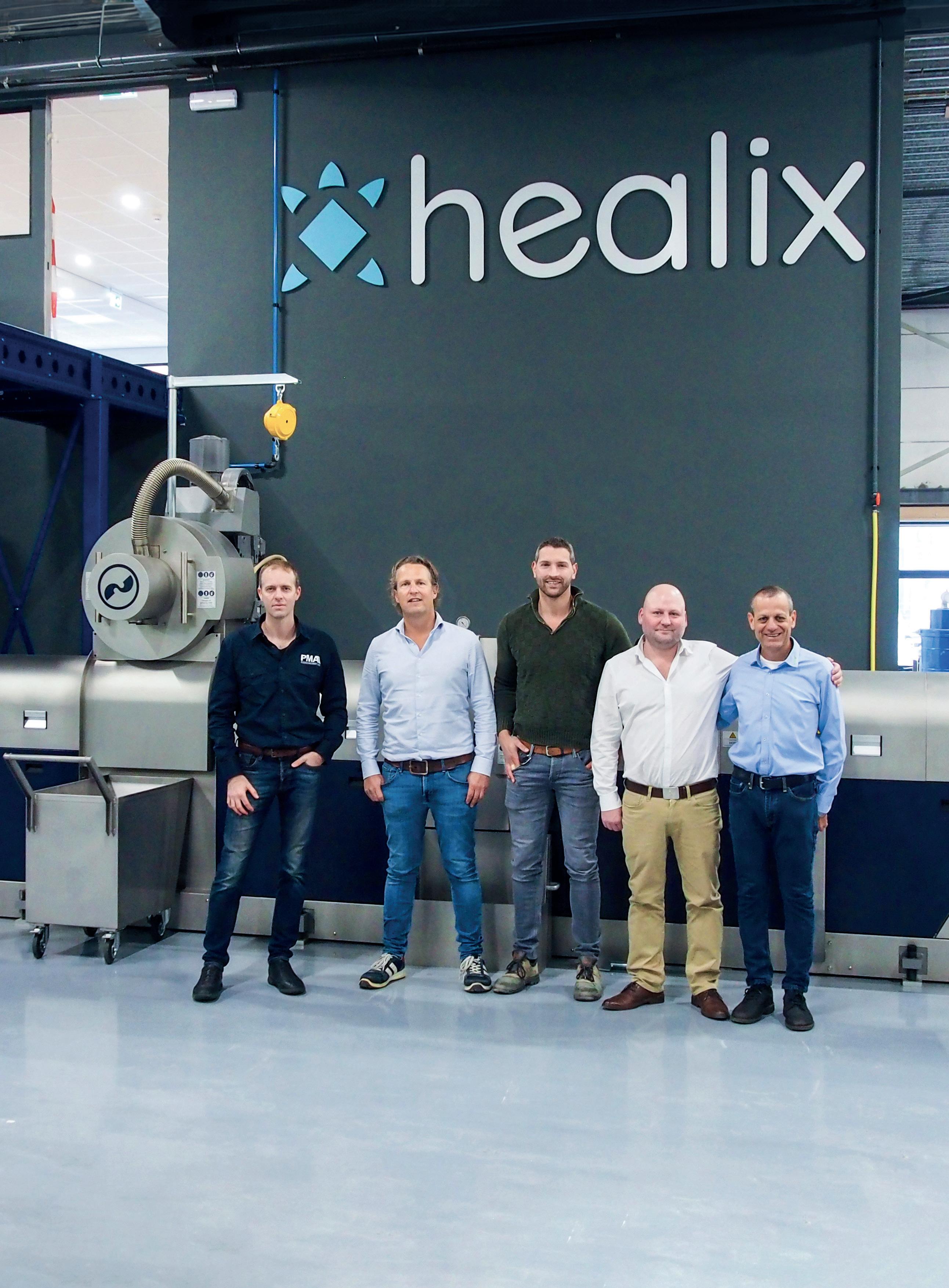
» Starting Healix was a project close to the heart for me because I want to contribute to a circular solution for this type of plastic waste that otherwise pollutes the sea or ends up in landfills.
Managing Director Healix
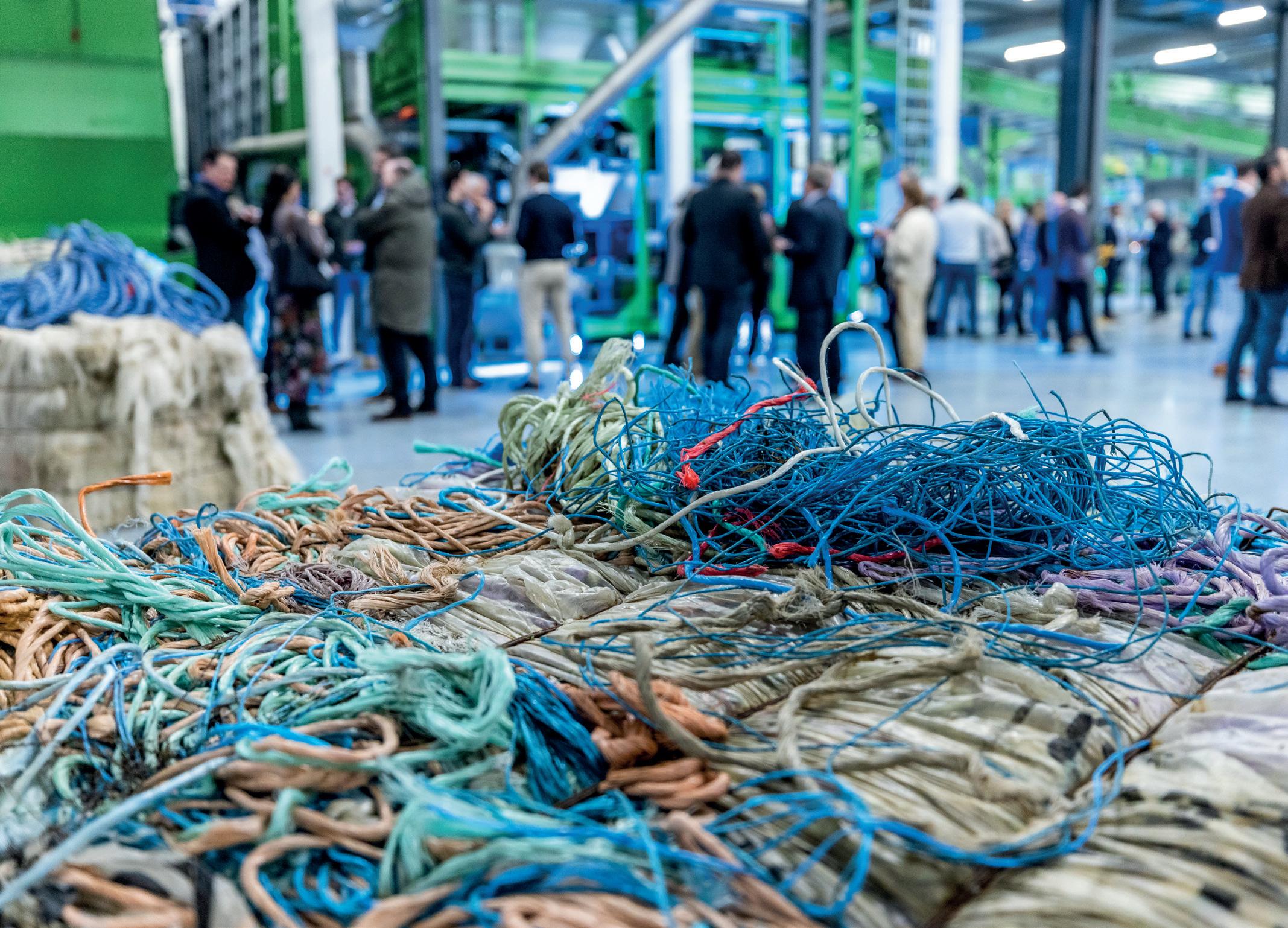
» The specified requirement was to achieve the filtration fineness necessary for a closedloop fibre-to-fibre application, because the Healix recycled pellets needed to be fed back into the production of baler twines, nets and ropes.
Robert Wahlmüller
Application Sales Manager, EREMA
Wahlmüller, the Sales Manager at EREMA who works closely together with Healix. The material tests for Healix were carried out at EREMA's customer centre in Austria and at EREMA’s customer Clean Plastic Finland. The tests demonstrated that with its 3-fold degassing the INTAREMA® TVEplus®
is the best machine for handling the high moisture levels of up to 10 percent and the low bulk density that the material has after washing.
"We also tested different systems and combinations with regard to filtration performance. The specified requirement was to achieve the filtration fineness necessary for a closed-loop fibre-to-fibre application, because the Healix recycled pellets needed to be fed back into the production of baler twines, nets and ropes," says Wahlmüller. The double filtration system consisting of an EREMA laser filter with a filtration fineness of 70 to 90 µm and an EREMA SW RTF ® backflush filter with a filtration unit of 60 µm, through which the melt flows prior to hot die-face pelletising, produced impressive results.
"If we could feed this straight back into fibre production, the loop would really be closed,
but we're not quite there yet," says Marcel Alberts. Depending on the input stream, the recycled pellets are currently also used in open-loop applications such as fibre to film or injection moulding.
During the installation and commissioning of the recycling machine and the training of the Healix employees, EREMA was supported by colleagues from EREMA's Belgian sales agency Plastics Machinery Agency (PMA). This team will also assist with further process optimisation.
Following the start of full-scale recycled pellet production a few weeks earlier, Marcel Alberts and his team were finally able to celebrate the official opening (postponed several times due to corona) of the new company in March 2022, together with Frans Timmermans, Vice President of the European Commission and who, as Commissioner, was responsible for the European Green Deal.
> EVEN DAMP MATERIALS UNDER CONTROL <
The Serbian company Brzan Plast recycles heavily contaminated, damp film collected from household waste to produce new film for the construction industry
Dejan Simic, owner of the Serbian plastic waste processor Brzan Plast d.o.o., is thrilled with the recycled pellets produced by his company since July 2022 using the new INTAREMA® TVEplus® technology from EREMA. "The quality is simply perfect!"
Brzn Plast processes LDPE and LLDPE film collected from household waste in the Balkan countries. The recycled pellets are used 100 percent in the company's own blown film line for the production of PE film. The majority
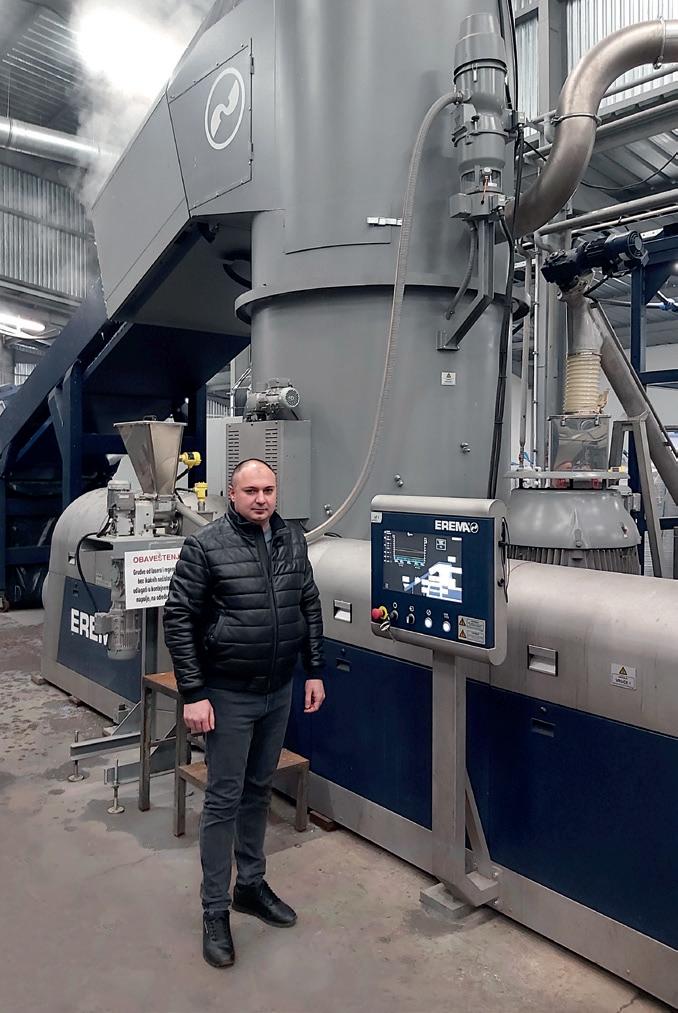
of their customers are in the construction industry.
Brzn Plast processes exclusively post consumer film waste. "We don't consider this to be waste, but raw material which we can use again to make high quality products, so it doesn't need to end up in landfill or being incinerated," says Dejan Simic. "Of course that only works with the right technology, which we found in terms of extrusion at EREMA." The technology in question is the patented INTAREMA® 1714 TVEplus ®
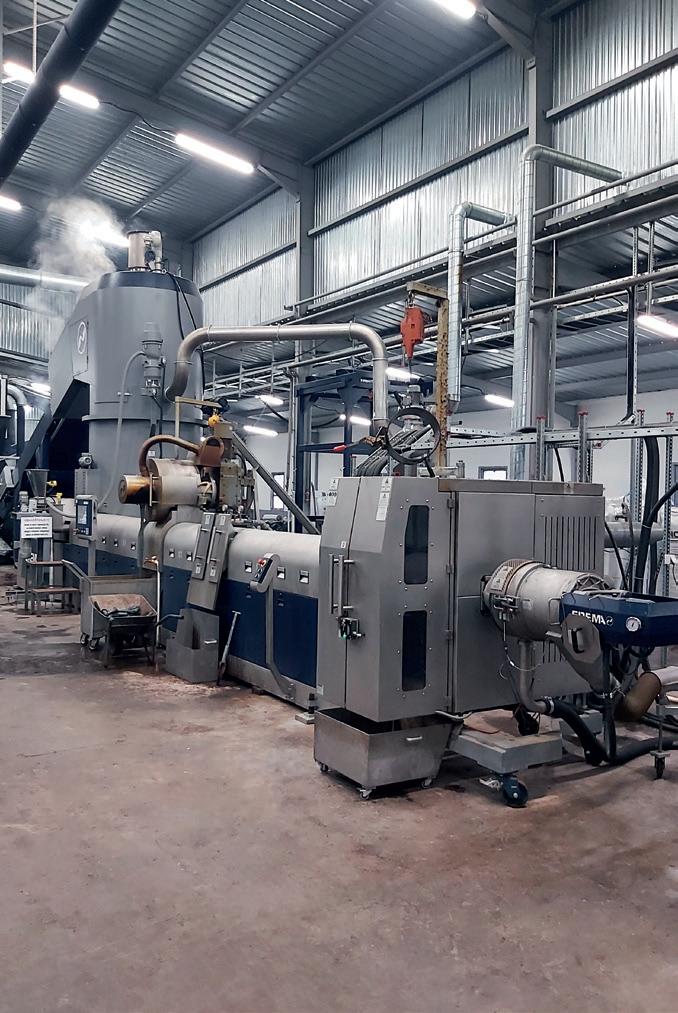
extruder system with double filtration, which is in a class of its own when it comes to recycling heavily contaminated, damp material that would otherwise be difficult to process.
The input stream that Brzn Plast recycles following automatic sorting and washing, has a moisture content of up to ten percent. Due to the effectiveness of the drying in the preconditioning unit, where the material is crushed, mixed, heated, dried and precompressed, there is no need to add so-called moisture catchers and the throughput can be maintained at a constant 1,500 kilograms per hour. That is one of several cost saving factors.
Another, which is even more significant, is the drastically reduced energy consumption compared to operating their old recycling machinery. Simic says that energy savings are around 20 to 25 percent. And finally, the top quality of the recycled pellets also saves costs because they can be processed so smoothly in the blown film line that five percent less production waste is now generated during film production. Film is produced in thicknesses of 35 to 500 µm and most of their products are supplied to the construction industry.
> PIONEER FAERCH USES VACUREMA ® TECHNOLOGY TO PRODUCE 100 PERCENT RPET TRAYS <
"From niche to must-have." That describes how plastics recycling has evolved in recent years. Faerch also contributed to this. As a plastic packaging manufacturer and EREMA customer in Denmark, Faerch is the first company in the world to successfully integrate the recycling of european post-consumer PET household pots, tubs and tray packaging into its own production process.
Faerch is recognised as a leading manufacturer of food packaging, largely made from PET thermoforming film. Referred to as trays, they are well suited to many applications, especially in the food sector, where food safety, shelf life and a clear view of the packaged product are needed. Faerch produces trays for ready meals, fresh meat, takeaway meals and packaging
for dairy products a several of its locations in Europe. They supply well-known food producers and trading companies around the world. The packaging must meet the highest quality standards for direct contact with food, and must meet special functional criteria, such as for transporting liquid food and when food is frozen or heated up in it.
The trays Faerch produces are fully recyclable and, depending on the PET type (CPET, MAPET or APET), are made of up to 100 percent recycled post-consumer PET (rPET). That is why Faerch is considered a pioneer in tray-to-tray recycling, also due to its cooperation with EREMA. This is because in comparison to bottle-to-bottle
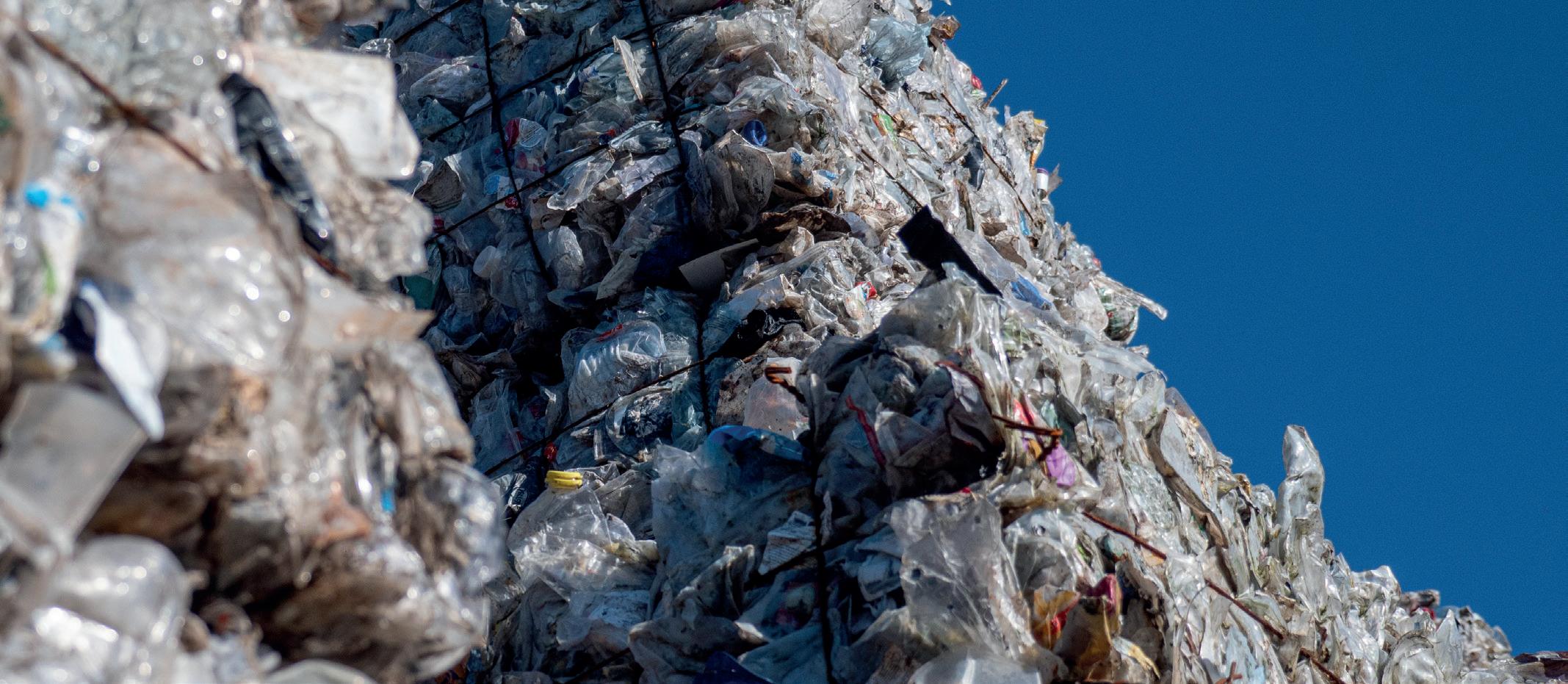
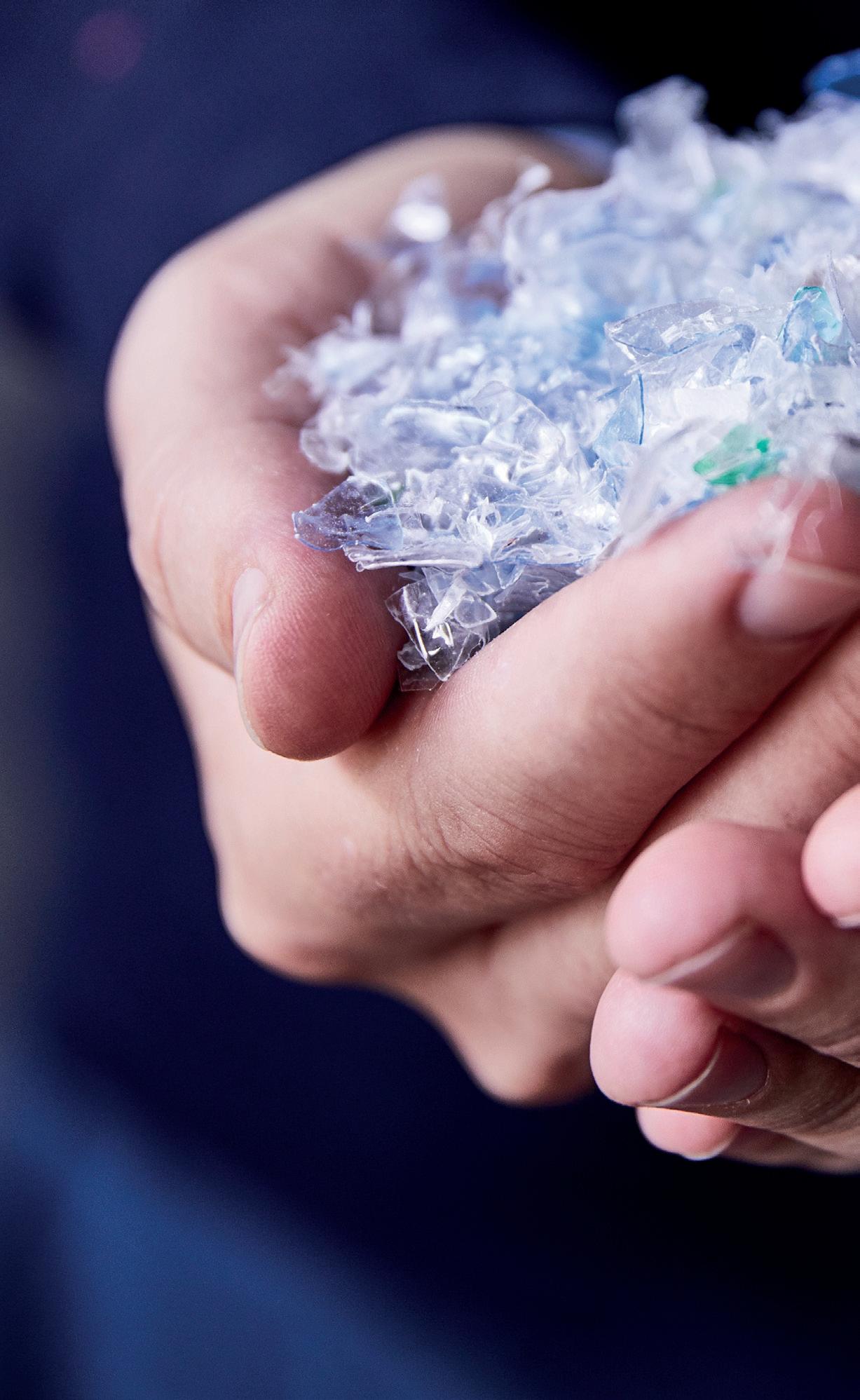
with purpose-specific modification of our flexible VACUREMA® technology, tray-totray recycling could become just as much of a success story. Faerch was our first customer to be as convinced of this as we were,"
says Christoph Wöss, Business Development Manager at EREMA Group GmbH.
At Faerch's own recycling plant "CIRREC" (formerly "4PET") in the Netherlands, PET bales obtained from collection and sorting companies throughout Europe are sorted, washed and recycled. Both post-consumer rPET flakes and pellets are supplied to PET packaging on an industrial scale and turning them back into new trays," explains Thomas Bak Thellesen, Senior Director Group Sustainability & External Affairs. He backs up this statement with some impressive
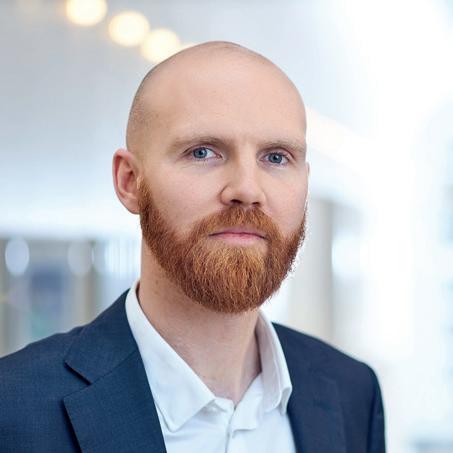
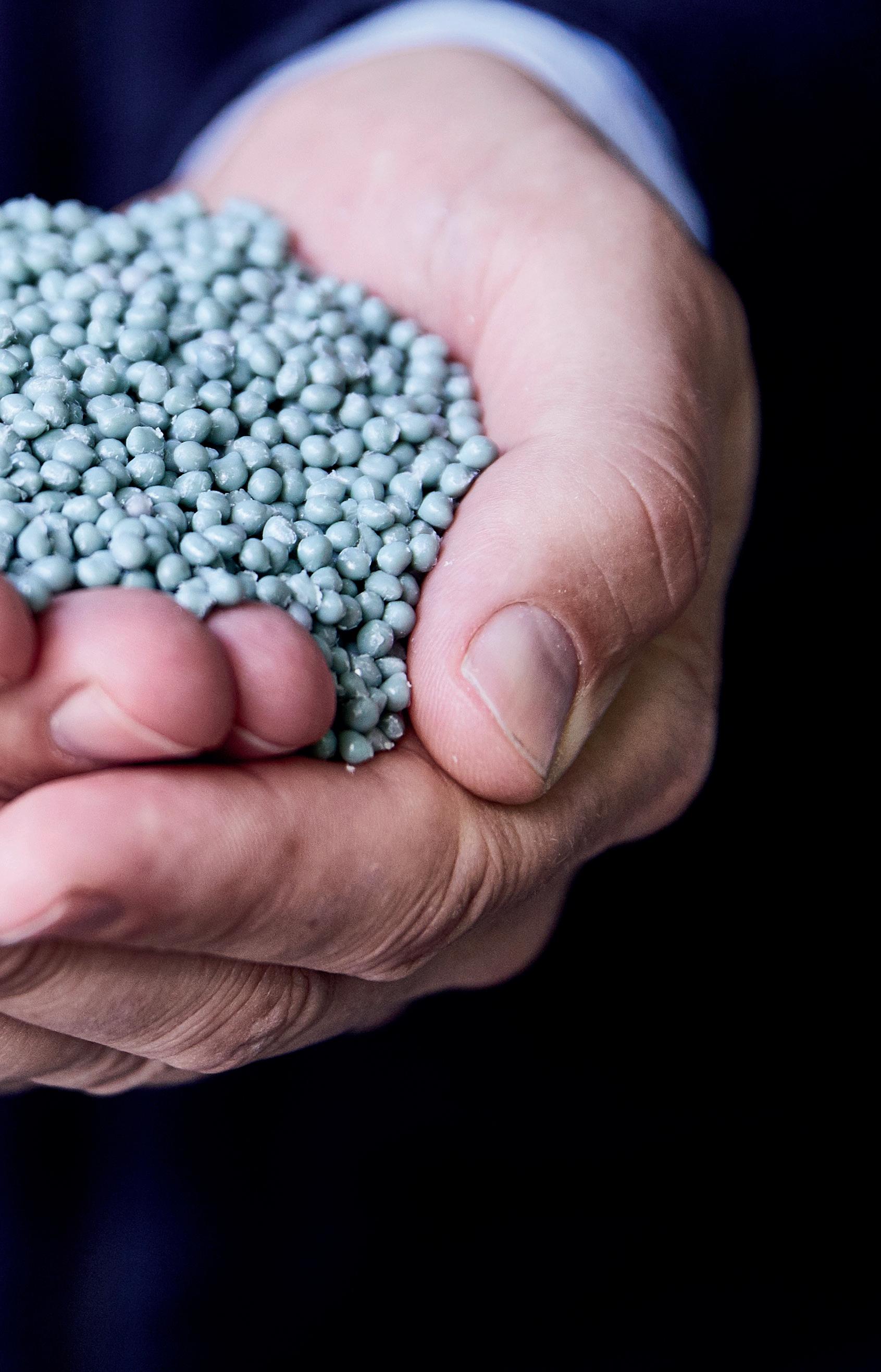
» Quality and sustainability must go hand in hand for us, because this is the only way we can offer our customers circular packaging solutions and drive the change necessary to establish an infrastructure needed to achieve a real circular economy.
Thomas Bak Thellesen Senior Director Group Sustainability & External Affairs
» Trays from all over Europe are recycled to make 1.2 billion PCR PET trays per year.
Thomas Bak Thellesen Senior Director Group Sustainability & External Affairs
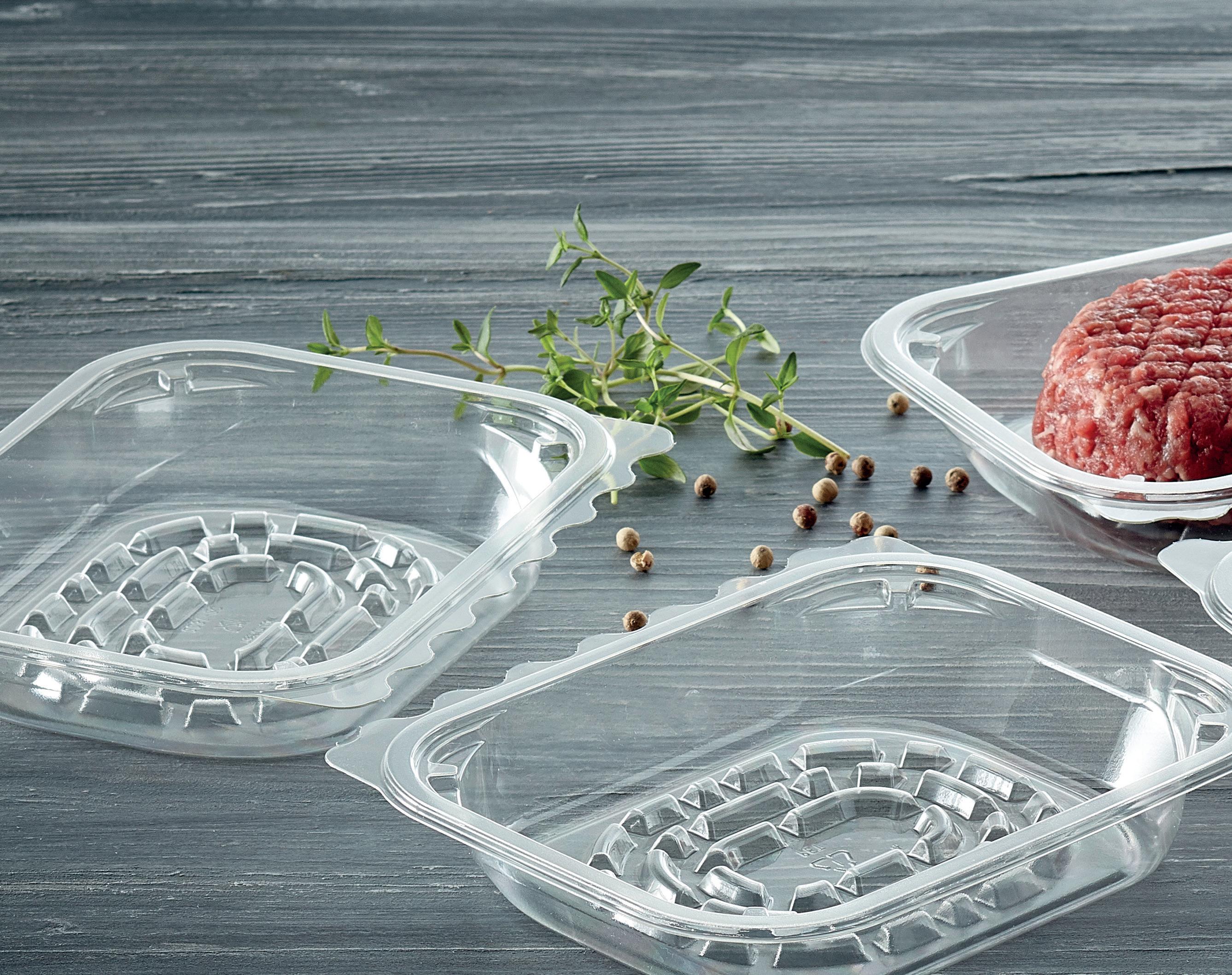
figures: Trays from all over Europe are recycled to make 1.2 billion PCR PET trays per year. The aim is to quadruple the recycling capacity within the coming years. "Without any compromises in terms of food contact compliance and functional properties," as Bak Thellesen emphasises: "Quality and sustainability must go hand in hand for us, because this is the only way we can offer our customers circular packaging solutions and drive the change necessary to establish an infrastructure needed to achieve a real circular economy." To get the PET waste it needs, Faerch offers its own buyback models to customers who are able to collect the
packaging again after use, such as airlines and catering companies. "For our production, this waste is a valuable raw material that we know is of the right quality."
Faerch has been relying on the VACUREMA® system with SafeFlake technology from Austrian recycling machine manufacturer EREMA for the recycling process for the trays since mid 2018. The special feature of this set-up is that decontamination, drying and IV treatment already take place on the flake in the vacuum reactor. Only then is
the material fed into the extruder. This prevents hydrolytic and oxidative degradation of the melt in the extruder, which in turn is a prerequisite for highly clean, food contact compliant rPET trays with the best IV and colour values. The quality of the rPET pellets remains consistently high even if the parameters of the input material – such as moisture, mixture or bulk density – vary. In addition to these quality aspects, the financial arguments also clearly speak in favour of this recycling process. This is because both the total costs of acquisition and use (total costs of ownership) and the energy consumption are comparatively low. "The specific overall
1 Source: SKZ – Das Kunststoff-Zentrum, value measured at a throughput of 1650 kg/h, excluding customer's chiller for supplying cooling water.
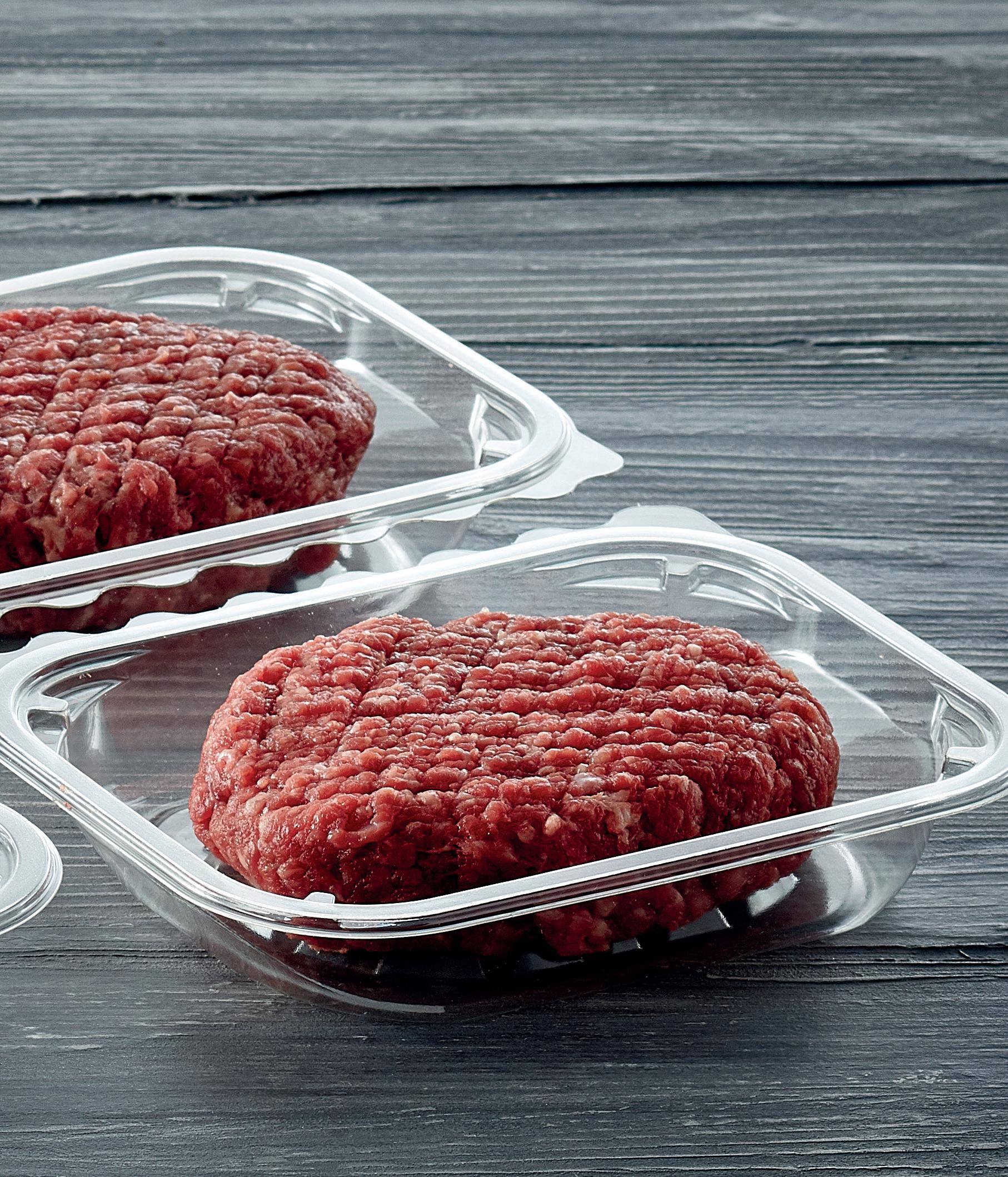
energy consumption of a VACUREMA® Prime system is only 0.295kWh/kg. This is one of the best energy efficiency values1 compared to conventional PET processing lines on the market," says Christoph Wöss. Plastic packaging plays an important role in the protection and shelf life of food. Sustainable, circular economy solutions can significantly reduce greenhouse gas emissions and food waste. Faerch's trayto-tray recycling solution shows how the circular economy can work. EREMA is convinced that many will follow this example in the near future. This is because, unlike just a few years ago, there is now a broad consensus that the circular economy – and therefore recycling – has an important role to play in the transformation into a climateneutral, resource-efficient and competitive industry.
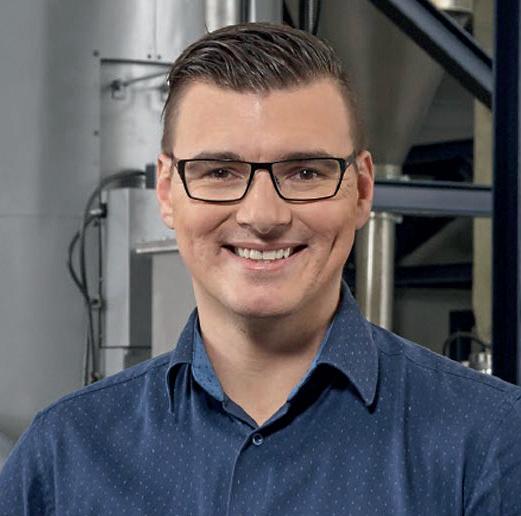
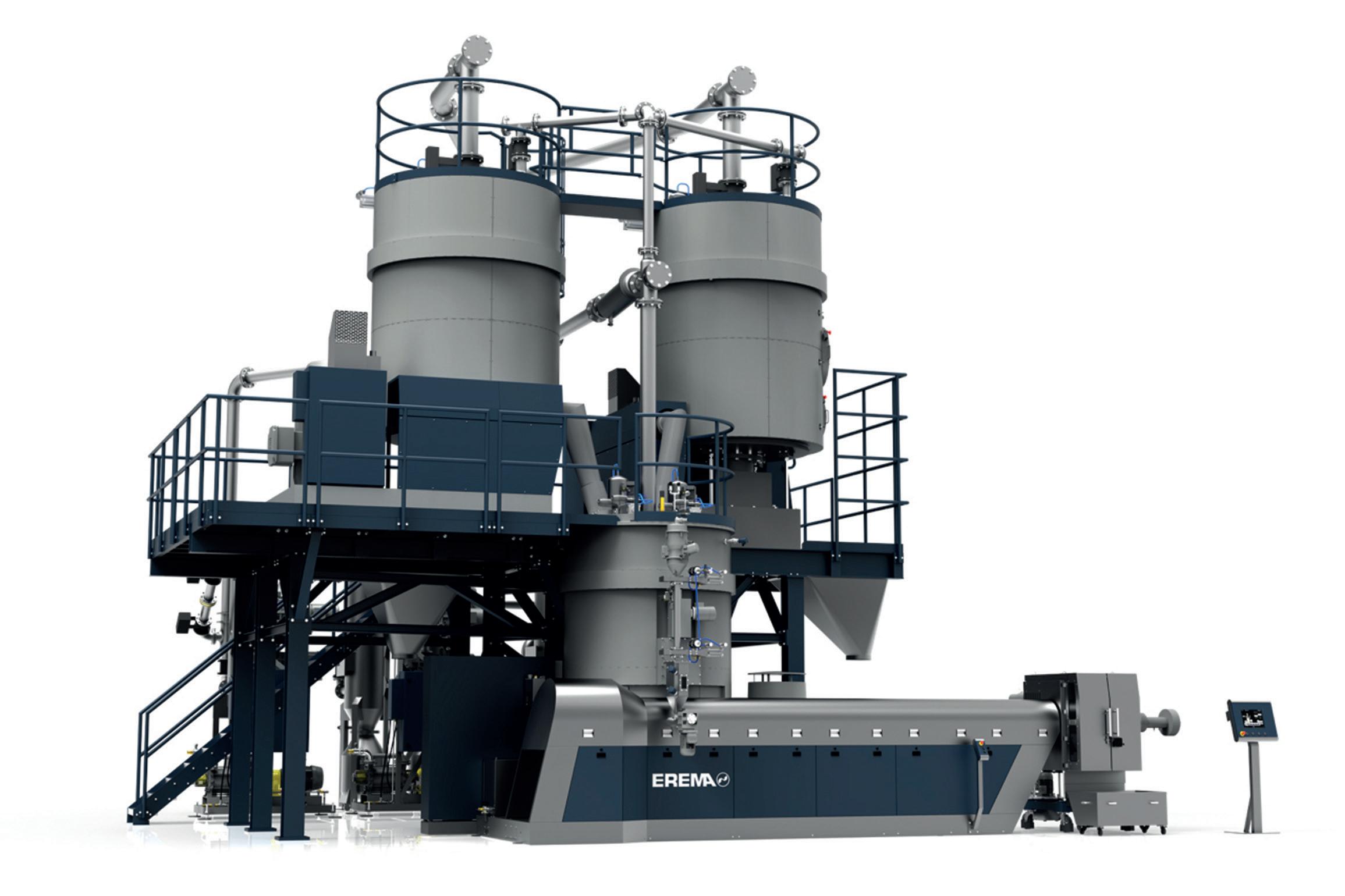
» The specific overall energy consumption of a VACUREMA® Prime system is only 0.295kWh/kg. This is one of the best energy efficiency values.
Christoph Wöss Business Development Manager
in der EREMA Group
GmbH
> EXTRUPET AGAIN CHOOSES PET RECYCLING TECHNOLOGY FROM EREMA <
Extrupet is one of the largest and most advanced recyclers of PET bottle materials on the African continent. The company, which was founded in 2000 and is based in Wadeville, Johannesburg, added a VACUNITE® 2318T – 1500M to its machinery in December 2024. The state-of-the-art plant at the Cape Town branch now produces 14,500 tons of rPET per year – to the complete satisfaction of Extrupet and its customers.
EREMA’s VACUREMA® technology. The relationship with the Group however, goes back even further to the 1990s when the first conventional extruders were supplied.
xtrupet specialises in most aspects of the PET recycling loop: from turning waste PET bottles into PET flakes to converting them into fibre, thermoforming and food-grade and strapping-grade material. The partnership with EREMA dates as far back as 2009, when Extrupet bought their offering on the new VACUNITE® system met our requirements."
» Our long-standing relationship with EREMA and their offering on the new VACUNITE ® system met our requirements.
Chandru Wadhwani
Joint Managing Director, Extrupet
"The expansion of Extrupet's existing South African branch in Cape Town was driven by the need to meet the growing demand for our PhoenixPET® recyclate," says Chandru Wadhwani, Joint Managing Director at Extrupet. "Given the superior quality of resin we currently supply the market it was imperative that the technology chosen not only maintained our current standards, but also offered the opportunity to make improvements. Our long-standing relationship with EREMA and
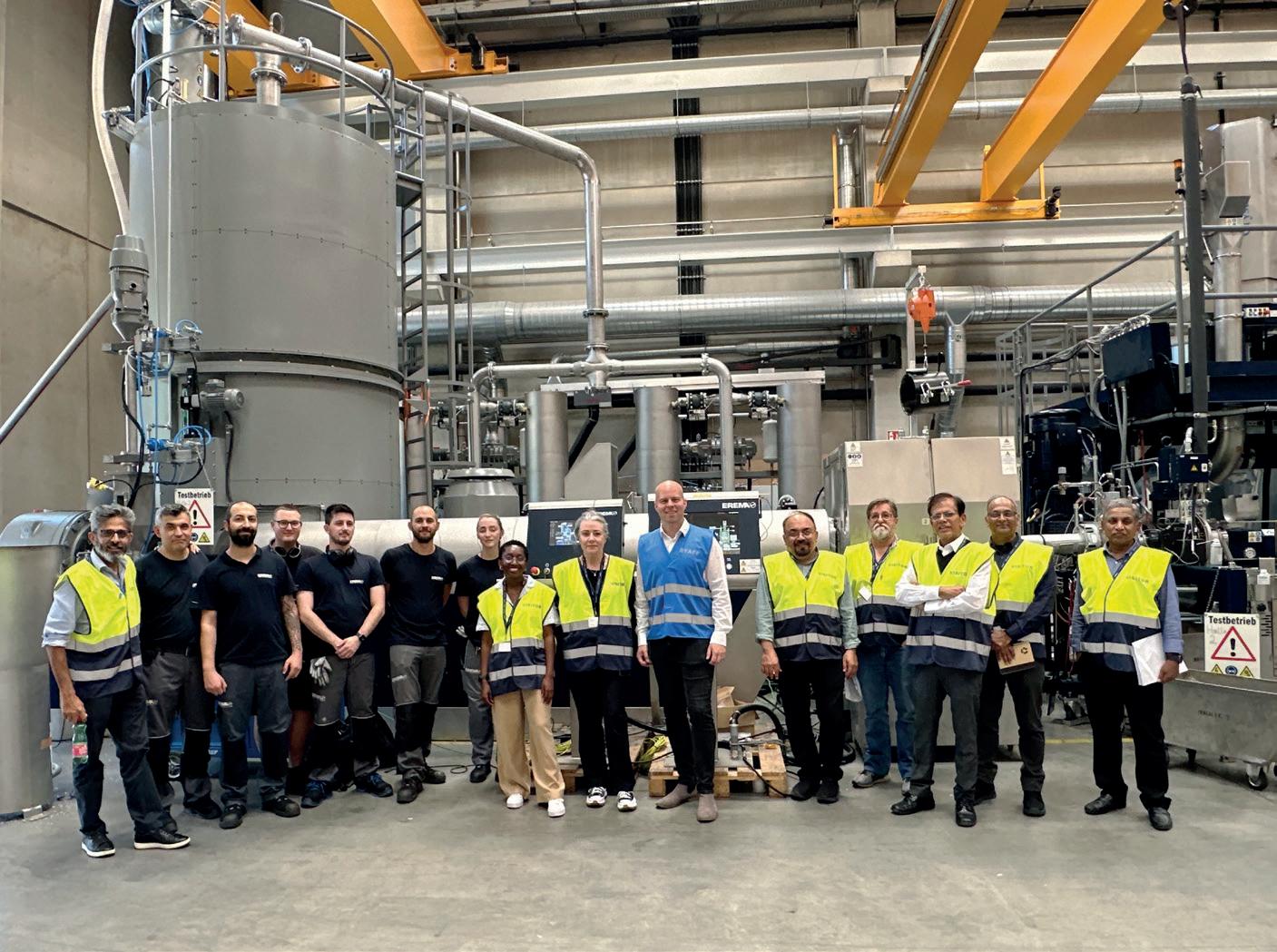
"As Extrupet’s footprint is set to grow across the continent, it was also important to partner with a technology partner that had a similar geographical footprint to align with our ambitions" says Ravi Chanrai, Group Director of the Extrupet Group.
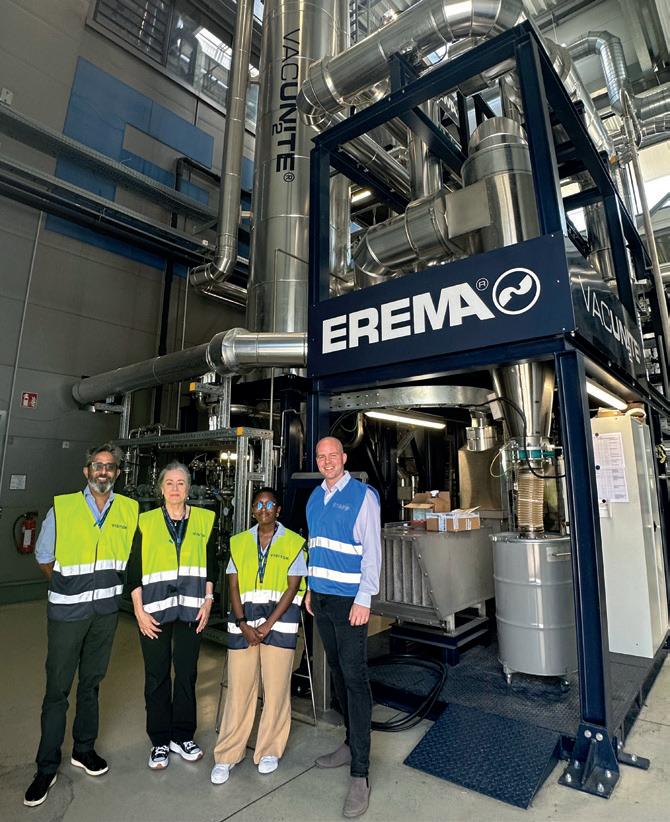
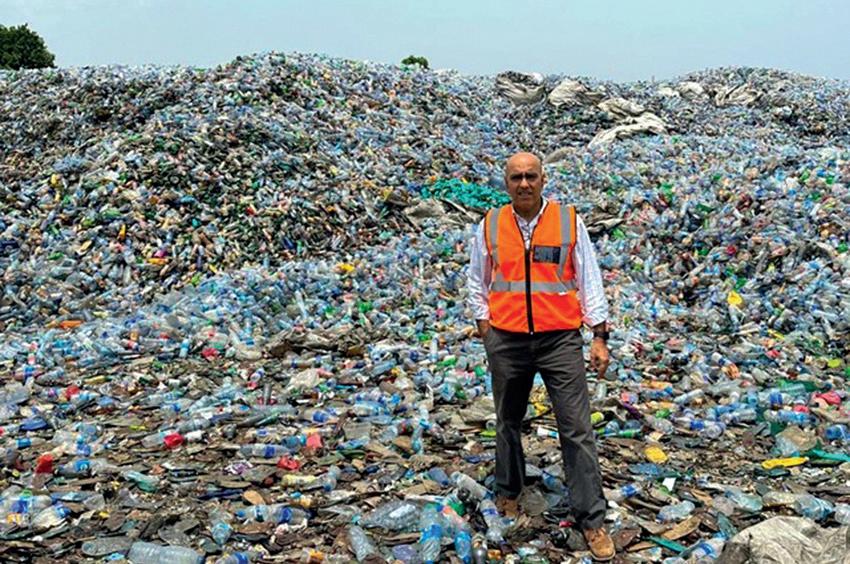
> MURA TECHNOLOGY IN THE UK SELECTS CHEMAREMA ® EXTRUDERS < Best Practice Chemical Recycling
Chemical recycling is a growing sector in the circular economy of plastics, whereby plastic waste is broken down to a molecular level for manufacture into new plastics and other products. This allows for a wider range of mixed plastic waste to be recycled than would be possible with mechanical recycling alone.
ura Technology, a world leader in chemical recycling, developed the unique HydroPRS™ technology. This is a market-first process to convert waste plastics into recycled hydrocarbon products for use in the manufacture of
new plastics and other petrochemical products. The use of supercritical water makes HydroPRS™ inherently scalable. Mura will commence commercial operations at this first site, ReNew ELP, in Teesside, England, in 2024.
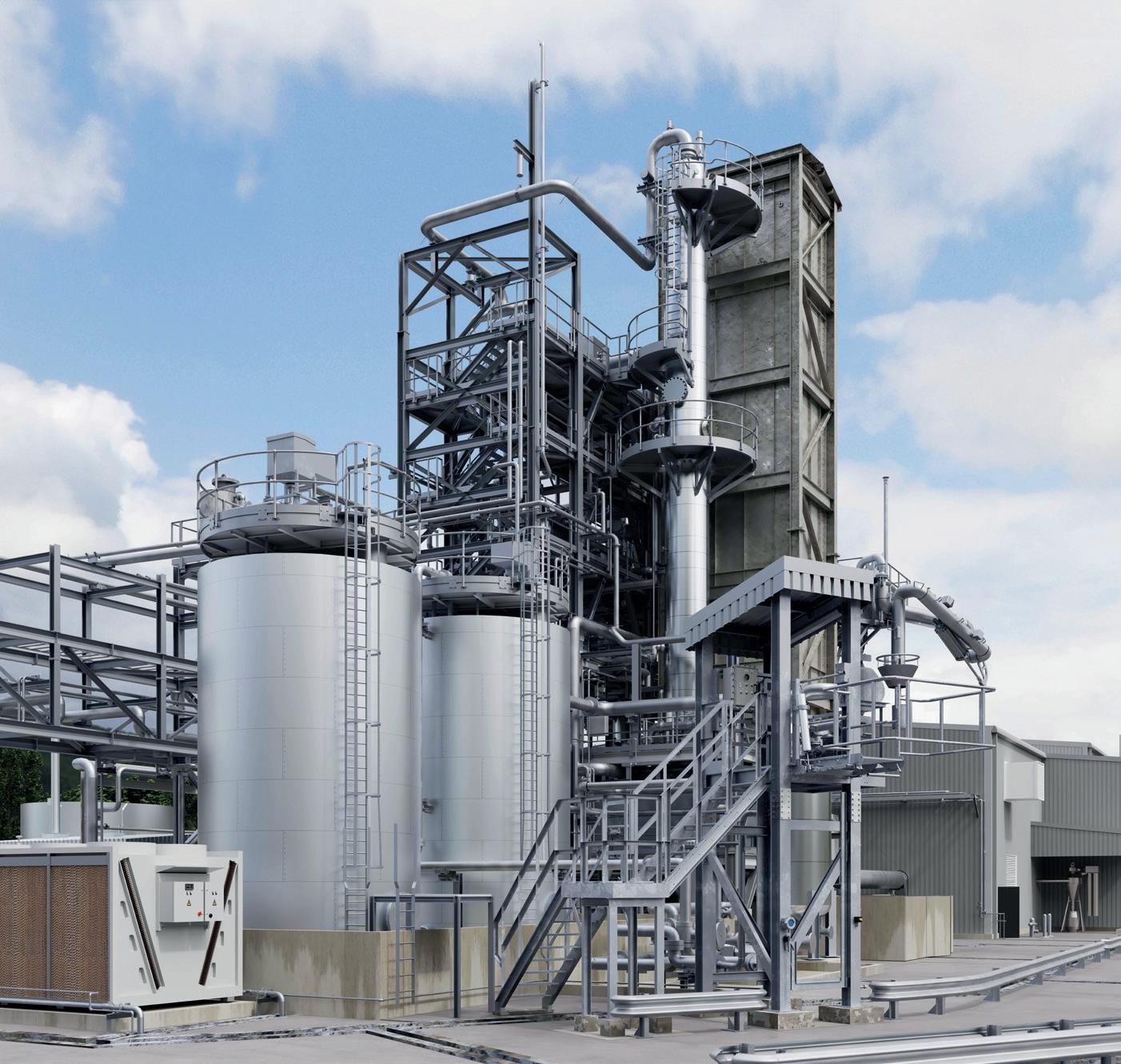
Mura has selected EREMA with its CHEMAREMA® single-screw extrusionbased raw material preparation technology, allowing for robust and energy-efficient material input into the chemical recycling process at scale. EREMA has an unmatched global track record for post-consumer plastic recycling technology.
CHEMAREMA : SINGLE-SCREW MATERIAL PREPARATION
The CHEMAREMA® quickly transforms difficult-to-handle, post-consumer mixed plastic waste into well-defined melt streams for direct transfer into the chemical recycling reactor. The patented Counter Current preconditioning unit enables the feeding of heterogenous, moist, contaminated and low bulk density feeds in a reliable and energy-efficient way.
Another important benefit of the CHEMAREMA ® single-screw extrusion for Mura’s HydroPRS™ technology is its capability to provide high-temperature melt streams at pressures of up to 300 bar without the additional use of a melt pump. The CHEMAREMA® line of machinery is available at throughputs of up to 4500 kg per hour.
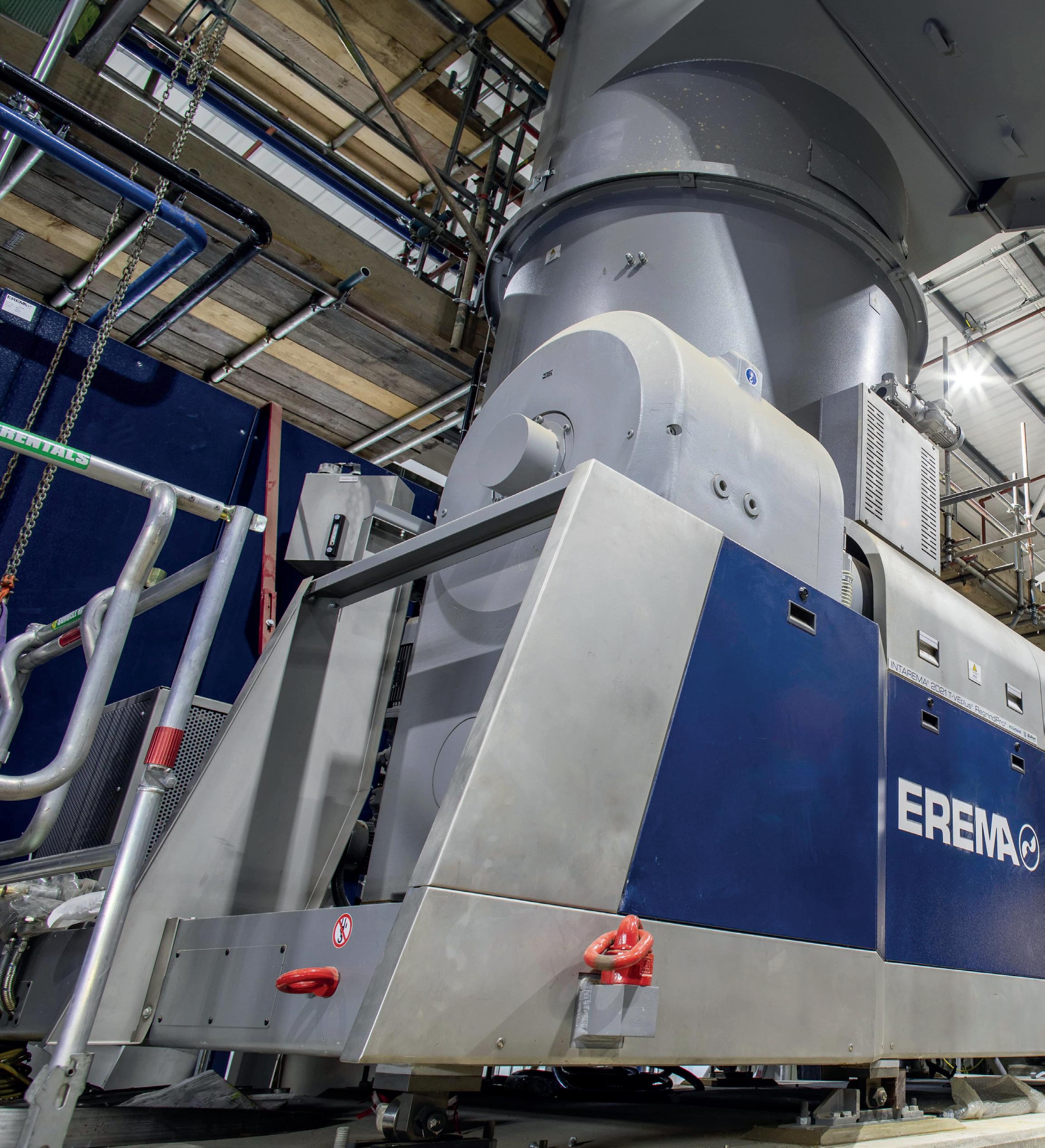
"Working with EREMA offers the Teesside HydroPRS™ site the technologies and services that enable us to recycle plastics that would otherwise be sent to incineration. EREMA brings valuable experience when dealing with difficult-to-handle post-consumer feedstocks. The CHEMAREMA® extruder system will feed our first plant with over 20.000 tonnes per
year, providing pressures of up to 300 bar at high melt temperatures. We are now developing additional projects in Germany and the USA, whilst EREMA continue to support some of our HydroPRS™ licence holders", says Richard Daley, Chief Technology Officer.
"By working together with MURA Technology we created a thorough understanding for the
needs of chemical recyclers. This allows us to drive our development further, enabling our customers to work with lowest quality mixed plastic waste. This is our contribution to establishing chemical recycling as a complementary technology stream to mechanical recycling, focusing on those feedstocks that would otherwise not be recycled." Klaus
» This is our contribution to establishing chemical recycling as a complementary technology stream to mechanical recycling, focusing on those feedstocks that would otherwise not be recycled.
Klaus Lederer
Business Development Manager Chemical Recycling, EREMA Group
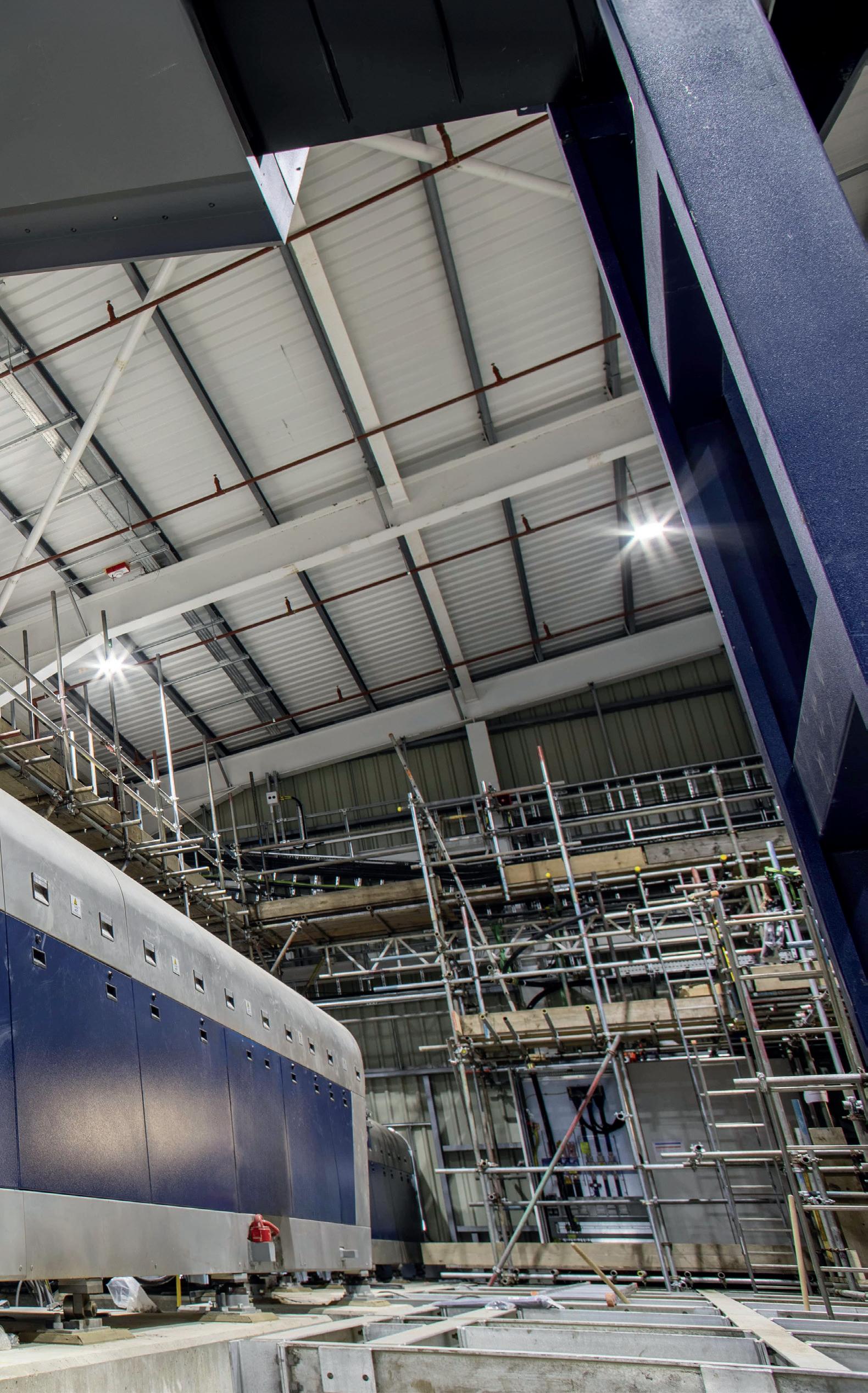
Lederer, Business Development Manager Chemical Recycling at EREMA Group.
EREMA is continuously developing its offering based on the growing understanding of the needs of chemical recyclers
and contributes to the transformation of the recycling industry. Mura Technology will continue to roll out their HydroPRS™ technology supported by EREMA and the CHEMAREMA® line of machinery. Together they are making a substantial contribution to the recycling industry’s move towards a circular economy.
THE FEATURES AND ADVANTAGES OF THE SELECTED CHEMAREMA ® SETUP ARE:
Quickly melts input streams by shear and friction for chemical recycling in one single heat.
Saves 40% energy during the mechanical preparation of the input stream compared to a conventional workflow (agglomeration + conventional extrusion).
Provides highest feedstock flexibility (films, flakes, agglomerates, rigids, regrind, fibre).
Maximum robustness of single-screw extrusion when it comes to highly abrasive post-consumer plastic feedstocks. Removal of residual air

» EREMA brings valuable experience when dealing with difficult-to-handle post-consumer feedstocks. The CHEMAREMA® extruder system will feed our first plant with over 20.000 tonnes per year, providing pressures of up to 300 bar at high melt temperatures.
Richard Daley Chief Technology Officer
COST-EFFECTIVE AND IMMEDIATELY AVAILABLE RECYCLING MACHINE
The ReadyMac celebrated its market launch at the EREMA Group booth at K 2022. The standardised plastic recycling machine with its particularly attractive priceperformance ratio has since established itself successfully in the 50 hertz version, particularly on the European market. the machine, which is produced in stock and therefore available at short notice, is now also offered in a 60 hertz version. "The expansion of the offering allows customers to benefit from this attractive overall package worldwide," emphasises Michael Köhnhofer, the person responsible for ReadyMac in the EREMA Group. "The ReadyMac is suitable for a wide range of materials and degrees of contamination, processing film, flakes and regrind into high-quality recycled pellets.
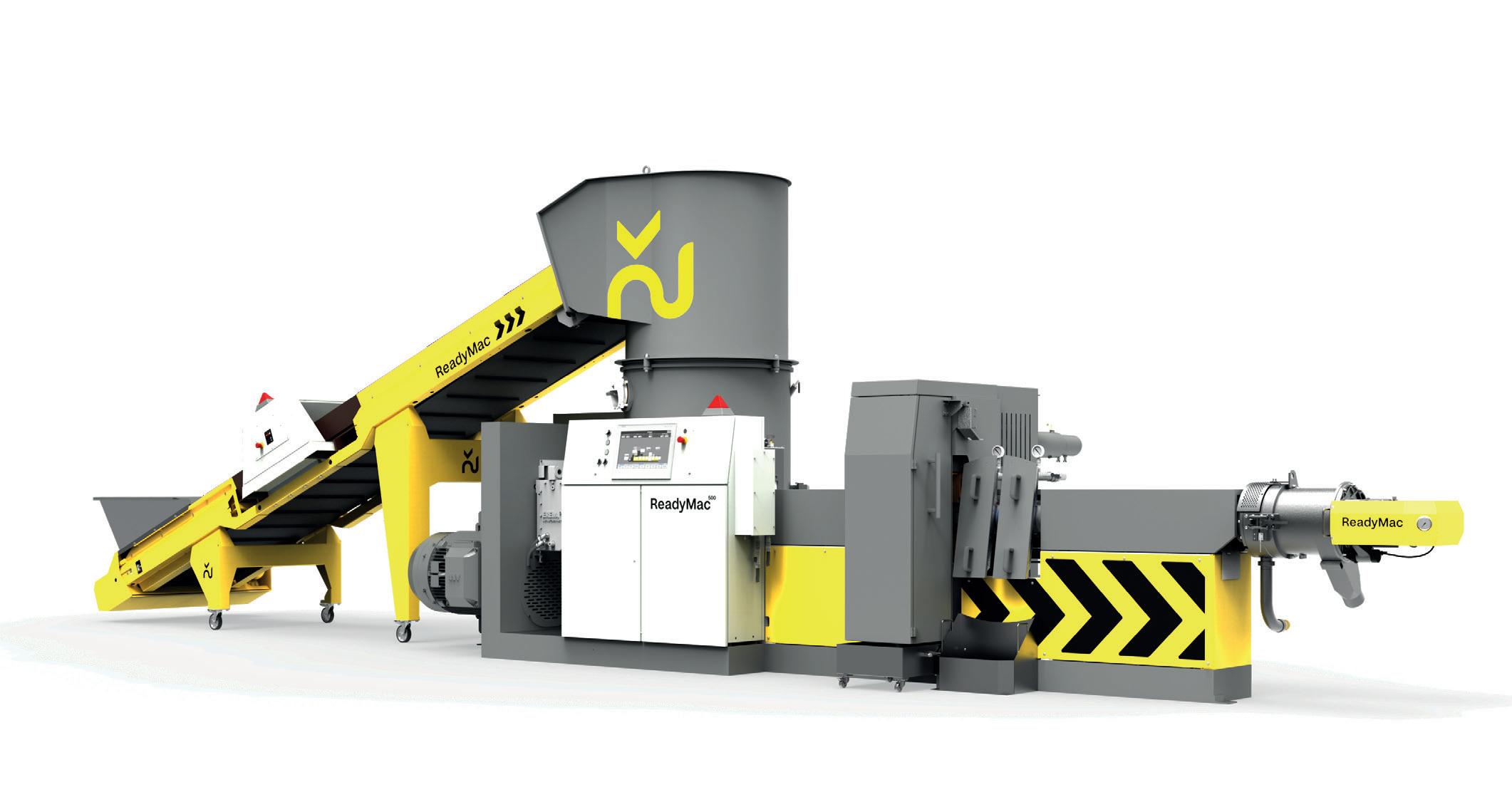
The fixed price of just EUR 375,000 makes it an attractive proposition." The ReadyMac is based on EREMA's proven TVE technology, in which degassing occurs after filtration. Equipped with a robust SW RTF ® screen changer filtration system, the recycling machine processes both printed and contaminated waste. The multipurpose screw handles a wide range of materials efficiently and reliably. Customers benefit from a robust and durable machine, as well as first-class EREMA service.
The ReadyMac 500 is a cost-effective, universally applicable plastics recycling system in a standardised design and is now also available for a mains frequency of 60 hertz.
PURE LOOP: POLYESTER TEXTILE PROJECT WINS
Project Re:Claim, a joint venture between the Salvation Army Trading Company and Project Plan B, was honoured with the Plastics Industry Awards 2024 in the "Recycler of the Year" category. Using an ISEC evo system from PURE LOOP to process used garments and other textiles, the project is Europe’s first polyester textile recycling system.
Commissioning and training are carried out to the usual high standard, and spare parts are available quickly. In addition, the competent support team is on hand worldwide. The machine layout, utility list and quotation of the ReadyMac machine can be accessed easily on the new website.
www.ready-mac.com
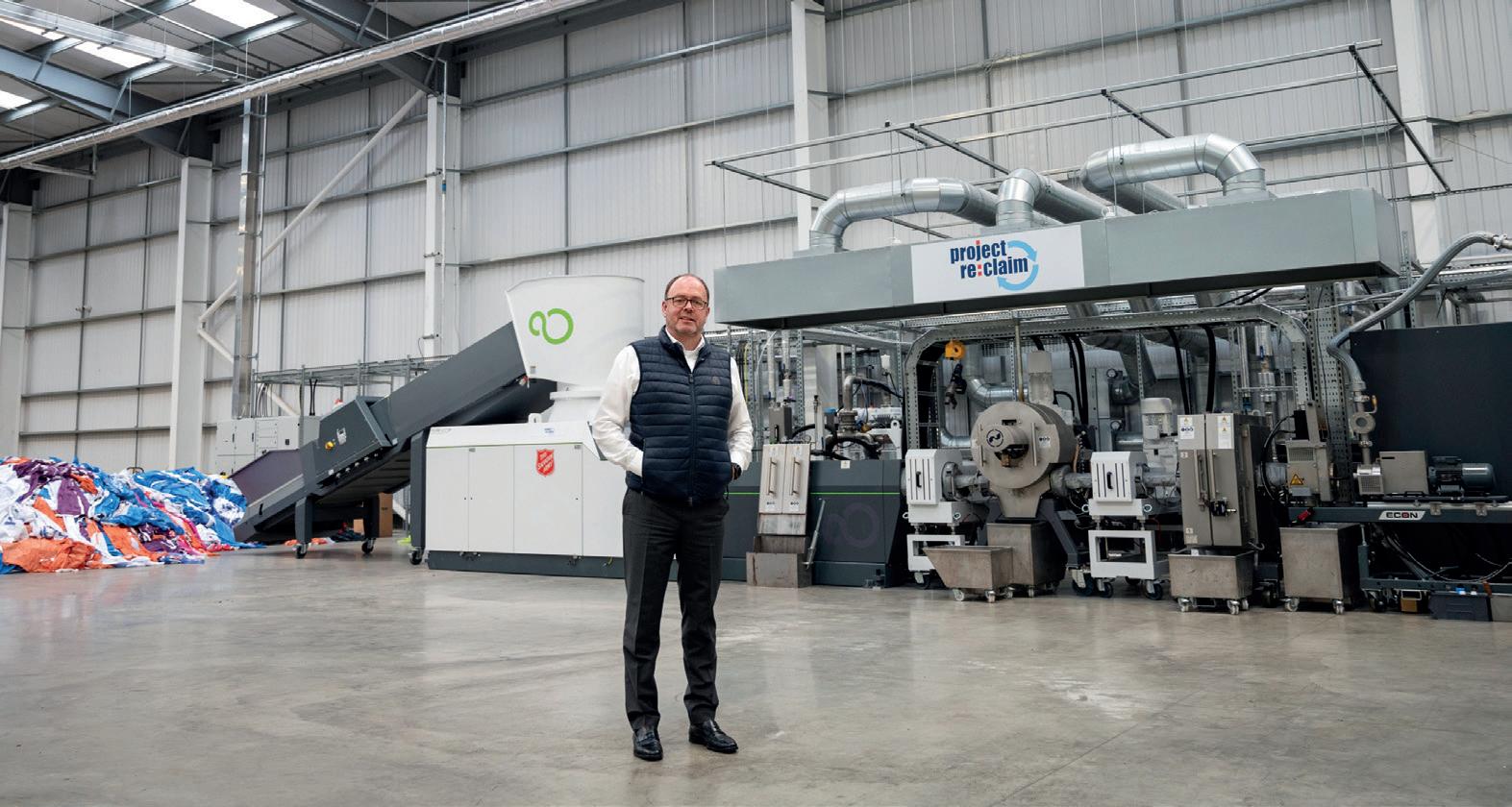
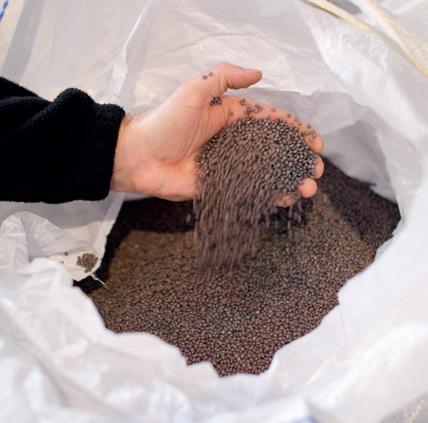
erema.com/bottlesforever
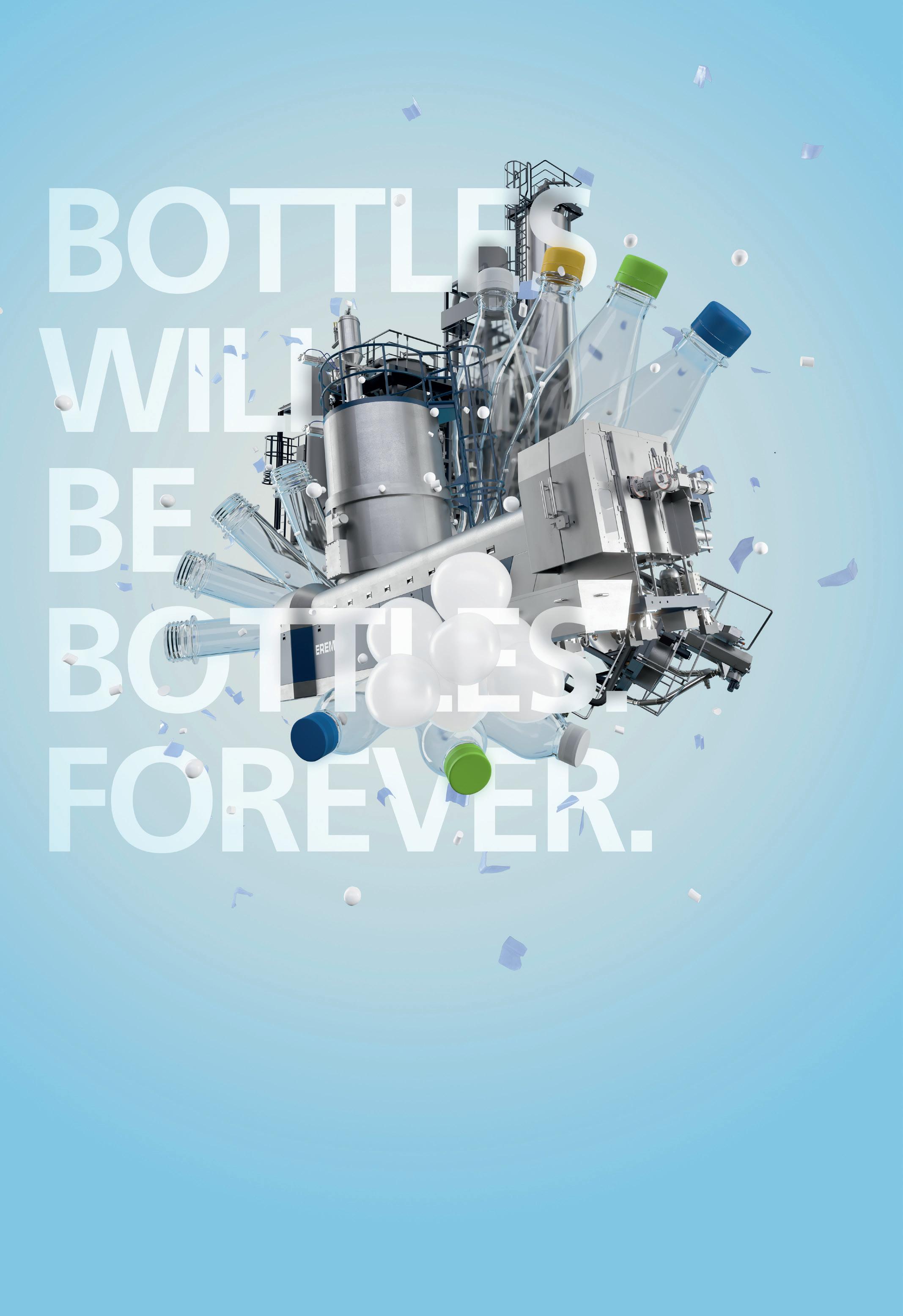
New product contains up to 100 % rPET. Turn your PET flakes into recycled pellets or turn them directly into preforms: EREMA bottle-tobottle systems stand for uncompromising food contact compliance with all the advantages of unique SafeFlake technology. Rely on highly effective decontamination, high-performance filtration, safe handling and the highest energy efficiency. For the best quality end product. Consistent quality even if the input material changes. It’s how you keep driving the bottle cycle forward sustainably. Cost effective, safe and environmentally friendly.